The Project Gutenberg EBook of Fifty Years Ago, by Walter Besant Produced by Chris Curnow, Charlie Howard, and the Online Distributed Proofreading Team at http://www.pgdp.net (This file was produced from images generously made available by The Internet Archive)
Transcriber’s Note:
Text on cover added by Transcriber and placed in the Public Domain.
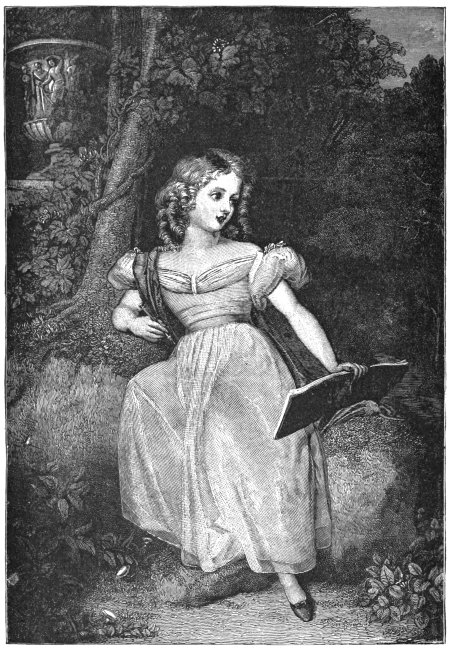
THE PRINCESS VICTORIA IN 1830
(From the Picture by Richard Westall, R.A., at Windsor Castle.)
FIFTY YEARS AGO
BY
WALTER BESANT
AUTHOR OF ‘ALL SORTS AND CONDITIONS OF MEN’ ETC.
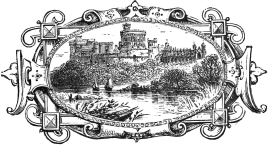
PROFUSELY ILLUSTRATED
NEW YORK
HARPER & BROTHERS, FRANKLIN SQUARE
By WALTER BESANT.
ALL IN A GARDEN FAIR. 4to, Paper, 20 cents.
DOROTHY FORSTER. 4to, Paper, 20 cents.
FIFTY YEARS AGO. 8vo, Cloth. (Just Published.)
HERR PAULUS. 8vo, Paper, 35 cents.
KATHERINE REGINA. 4to, Paper, 15 cents.
LIFE OF COLIGNY. 32mo, Paper, 25 cents.
SELF OR BEARER. 4to, Paper, 15 cts.
THE WORLD WENT VERY WELL THEN. Illustrated. 4to, Paper, 25 cents.
THE CHILDREN OF GIBEON. 4to, Paper, 20 cents.
THE HOLY ROSE. 4to, Paper, 20 cents.
TO CALL HER MINE. Illustrated. 4to, Paper, 20 cents.
UNCLE JACK AND OTHER STORIES. 12mo, Paper, 25 cents.
By WALTER BESANT AND JAMES RICE.
ALL SORTS AND CONDITIONS OF MEN. 4to, Paper, 20 cents.
BY CELIA’S ARBOR. Illustrated. 8vo, Paper, 50 cents.
SHEPHERDS ALL AND MAIDENS FAIR. 32mo, Paper, 25 cents.
“SO THEY WERE MARRIED.” Illustrated. 4to, Paper, 20 cents.
SWEET NELLY, MY HEART’S DELIGHT. 4to, Paper, 10 cents.
THE CHAPLAIN OF THE FLEET. 4to, Paper, 20 cents.
THE CAPTAIN’S ROOM. 4to, Paper, 10 cents.
THE GOLDEN BUTTERFLY. 8vo, Paper, 40 cents.
’TWAS IN TRAFALGAR’S BAY. 32mo, Paper, 20 cents.
WHEN THE SHIP COMES HOME. 32mo, Paper, 25 cents.
Published by HARPER & BROTHERS, New York.
☛ Any of the above works will be sent by mail, postage prepaid, to any part of the United States or Canada, on receipt of the price.
v
PREFACE.
It has been my desire in the following pages to present a picture of society in this country as it was when the Queen ascended the throne. The book is an enlargement of a paper originally contributed to ‘The Graphic.’ I have written several additional chapters, and have revised all the rest. The chapter on Law and Justice has been written for this volume by my friend Mr. W. Morris Colles, of the Inner Temple. I beg to record my best thanks to that gentleman for his important contribution.
I have not seen in any of the literature called forth by the happy event of last year any books or papers which cover the exact ground of this compilation. There are histories of progress and advancement; there are contrasts; but there has not been offered anywhere, to my knowledge, a picture of life, manners, and society as they were fifty years ago.
When the editor of ‘The Graphic’ proposed that I should write a paper on this subject, I readily consented, thinking it would be a light and easy task, and one which could be accomplished in two or three weeks. Light and easy it certainly was in a sense,vi because it was very pleasant work, and the books to be consulted are easily accessible; but then there are so many: the investigation of a single point sometimes carried one through half-a-dozen volumes. The two or three weeks became two or three months.
At the very outset of the work I was startled to find how great a revolution has taken place in our opinions and ways of thinking, how much greater than is at first understood. For instance, America was, fifty years ago, practically unknown to the bulk of our people; American ideas had little or no influence upon us; our people had no touch with the United States; if they spoke of a Republic, they still meant the first French Republic, the only Republic they knew, with death to kings and tyrants; while the recollection of the guillotine still preserved cautious and orderly people from Republican ideas.
Who now, however, connects a Republic with a Reign of Terror and the guillotine? The American Republic, in fact, has taken the place of the French. Again, though the Reform Bill had been, in 1837, passed already five years, its effects were as yet only beginning to be felt; we were still, politically, in the eighteenth century. So in the Church, in the Law, in the Services, in Society, we were governed by the ideas of the eighteenth century.
vii The nineteenth century actually began with steam communication by sea; with steam machinery; with railways; with telegraphs; with the development of the colonies; with the admission of the people to the government of the country; with the opening of the Universities; with the spread of science; with the revival of the democratic spirit. It did not really begin, in fact, till about fifty years ago. When and how will it end? By what order, by what ideas, will it be followed?
In compiling even such a modest work as the present, one is constantly attended by a haunting dread of having forgotten something necessary to complete the picture. I have been adding little things ever since I began to put these scenes together. At this, the very last moment, the Spirit of Memory whispers in my ear, ‘Did you remember to speak of the high fireplaces, the open chimneys—up which half the heat mounted—the broad hobs, and the high fenders, with the fronts pierced, in front of which people’s feet were always cold? Did you remember to note that the pin of the period had its head composed of a separate piece of wire rolled round; that steel pens were either as yet unknown, or were precious and costly things; that the quill was always wanting a fresh nib; that the wax-match did not exist; that in the country they still used the old-fashionedviii brimstone match; that the night-light of the period was a rush candle stuck in a round tin cylinder full of holes; and that all the ladies’ dress had hooks and eyes behind?’
I do not think that I have mentioned any of these points; and yet, how much food for reflection is afforded by every one! Reader, you may perhaps find my pictures imperfect, but you can fill in any one sketch from your own superior knowledge. Meantime, remember this. As nearly as possible, fifty years ago, the eighteenth century passed away. It died slowly; its end was hardly marked.
King William the Fourth is dead. Alas! how many things were dying with that good old king! The steam-whistle was already heard across the fields: already in mid-ocean the great steamers were crossing against wind and tide: already the nations were slowly beginning to know each other: Privilege, Patronage, and the Power of Rank were beginning already to tremble, and were afraid: already the working man was heard demanding his vote: the nineteenth century had begun. We who have lived in it; we who are full of its ideas; we who are all swept along upon the full stream of it—we know not, we cannot see, whither it is carrying us.
W. B.
ix
CONTENTS.
| CHAPTER | PAGE | |
| I. | Great Britain, Ireland, and the Colonies | 1 |
| II. | The Year 1837 | 18 |
| III. | London in 1837 | 30 |
| IV. | In the Street | 45 |
| V. | With the People | 67 |
| VI. | With the Middle-Class | 85 |
| VII. | In Society | 110 |
| VIII. | At the Play and the Show | 125 |
| IX. | In the House | 137 |
| X. | At School and University | 154 |
| XI. | The Tavern | 160 |
| XII. | In Club- and Card-land | 175 |
| XIII. | With the Wits | 183 |
| XIV. | Journals and Journalists | 209 |
| XV. | The Sportsman | 214 |
| XVI. | In Factory and Mine | 224 |
| XVII. | With the Men of Science | 233 |
| XVIII. | Law and Justice | 237 |
| XIX. | Conclusion | 258 |
xi
LIST OF ILLUSTRATIONS.
| PLATES. | |
| The Princess Victoria in 1830. From the Picture by Richard Westall, R.A., at Windsor Castle | Frontispiece |
| Windsor Castle | Vignette |
| PAGE | |
| Queen Victoria in 1839. From a Drawing by R. J. Lane, A.R.A. | 1 |
| Thomas Carlyle. From the Fraser Gallery | 16 |
| The Queen’s First Council—Kensington Palace, June 20, 1837. From the Picture by Sir David Wilkie, R.A., at Windsor Castle | 18 |
| A Show of Twelfth-Cakes. From Cruikshank’s ‘Comic Almanack’ | 20 |
| Greenwich Park. From Cruikshank’s ‘Comic Almanack’ | 22 |
| The Chimney-Sweeps’ Annual Holiday. From Cruikshank’s ‘Comic Almanack’ | 24 |
| Beating the Bounds. From Cruikshank’s ‘Comic Almanack’ | 26 |
| Bartholomew Fair. From Cruikshank’s ‘Comic Almanack’ | 28 |
| Vauxhall Gardens. From Cruikshank’s ‘Comic Almanack’ | 30 |
| In Fleet Street. Proclaiming the Queen. From Cruikshank’s ‘Comic Almanack’ | 56 |
| Leigh Hunt. From the Fraser Gallery | 64 |
| John Galt. From the Fraser Gallery | 86 |
| The Queen receiving the Sacrament after her Coronation. Westminster Abbey, June 28, 1838. From the Picture by C. R. Leslie, R.A., at Windsor Castle | 94 |
| Theodore Hook. From the Fraser Gallery | 100 |
| The Countess of Blessington. From the Fraser Gallery | 110xii |
| Count d’Orsay. From the Fraser Gallery | 112 |
| Sydney Smith. From the Fraser Gallery | 116 |
| John Baldwin Buckstone. From the Fraser Gallery | 126 |
| Thomas Noon Talfourd. From the Fraser Gallery | 128 |
| Mary Russell Mitford. From the Fraser Gallery | 130 |
| Sir Walter Scott. From the Fraser Gallery | 132 |
| Lord Lyndhurst. From the Fraser Gallery | 138 |
| William Cobbett. From the Fraser Gallery | 140 |
| Lord John Russell. From the Fraser Gallery | 144 |
| Edward Lytton Bulwer. From the Fraser Gallery | 148 |
| Benjamin D’Israeli. From the Fraser Gallery | 150 |
| Thomas Campbell. From the Fraser Gallery | 176 |
| Samuel Taylor Coleridge. From the Fraser Gallery | 182 |
| William Wordsworth. From the Fraser Gallery | 184 |
| Rev. William Lisle Bowles. From the Fraser Gallery | 186 |
| Pierre-Jean de Béranger. From the Fraser Gallery | 188 |
| James Hogg. From the Fraser Gallery | 190 |
| Regina’s Maids of Honour. From the Fraser Gallery | 192 |
| Harriet Martineau. From the Fraser Gallery | 194 |
| William Harrison Ainsworth. From the Fraser Gallery | 196 |
| The Fraserians. From the Fraser Gallery | 198 |
| John Gibson Lockhart. From the Fraser Gallery | 200 |
| Samuel Rogers. From the Fraser Gallery | 202 |
| Thomas Moore. From the Fraser Gallery | 204 |
| Lord Brougham and Vaux. From the Fraser Gallery | 206 |
| Washington Irving. From the Fraser Gallery | 208 |
| John Wilson Croker. From the Fraser Gallery | 210 |
| Cockney Sportsmen. From Cruikshank’s ‘Comic Almanack’ | 218 |
| Return from the Races. From Cruikshank’s ‘Comic Almanack’ | 220 |
| Sir John C. Hobhouse. From the Fraser Gallery | 226 |
| A Point of Law. From Cruikshank’s ‘Comic Almanack’ | 238 |
| Michael Faraday. From the Fraser Gallery | 258 |
| WOODCUTS IN THE TEXT.xiii | |
| Arrival of the Coronation Number of ‘The Sun’ | 2 |
| Lifeguard, 1837 | 4 |
| General Postman | 6 |
| Napoleon at Longwood. From a Drawing made in 1820 | 12 |
| London Street Characters, 1837. From a Drawing by John Leech | 14 |
| 5 Great Cheyne Row. The House in which Carlyle lived from 1834 to his Death in 1881 | 16 |
| The Duchess of Kent, with the Princess Victoria at the Age of Two. From the Picture by Sir W. Beechey, R.A., at Windsor Castle | 17 |
| William IV. From a Drawing by HB. | 18 |
| Peeler | 20 |
| The Spaniards Tavern, Hampstead | 22 |
| Sir Robert Peel | 24 |
| A Parish Beadle. From a Drawing by George Cruikshank in ‘London Characters’ | 26 |
| Evening in Smithfield. From a Drawing made in 1858, at the Gateway leading into Cloth Fair, the Place of Proclamation of Bartholomew Fair | 28 |
| Fireman | 31 |
| Hackney Coachman. From a Drawing by George Cruikshank in ‘London Characters’ | 34 |
| The First London Exchange | 34 |
| The Second London Exchange | 35 |
| The Present Royal Exchange—Third London Exchange | 35 |
| Charing Cross in the Present Day. From a Drawing by Frank Murray | 37 |
| Temple Bar | 38 |
| The Royal Courts of Justice | 39 |
| Lyons Inn in 1804. From an Engraving in Herbert’s ‘History of the Inns of Court’ | 41 |
| Kennington Gate—Derby Day | 42 |
| The Old Roman Bath in the Strand | 43xiv |
| London Street Characters, 1827. From a Drawing by John Leech | 46 |
| The King’s Mews in 1750. From a Print by I. Maurer | 47 |
| Barrack and Old Houses on the Site of Trafalgar Square. From a Drawing made by F. W. Fairholt in 1826 | 48 |
| The Last Cabriolet-Driver. From a Drawing by George Cruikshank in ‘Sketches by Boz’ | 49 |
| A Greenwich Pensioner. From a Drawing by George Cruikshank in ‘London Characters’ | 52 |
| An Omnibus Upset. From Cruikshank’s ‘Comic Almanack’ | 53 |
| Exeter Change | 54 |
| The Parish Engine. From a Drawing by George Cruikshank in ‘Sketches by Boz’ | 56 |
| Crockford’s Fish Shop. From a Drawing by F. W. Fairholt | 57 |
| Thomas Chatterton | 60 |
| Third Regiment of Buffs | 63 |
| Douglas Jerrold. From the Bust by E. H. Bailey, R.A. | 64 |
| John Forster. From a Photograph by Elliott & Fry | 65 |
| Charles Dickens | 66 |
| The Darby Day. From Cruikshank’s ‘Comic Almanack’ | 76 |
| Newgate—Entrance in the Old Bailey | 77 |
| In the Queen’s Bench | 79 |
| George Eliot. From a Drawing in ‘The Graphic’ | 86 |
| La Pastourelle | 89 |
| Fashions for August 1836 | 98 |
| Fashions for March 1837 | 98 |
| Watchman. From a Drawing by George Cruikshank in ‘London Characters’ | 101 |
| A Scene on Blackheath. From a Drawing by ‘Phiz’ in Grant’s ‘Sketches in London’ | 105 |
| Maid-Servant. From a Drawing by George Cruikshank in ‘London Characters’ | 107 |
| Officer of the Dragoon Guards | 111 |
| A Sketch in the Park—The Duke of Wellington and Mrs. Arbuthnot | 115 |
| Linkman | 117xv |
| William Makepeace Thackeray | 123 |
| Liston as ‘Paul Pry.’ From a Drawing by George Cruikshank | 128 |
| Charles Reade | 130 |
| T. P. Cooke in ‘Black-eyed Susan’ | 132 |
| Vauxhall Gardens | 133 |
| The ‘New’ Houses of Parliament, from the River | 138 |
| Lord Melbourne | 140 |
| Thomas Babington Macaulay | 141 |
| Lord Palmerston | 142 |
| Burdett, Hume, and O’Connell. From a Drawing by HB. | 143 |
| Daniel O’Connell | 146 |
| O’Connell taking the Oaths in the House. From a Drawing by ‘Phiz’ in ‘Sketches in London’ | 147 |
| Edmund Kean as Richard the Third | 161 |
| Old Entrance to the Cock, Fleet Street | 163 |
| The Old Tabard Inn, High Street, Southwark | 173 |
| Sign of the Swan with Two Necks, Carter Lane | 174 |
| Sign of the Bolt-in-Tun, Fleet Street | 174 |
| Oxford and Cambridge Club, Pall Mall | 176 |
| United University Club, Pall Mall | 177 |
| Crockford’s, St. James’s Street | 179 |
| Charles Knight. From a Photograph by Hughes & Mullins | 184 |
| Robert Southey | 185 |
| Thomas Moore | 186 |
| ‘Vathek’ Beckford. From a Medallion | 187 |
| Walter Savage Landor. From a Photograph by H. Watkins | 188 |
| Ralph Waldo Emerson | 189 |
| Lord Byron | 190 |
| Sir Walter Scott | 191 |
| A Fashionable Beauty of 1837. By A. E. Chalon, R.A. | 193 |
| Lord Tennyson as a Young Man. From the Picture by Sir T. Lawrence, R.A. | 196 |
| Matthew Arnold | 200 |
| Charles Darwin | 201 |
| Holland House | 203xvi |
| Letting Children down a Coal-Mine. From a Plate in ‘The Westminster Review’ | 225 |
| Children Working in a Coal-Mine. From a Plate in ‘The Westminster Review’ | 229 |
| London Street Characters, 1837. From a Drawing by John Leech | 231 |
| Marshalsea—The Courtyard. From a Drawing by C. A. Vanderhoof | 239 |
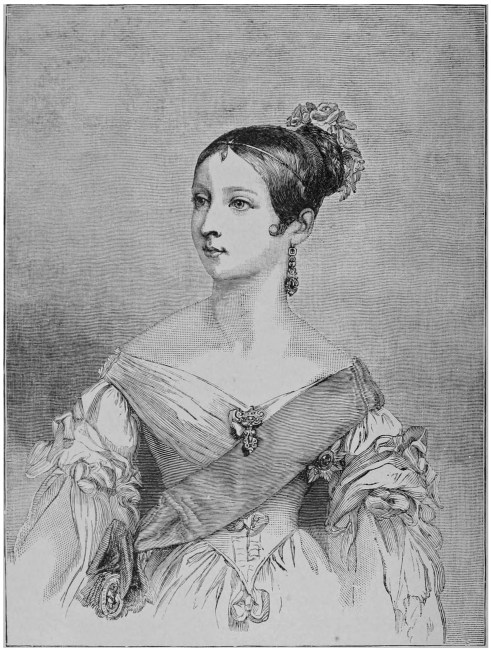
QUEEN VICTORIA IN 1839.
(From a Drawing by R. J. Lane, A.R.A.)
1
FIFTY YEARS AGO.
CHAPTER I.
GREAT BRITAIN, IRELAND, AND THE COLONIES.
I propose to set before my readers a picture of the country as it was when Queen Victoria (God save the Queen!) ascended the throne, now fifty years ago and more. It will be a picture of a time so utterly passed away and vanished that a young man can hardly understand it. I, who am no longer, unhappily, quite so young as some, and whose babyhood heard the cannon of the Coronation, can partly understand this time, because in many respects, and especially in the manners of the middle class, customs and habits which went out of fashion in London lingered in the country towns, and formed part of my own early experiences.

ARRIVAL OF THE CORONATION NUMBER OF ‘THE SUN’—ONE PAPER, AND ONE MAN WHO CAN READ IT IN THE TOWN
In the year 1837—I shall repeat this remark several times, because I wish to impress the fact upon everybody—we were still, to all intents and purposes, in the eighteenth century. As yet the country was untouched2 by that American influence which is now filling all peoples with new ideas. Rank was still held in the ancient reverence; religion was still that of the eighteenth-century Church; the rights of labour were not yet recognised; there were no trades’ unions; there were no railways to speak of; nobody travelled except the rich; their own country was unknown to the people; the majority of country people could not read or write; the good old discipline of Father Stick and his children, Cat-o’-Nine-Tails, Rope’s-end, Strap, Birch, Ferule, and Cane, was wholesomely maintained; landlords, manufacturers, and employers of all kinds did3 what they pleased with their own; and the Blue Ribbon was unheard of. There were still some fiery spirits in whose breasts lingered the ideas of the French Revolution, and the Chartists were already beginning to run their course. Beneath the surface there was discontent, which sometimes bubbled up. But freedom of speech was limited, and if the Sovereign People had then ventured to hold a meeting in Trafalgar Square, that meeting would have been dispersed in a very swift and surprising manner. The Reform Act had been passed, it is true, but as yet had produced little effect. Elections were carried by open bribery; the Civil Service was full of great men’s nominees; the Church was devoured by pluralists; there were no competitive examinations; the perpetual pensions were many and fat; and for the younger sons and their progeny the State was provided with any number of sinecures. How men contrived to live and to be cheerful in this state of things one knows not. But really, I think it made very little apparent difference to their happiness that this country was crammed full of abuses, and that the Ship of State, to outsiders, seemed as if she were about to capsize and founder.
This is to be a short chapter of figures. Figures mean very little unless they can be used for purposes of comparison. When, for instance, one reads that in the Census of 1831 the population of Great Britain was 16,539,318, the fact has little significance except when compared with the Census of 1881, which shows4 that the population of the country had increased in fifty years from sixteen millions to twenty-four millions. And, again, one knows not whether to rejoice or to weep over this fact until it has been ascertained how the condition of these millions has changed for better or for worse, and whether the outlook for the future, if, in the next fifty years, twenty-four become thirty-six, is hopeful or no. Next, when one reads that the population of Ireland was then seven millions and three-quarters, and is now less than five millions, and, further, that one Irishman in three was always next door to starving, and that the relative importance of Ireland to Great Britain was then as one to two, and is now as one to five, one naturally congratulates Ireland on getting more elbow-room and Great Britain on the relative decrease in Irish power to do the larger island an injury.

The Army and Navy together in 1831 contained no more than 277,017 men, or half their present number. But then the proportion of the English military strength to the French was much nearer one of equality. The relief of the poor in 1831 absorbed 6,875,552l., but this sum in 1844 had dropped to 4,976,090l., the saving of two millions being due to the new Poor Law.5 The stream of emigration had hardly yet begun to flow. Witness the following figures:
| The number of emigrants in | 1820 | was | 18,984 |
| ” ” | 1825 | 8,860 | |
| ” ” | 1832 | 103,311 | |
| ” ” | 1837 | 72,034 |
It was not until 1841 that the great flow of emigrants began in the direction of New Zealand and Australia. The emigrants of 1832 chiefly went to Canada, and as yet the United States were practically unaffected by the rush from the old countries.
The population of the great towns has for the most part doubled itself in the last fifty years. London had then a million and a half; Liverpool, 200,000; Manchester, 250,000; Glasgow, 250,000; Birmingham, 150,000; Leeds, 140,000; and Bristol, 120,000.
Penal settlements were still flourishing. Between 1825 and 1840, when they were suppressed, 48,712 convicts were sent out to Sydney. As regards travelling, the fastest rate along the high roads was ten miles an hour. There were 54 four-horse mail coaches in England, and 49 two-horse mails. In Ireland there were 30 four-horse coaches, and 10 in Scotland. There were 3,026 stage coaches in the country, of which 1,507 started from London.
There were already 668 British steamers afloat, though the penny steamboat did not as yet ply upon the river. Heavy goods travelled by the canals and navigable rivers, of which there were 4,000 in Great6 Britain; the hackney coach, with its pair of horses, lumbered slowly along the street; the cabriolet was the light vehicle for rapid conveyance, but it was not popular; the omnibus had only recently been introduced by Mr. Shillibeer; and there were no hansom cabs. There was a Twopenny Post in London, but no Penny Post as yet. There was no Book Post, no Parcel Post, no London Parcels Delivery Company. If you wanted to send a parcel to anywhere in the country, you confided it to the guard of the coach; if to a town address, there were street messengers and the ‘cads’ about the stage-coach stations; there were no telegraphs, no telephones, no commissionaires.

Fifty years ago the great railways were all begun, but not one of them was completed. A map published in the Athenæum of January 23, 1836, shows the state of the railways at that date. The line between Liverpool and Manchester was opened in September, 1830. In 1836 it was carrying 450,000 passengers in the year, and paying a dividend of 9 per cent. The line between Carlisle and Newcastle was very nearly completed; that between Leeds and Selby was opened in 1834; there7 were many short lines in the coal and mining districts, and little bits of the great lines were already completed. The London and Greenwich line was begun in 1834 and opened in 1837. There were in progress the London and Birmingham, the Birmingham, Stafford, and Warrington, the Great Western as far as Bath and Bristol, and the London and Southampton passing through Basingstoke. It is amazing to think that Portsmouth, the chief naval port and place of embarkation for troops, was left out altogether. There were also a great many lines projected, which afterwards settled down into the present great Trunk lines. As they were projected in 1836, instead of Great Northern, North-Western, and Great Eastern, we should have had one line passing through Saffron Walden, Cambridge, Peterborough, Lincoln, York, Appleby, and Carlisle, with another from London to Colchester, Ipswich, Norwich, and Yarmouth; there was also a projected continuation of the G.W.R. line from Bristol to Exeter, and three or four projected lines to Brighton and Dover. The writer of the article on the subject in the Athenæum of that date (January 23, 1836) considers that when these lines are completed, letters and passengers will be conveyed from London to Liverpool in ten hours. ‘Little attention,’ he says, ‘has yet been given to calculate the effects which must result from the establishment throughout the kingdom of great lines of intercourse traversed at a speed of twenty miles an hour.’ Unfortunately he had no confidence in himself as a prophet,8 or we might have had some curious and interesting forecasts.
As regards the extent of the British Empire, there has been a very little contraction and an enormous extension. We have given up the Ionian Islands to gratify the sentiment of Mr. Gladstone, and we have acquired Cyprus, which may perhaps prove of use. We have taken possession of Aden, at the mouth of the Red Sea. In Hindostan, which in 1837 was still partially ruled by a number of native princes, the flag of Great Britain now reigns supreme; the whole of Burma is now British Burma; the little island of Hong Kong, which hardly appears in Arrowsmith’s Atlas of 1840, is now a stronghold of the British Empire. Borneo, then wholly unknown, now belongs partially to us; New Guinea is partly ours; Fiji is ours. For the greatest change of all, however, we must look at the maps of Australia and New Zealand. In the former even the coast had not been completely surveyed; Melbourne was as yet but a little unimportant township. Between Melbourne and Botany Bay there was not a single village, settlement, or plantation. It was not until the year 1851, only thirty-six years ago, that Port Phillip was separated from New South Wales, and created an independent colony under the name of Victoria; and for a few years it was a very rowdy and noisy colony indeed.
In New South Wales, the population of which was about 150,000, convicts were still sent out. In9 the year 1840, when the transportation ceased, 21,000 convicts were assigned to private service. There were in Sydney many men, ex-convicts, who had raised themselves to wealth; society was divided by a hard line, not to be crossed in that generation by those on the one side whose antecedents were honourable and those on the other who had ‘served their time.’ Tasmania was also still a penal colony, and, apparently, a place where the convicts did not do so well as in New South Wales.
Queensland as a separate colony was not yet in existence, though Brisbane had been begun; tropical Australia was wholly unsettled; Western Australia was, what it still is, a poor and thinly settled country.
The map of New Zealand—it was not important enough to have a map all to itself—shows the coast-line imperfectly surveyed, and not a single town or English settlement upon it! Fifty years ago that great colony was not yet even founded. The first serious settlement was made in 1839, when a patch of land at Port Nicholson, in Cook Strait, was bought from the natives for the first party of settlers sent out by the recently established New Zealand Company.
In North America the whole of the North-West Territory, including Manitoba, Muskoka, British Columbia, and Vancouver’s Island, was left to Indians, trappers, buffaloes, bears, and rattlesnakes. South Africa shows the Cape Colony and nothing else. Natal, Orange Free State, the Transvaal, Bechuanaland, Griqualand,10 Zululand are all part of the great undiscovered continent. Considering that all these lands have now been opened up and settled, so that where was formerly a hundred square miles of forest and prairie there is now the same area covered with plantations, towns, and farms, it will be understood that the British Empire has been increased not only in area, but in wealth, strength, and resources to an extent which would have been considered incredible fifty years ago. It is, in fact, just the difference between owning a barren heath and owning a cultivated farm. The British Empire in 1837 contained millions of square miles of barren heath and wild forest, which are now settled land and smiling plantations. It boasted of vast countries, with hardly a single European in them, which are now filled with English towns. In 1837, prophets foretold the speedy downfall of an Empire which could no longer defend her vast territories. These territories can now defend themselves. It may be that we shall have to fight for empire, but the longer the day of battle is put off the better it will be for England, and the greater will be her might. To carry on that war, there are now, scattered over the whole of the British Empire, fifty millions of people speaking the Anglo-Saxon tongue. In fifty years’ time there will be two hundred millions in Great Britain, Ireland, Australia, Africa, Asia, New Zealand, and the Isles, with another two hundred millions in the States. If the English-speaking races should decide to unite in a vast confederacy, all the11 other Powers on the earth combined will not be able to do them an injury. Perhaps after this life we shall be allowed to see what goes on in the world. If so, there is joy in store for the Briton; if not, we have been born too soon.

NAPOLEON AT LONGWOOD
(From a Drawing made in 1820)
Next to the extension and development of the Empire comes the opening up of new countries. We have rescued since the year 1837 the third part of Africa from darkness; we have found the sources of the Nile; we have traced the great River Congo from its source to its mouth; we have explored the whole of Southern Africa; we have rediscovered the great African lakes which were known to the Jesuits in the seventeenth century; in Australia we have crossed and recrossed the continent; the whole of North America has been torn from the Red Indians, and is now settled in almost every part.

LONDON STREET CHARACTERS, 1837
(From a Drawing by John Leech)
If the progress of Great Britain has been great, that of the United States has been amazing. Along the Pacific shore, where were fifty years ago sand and rock and snow, where formerly the sluggish Mexican kept his ranch and the Red Indian hunted the buffalo, great towns and American States now flourish. Arkansas and Missouri were frontier Western States; Michigan was almost without settlers; Chicago was a little place otherwise called Fort Dearborn. The population of the States was still, except for the negroes, and a few descendants of Germans, Dutch, and Swedes, chiefly of pure British descent. As yet there were in America12 few Irish, Germans (except in Pennsylvania), Norwegians, or Italians. Yet the people, much more than now our cousins, held little friendly feeling towards the Mother Country, and lacked the kindly sentiment which has grown up of late years; they were quite out of touch with us, strangers to us, and yet speaking our13 tongue, reading our literature, and governed by our laws.

5 GREAT CHEYNE ROW
(The House in which Carlyle lived from 1834 to his death in 1881)
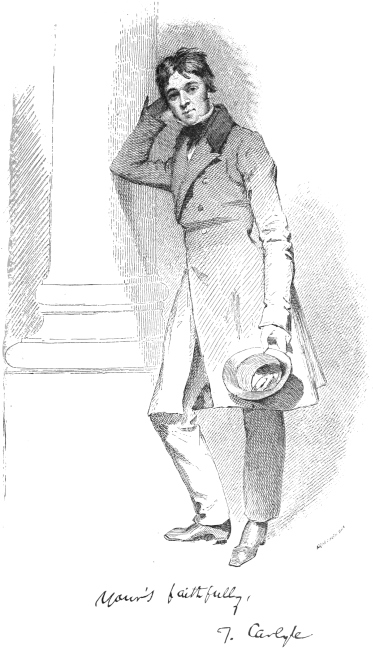
Your’s faithfully,
T. Carlyle.
-THOMAS CARLYLE-
As soon as the battle of Waterloo was fairly fought and Napoleon put away at St. Helena, the Continental professors, historians, political students, and journalists all began with one accord to prophesy the approaching downfall of Great Britain, which some affected to deplore and others regarded with complacency. Everything conspired, it was evident, not only to bring about this decline, but also to accelerate it. The parallel of Carthage—England has always been set up as the second Carthage—was freely exhibited, especially in those countries which felt themselves called upon and qualified to play the part of Rome. It was pointed out that there was the dreadful deadweight of Ireland, with its incurable poverty and discontent; the approaching decay of trade, which could be only, in the opinion of these keen-sighted philosophers, a matter of a few years; the enormous weight of the National Debt; the ruined manufacturers; the wasteful expenditure of the Government in every branch; the corrupting influence of the Poor Laws; the stain of slavery; the restrictions of commerce; the intolerance of the Church; the narrowness and prejudice of the Universities; the ignorance of the people; their drinking habits; the vastness of the Empire. These causes, together with discontent, chartism, republicanism, atheism—in fact, all the disagreeablisms—left no doubt whatever that England was doomed. Foreigners, in fact, not yet recovered from14 the extraordinary spectacle of Great Britain’s long duel with France and its successful termination, prophesied what they partly hoped out of envy and jealousy, and partly feared from self-interest. Therefore the politicians and professors were always looking at this country, writing about it, watching it, visiting it. No; there could be no doubt; none of these changes and dangers could be denied; the factories were choked with15 excessive production; poverty stalked through the country; the towns were filled with ruined women; the streets were cumbered with drunken men; the children were growing up in ignorance and neglect inconceivable; what could come of all this but ruin? Even—and this was the most wonderful and incredible thing to those who do not understand how long a Briton will go on enduring wrongs and suffering anomalies—the very House of Commons in this boasted land of freedom did not represent half the people, seats were openly bought and sold, others were filled with nominees of the great men who owned them. What could possibly follow but ruin—swift and hopeless ruin? What, indeed? Prophets of disaster always omit one or two important elements in their calculations, and it is through these gaps that the people basely wriggle, instead of fulfilling prophecy as they ought to do. For instance, there is the recuperative power of Man, and there is his individuality. He may be full of moral disease, yet such is his excellent constitution that he presently recovers—he shakes off his evil habits as he shakes the snow off his shoulders, and goes on an altered creature. Again, the mass of men may be in heavy case, but the individual man is patient; he has strength to suffer and endure until he can pull through the worst; he has patience to wait for better times; difficulties only call forth his ingenuity and his resource: disaster stiffens his back, danger finds him brave. Always, to the prophet who knows not Man, the case16 is hopeless. Always, to one who considers that by gazing into the looking-glass, especially immediately before or after his morning bath, he may perceive his brother as well as himself, things are hopeful. My brother, have things, at your worst, ever been, morally, so bad with you that you have despaired of recovery, seeing that you had only to resolve and you were cured? Have you ever reflected that while, to the outside world, to your maiden aunts and to your female cousins, you were most certainly drifting to moral wreck and material ruin, you have gone about the world with a hopeful heart, feeling that the future was in your own grasp? Even now the outlook of the whole world is truly dark, and the clouds are lowering. Yet surely the outlook was darker, the clouds were blacker, fifty years ago. Read Carlyle’s ‘Past and Present,’ and compare. There may be other dangers before us of which we then suspected nothing.17 But if we still preserve the qualities which enabled us to stand up, almost alone, against the colossal force of Napoleon, with Europe at his back, and which carried us through the terrible troubles which followed the war, we surely need not despair.

THE DUCHESS OF KENT, WITH THE PRINCESS VICTORIA AT THE AGE OF TWO
(From the Picture by Sir W. Beechey at Windsor Castle)
18
CHAPTER II.
THE YEAR 1837.

WILLIAM IV.
(From a Drawing by HB.)
The year 1837, except for the death of the old King and the accession of the young Queen, was a tolerably insignificant year. It was on June 20 that the King died. He was buried on the evening of July 9 at St. George’s Chapel, Windsor; on the 10th the Queen dissolved Parliament; on the 13th she went to Buckingham Palace; and on November 9 she visited the City, where they gave her a magnificent banquet, served in Guildhall at half past five, the Lord Mayor and City magnates humbly taking their modest meal at a lower table. Both the hour appointed for the banquet and the humility of the Lord Mayor and Aldermen point to a remote period.
19 The year began with the influenza. Everybody had it. The offices of the various departments of the Civil Service were deserted because all the clerks had influenza. Business of all kinds was stopped because merchants, clerks, bankers, and brokers all had influenza; at Woolwich fifty men of the Royal Artillery and Engineers were taken into hospital daily, with influenza. The epidemic seems to have broken out suddenly, and suddenly to have departed. Another important event of the year was the establishment of steam communication with India by way of the Red Sea. The ‘Atalanta’ left Bombay on October 2, and arrived at Suez on October 16. The mails were brought into Alexandria on the 20th, and despatched, such was the celerity of the authorities, on November 7 by H.M.S. ‘Volcano.’ They reached Malta on the 11th, Gibraltar on the 16th, and England on December 4, taking sixty days in all, of which, however, eighteen days were wasted in Alexandria, so that the possible time of transit from Bombay to England was proved to be forty-two days.
This was the year of the Greenacre murder. The wretched man was under promise to marry an elderly woman, thinking she had money. One night, while they were drinking together, she confessed that she had none, and had deceived him; whereupon, seized with wrath, he took up whatever weapon lay to his hand, and smote her on the head so that she fell backwards dead. Now mark: if this man had gone straight20 to the nearest police-office, and confessed the crime of homicide, he would certainly have escaped hanging. But he was so horribly frightened at what had happened, that he tried to hide the thing by cutting up the body and bestowing the fragments in various places, all of them the most likely to be discovered. There was another woman in the case, proved to have been in his confidence, and tried with him, when all the pieces had been recovered, and the murder was brought home to him. He was found guilty and hanged. And never was there a hanging more numerously or more fashionably attended. The principal performer, however, is said to have disappointed his audience by a pusillanimous shrinking from the gallows when he was brought out. The woman was sent to Australia, where, perhaps, she still survives.
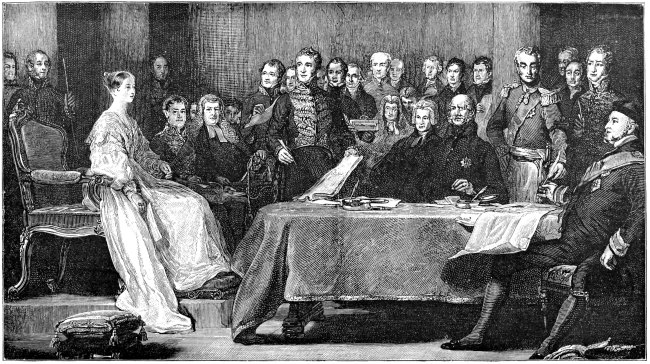
THE QUEEN’S FIRST COUNCIL—KENSINGTON PALACE, JUNE 20, 1837.
(From the Picture by Sir David Wilkie, R.A., at Windsor Castle.)

There was also, this year, an extremely scandalous action in the High Court of Justice. It was a libel case brought by Lord de Ros, and arose out of a gambling21 quarrel, in which his lordship was accused of cheating at cards. It was said that, under pretence of a bad cough and asthma, he kept diving under the table and fishing up kings and aces, a thing which seems of elementary simplicity, and capable of clear denial. His lordship, in fact, did deny it, stoutly and on oath. Yet the witnesses as stoutly swore that he did do this thing, and the jury found that he did. Whereupon his lordship retired to the Continent, and shortly afterwards died, s.p., without offspring to lament his errors.
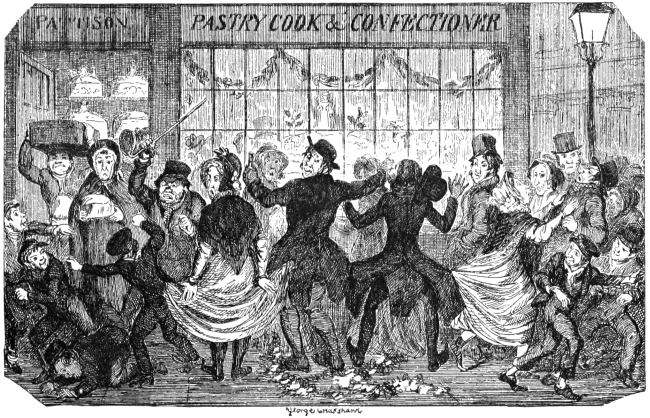
There was a terrible earthquake this year in the Holy Land. The town of Safed was laid in ruins, and more than four thousand of the people were killed. There was a project against the life of Louis-Philippe, by one Champion, who was arrested. He was base enough to hang himself in prison, so that no one ever knew if he had any accomplices.
The news arrived also of a dreadful massacre in New Zealand. There was only one English settlement in the country; it was at a place called Makuta, in the North Island, where a Mr. Jones, of Sydney, had a flax establishment, consisting of 120 people, men, women, and children. They were attacked by a party of 800 natives, and were all barbarously murdered.
A fatal duel was fought on Hampstead Heath, near the Spaniards Tavern. The combatants were a Colonel Haring, of the Polish army, and another Polish officer, who was shot. The seconds carried him to the22 Middlesex Hospital, where he died, and nothing more was said about it.
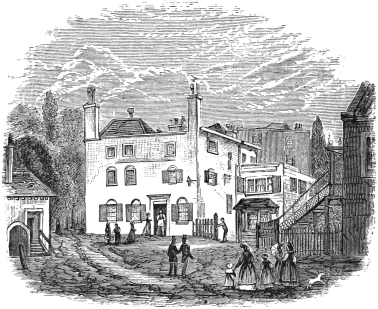
The dangers of emigration were illustrated by the voyage of the good ship ‘Diamond,’ of Liverpool. She had on board a party of passengers emigrating to New York. In the good old sailing days, the passengers were expected to lay in their own provisions, the ship carrying water for them. Now the ‘Diamond’ met with contrary winds, and was ninety days out, three times as long as was expected. The ship had no more than enough provisions for the crew, and when the passengers had exhausted their store their sufferings were terrible.
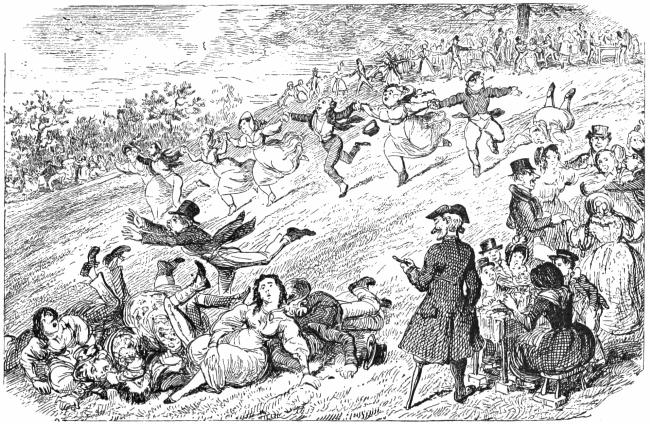
23 An embassy from the King of Madagascar arrived this year, and was duly presented at Court. I know not what business they transacted, but the fact has a certain interest for me because it was my privilege, about four-and-twenty years ago, to converse with one of the nobles who had formed part of that embassy, and who, after a quarter of a century, was going again on another mission to the Court of St. James. He was, when I saw him, an elderly man, dark of skin, but, being a Hova, most intelligent and well-informed; also, being a Hova, anxious to say the thing which would please his hearers. He recalled many incidents connected with the long journey round the Cape in a sailing vessel, the crowds and noise of London, the venerable appearance of King William, and his general kindness to the ambassadors. When he had told us all he could recollect, he asked us if we should like to hear him sing the song which had beguiled many weary hours of his voyage. We begged him to sing it, expecting to hear something national and fresh, something redolent of the Madagascar soil, a song sung in the streets of its capital, Antananarivo, perhaps with a breakdown or a walk round. Alas! he neither danced a breakdown, nor did he walk round, nor did he sing us a national song at all. He only piped, in a thin sweet tenor, and very correctly, that familiar hymn ‘Rock of Ages,’ to the familiar tune. I have never been able to believe that this nobleman, His Excellency the Right Honourable the Lord Rainiferingalarovo, Knight of the Fifteen Honour, entitled24 to wear a lamba as highly striped as they are made, commonly reported to be a pagan, with several wives, really comforted his soul, while at sea, with this hymn. But he was with Christians, and this was a missionary’s hymn which he had often heard, and it would doubtless please us to hear it sung. Thereupon he sang it, and a dead silence fell upon us. Behold however, the reason why the record of this simple event, the arrival of the embassy from Madagascar, strikes a chord in the mind of one at least who reads it. There is little else to chronicle in the year. The University of Durham was founded: a truly brilliant success have they made of this learned foundation! And Sir Robert Peel was Rector of Glasgow University. For the rest,25 boilers burst, coaches were upset, and many books of immense genius were produced, which now repose in the Museum.
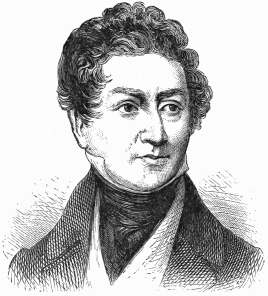
Yet a year which marked the close of one period and the commencement of another. The steamship ‘Atalanta’ carrying the bags to Suez—what does this mean? The massacre in New Zealand of the only white men on the island—what does this portend? The fatal duel at Hampstead; the noble lord convicted of cheating at cards; the emigrant ship ninety days out with no food for the passengers—what are these things but illustrations of a time that has now passed away, the passage from the eighteenth to the nineteenth century? For there are no longer any duels; noble lords no longer gamble, unless they are very young and foolish; ships no longer take passengers without food for them; we have lessened the distance to India by three-fourths, measured by time; and the Maoris will rise no more, for their land is filled with the white men.
In that year, also, there were certain ceremonies observed which have now partly fallen into disuse.
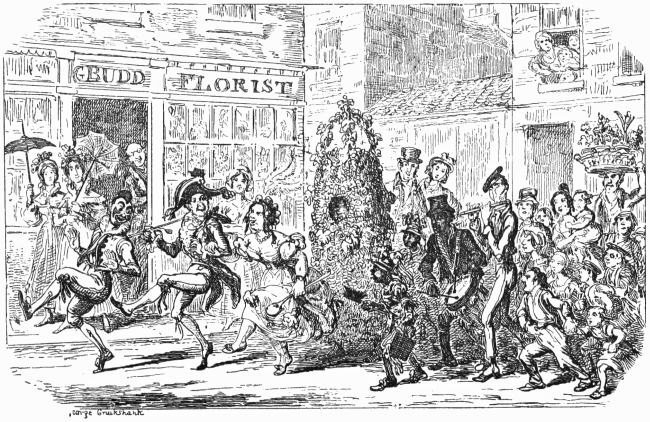
For instance, on Twelfth Day it was the custom for confectioners to make in their windows a brave show of Twelfth-cakes; it was also the custom of the public to flatten their noses against the windows and to gaze upon the treasures displayed to view. It was, further, the custom—one of the good old annual customs, like beating the bounds—for the boys to pin26 together those who were thus engaged by their coat-tails, shawls, skirts, sleeves, the ends of comforters, wrappers, and boas, and other outlying portions of raiment. When they discovered the trick—of course they only made pretence at being unconscious—by the rending, tearing, and destruction of their garments, they never failed to fall into ecstasies of (pretended) wrath, to the joy of the children, who next year repeated the trick with the same success. I think there are no longer any Twelfth-cakes, and I am sure that the boys have forgotten that trick.
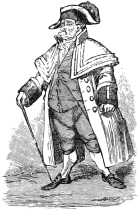
A PARISH BEADLE
(From a Drawing by George Cruikshank in ‘London Characters’)
On Twelfth Day the Bishop of London made an offering in the Chapel Royal of St. James’s in commemoration of the Wise Men from the East. Is that offering made still? and, if so, what does his lordship offer? and with what prayers, or hopes, or expectations, is that offering made?
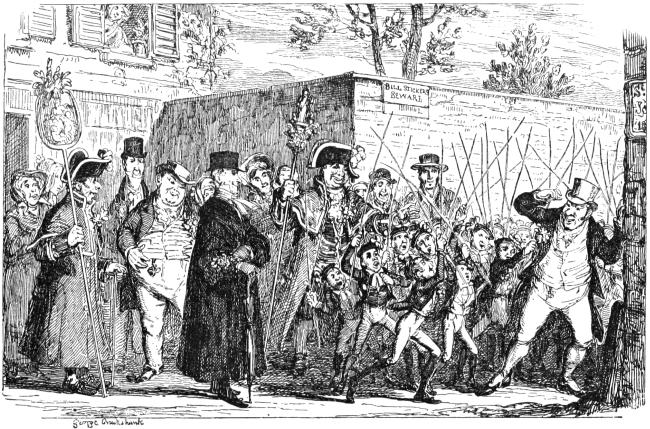
27 At the commencement of Hilary Term the judges took breakfast with the Lord Chancellor, and afterwards drove in state to Westminster.
On January 30, King Charles’s Day, the Lords went in procession to Westminster Abbey and the Commons to St. Margaret’s, both Houses to hear the Service of Commemoration. Where is that service now?
On Easter Sunday the Royal Family attended Divine Service at St. James’s, and received the Sacrament.
On Easter Monday the Lord Mayor, Sheriffs, and Aldermen went in state to Christ Church, formerly the Church of the Grey Friars, and heard service. In the evening there was a great banquet, with a ball. A fatiguing day for my Lord Mayor.
Easter Monday was also the day of the Epping Hunt. Greenwich Fair was held on that and the two following days. And in Easter week the theatres played pieces for children.
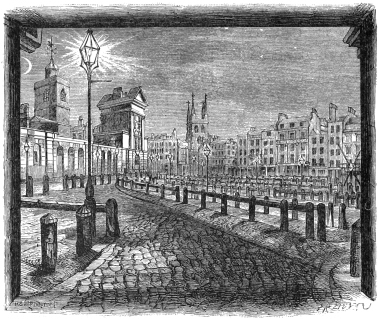
EVENING IN SMITHFIELD
(From a Drawing made in 1858, at the gateway leading into Cloth Fair, the place of proclamation of Bartholomew Fair)
On the first Sunday in Easter the Lord Mayor and Sheriffs went in state to St. Paul’s, and had a banquet afterwards.
On May Day the chimney-sweeps had their annual holiday.
On Ascension Day they made a procession of parish functionaries and parochial schools, and beat the bounds, and, to mark them well in the memory of all, they beat the charity children who attended the beadle, and they beat all the boys they caught on the way, and they banged against the boundaries all the strangers who28 passed within their reach. When it came to banging the strangers, they had a high old time.
On the Queen’s Birthday there was a splendid procession of stage coaches from Piccadilly to the Post Office.
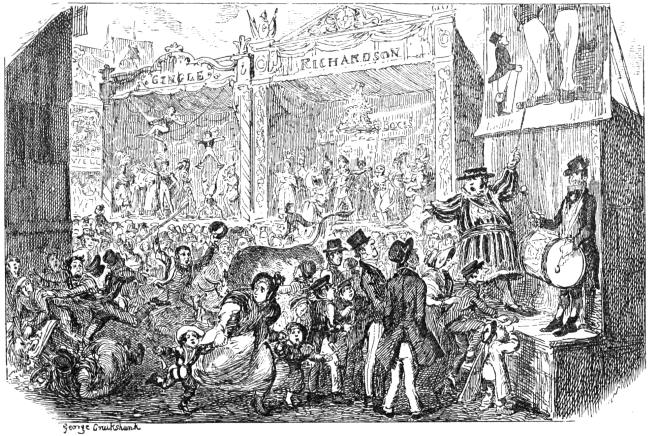
Lastly, on September 3, Bartholomew Fair was opened by the Lord Mayor, and then followed what our modern papers are wont to call a carnival, but what the papers of 1837 called, without any regard to picturesque writing, a scene of unbridled profligacy, licentiousness, and drunkenness, with fighting, both of29 fists and cudgels, pumping on pickpockets, robbery and cheating, noise and shouting, the braying of trumpets and the banging of drums. If you want to know what this ancient fair was like, go visit the Agricultural Hall at Christmas. They have the foolish din and noise of it, and if the people were drunk, and there were no police, and everybody was ready and most anxious to fight, and the pickpockets, thieves, bullies, and blackguards were doing what they pleased, you would have Bartholomew Fair complete.
30
CHAPTER III.
LONDON IN 1837.
The extent of London in 1837, that is to say, of close and continuous London, may be easily understood by drawing on the map a red line a little above the south side of Regent’s Park. This line must be prolonged west until it strikes the Edgware Road, and eastward until it strikes the Regent’s Canal, after which it follows the Canal until it falls into the Regent’s Canal Docks. This is, roughly speaking, the boundary of the great city on the north and east. Its western boundary is the lower end of the Edgware Road, Park Lane, and a line drawn from Hyde Park Corner to Westminster Bridge. The river is its southern boundary, but if you wish to include the Borough, there will be a narrow fringe on the south side. This was the whole of London proper, that is to say, not the City of London, or London with her suburbs, but continuous London. If you look at Mr. Loftie’s excellent map of London,1 showing the extent built upon at different periods, you will find a greater area than this ascribed to London at this period. That is because Mr. Loftie has chosen to include many parts which at this time were suburbs of one street,31 straggling houses, with fields, nurseries, and market-gardens. Thus Kennington, Brixton, and Camberwell are included. But these suburban places were not in any sense part of continuous London. Open fields and gardens were lying behind the roads; at the north end of Kennington Common—then a dreary expanse uncared for and down-trodden—lay open ponds and fields; there were fields between Vauxhall Gardens and the Oval. If we look at the north of London, there were no houses round Primrose Hill; fields stretched north and east; to the west one or two roads were already pushing out, such as the Abbey Road and Avenue Road; through the pleasant fields of Kilburn, where still stood the picturesque fragments of Kilburn Priory, the Bayswater rivulet ran pleasantly; it was joined by two other brooks, one rising in St. John’s Wood, and flowing through what are now called Craven Gardens into the Serpentine. On Haverstock Hill were a few villas; Chalk Farm still had its farm buildings; Belsize House, with its park and lake, was the nearest house to Primrose Hill. A few houses showed the site of Kentish Town, while Camden Town was then a village, clustered about its High Street in the Hampstead Road. Even the York and Albany Tavern looked out back and front on fields; Mornington Crescent gazed across its garden32 upon open fields and farms; the great burial-ground of St. James’s Church had fields at the back; behind St. Pancras’ Churchyard stretched ‘Mr. Agar’s Farm;’ Islington was little more than a single street, with houses on either side; Bagnigge Wells—it stood at the north-east of St. Andrew’s Burying-ground in Gray’s Inn Road—was still in full swing; Hoxton had some of its old houses still standing, with the Haberdashers’ Almshouses; the rest was laid out in nurseries and gardens. King’s Cross was Battle Bridge; and Pentonville was only in its infancy.
1 Loftie’s History of London. Stanford, 1884.
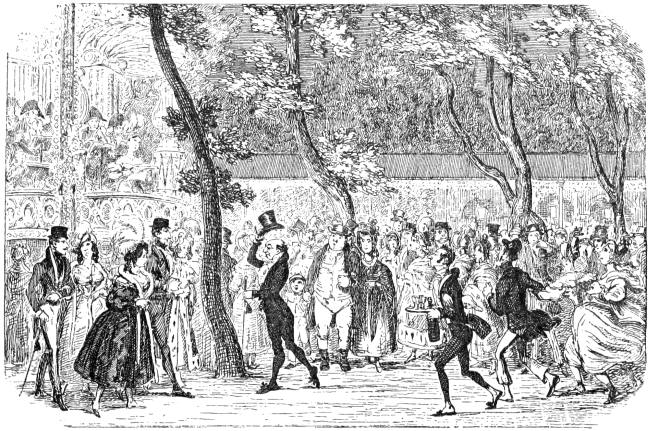
Looking at this comparatively narrow area, consider the enormous growth of fifty years. What was Bow? A little village. What was Stratford, now a town of 70,000 people? There was no Stratford. Bromley was a waste; Dalston, Clapham, Hackney, Tottenham, Canonbury, Barnsbury—these were mere villages; now they are great and populous towns. But perhaps the change is more remarkable still when one considers the West End. All that great cantlet lying between Marylebone Road and Oxford Street was then much in the same state as now, though with some difference in detail; thus, one is surprised to find that the south of Blandford Square was occupied by a great nursery. But west of Edgware Road there was next to nothing. Connaught Square was already built, and the ground between the Grand Junction Road and the Bayswater Road was just laid out for building; but the great burying-ground of St. George’s, now hidden from view and built round,33 was in fields. The whole length of the Bayswater Road ran along market-gardens; a few houses stood in St. Petersburg Place; Westbourne Green had hardly a cottage on it; Westbourne Park was a green enclosure; there were no houses on Notting Hill; Campden Hill had only one or two great houses, and a field-path led pleasantly from Westbourne Green to the Kensington Gravel Pits.
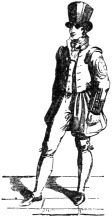
On the west and south-west the Neat Houses, with their gardens, occupied the ground west of Vauxhall Bridge. Earl’s Court, with its great gardens and mound, stood in the centre of the now crowded and dreary suburb; south of the Park stood many great houses, such as Rutland House, now destroyed and replaced by terraces and squares. But though London was then so small compared with its present extent, it was already a most creditable city. Those who want more figures will be pleased to read that at the census of 1831 London contained 14,000 acres, or nearly twenty-two square miles. This area was divided into 153 parishes, containing 10,000 streets and courts and 250,000 houses. Its population was 1,646,288. Fifty years before it was half that number, fifty years later it was double that number. We may take the population of the year 1837 as two millions.
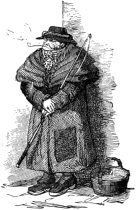
HACKNEY COACHMAN
(From a Drawing by George Cruikshank in ‘London Characters’)
More figures. There were 90,000 passengers across London Bridge every day, there were 1,200 cabriolets, 600 hackney coaches, and 400 omnibuses; there were 30,000 deaths annually. The visitors every year were34 estimated at 12,000. Among the residents were 130,000 Scotchmen, 200,000 Irish, and 30,000 French. These figures convey to my own mind very little meaning, but they look big, and so I have put them down. Speaking roughly, London fifty years ago was twice as big as Paris is now, or the present New York.
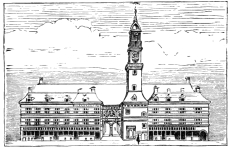
As for the buildings of London proper, fifty years have witnessed many changes, and have brought many losses—more losses, perhaps, than gains. The Royal Exchange, built by Edward Jerman in place of Sir Thomas Gresham’s of 1570, was burnt to the ground on January 10, 1838. The present building, designed by Sir William Tite, was opened by the Queen in person on October 28, 1844. Jerman’s Exchange was a quadrangular building, with a clock-tower of timber35 on the Cornhill side. It had an inner cloister and a ‘pawn,’ or gallery, above for the sale of fancy goods. It was decorated by a series of statues of the Kings, from Edward I. to George IV. Sion College, which until the other day stood in the street called London Wall, was not yet wantonly and wickedly destroyed by those who should have been its natural and official protectors, the London clergy.
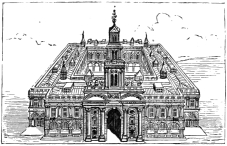
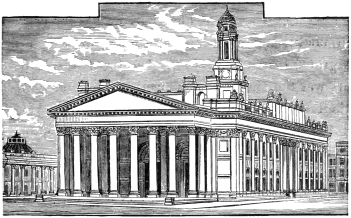
36 Things happen so quickly that one easily forgets; yet let me pay a farewell tribute and drop a tear to the memory of the most delightful spot in the whole of London. The building was not of extreme age, but it stood upon the ancient site of Elsinge Spital, which itself stood upon the site of the old Cripplegate Nunnery; it was founded in 1623 by the will of one Dr. Thomas White, Vicar of St. Dunstan’s-in-the-West; the place was damaged by the Great Fire, and little of the building was older, I believe, than 1690, or thereabouts. But one stepped out of the noise and hurry of the very heart of London into a courtyard where the air was instantly hushed; on the right hand were the houses of the almsmen and women, though I believe they had of late ceased to occupy them. Above the almshouses was the long narrow library crammed with books, the sight and fragrance of which filled the grateful soul with joy. On the left side of the court was the Hall used for meetings, and open all day to the London clergy for reading the magazines, reviews, and papers. A quiet, holy place. Fuller wrote his ‘Church History’ in this college; the illustrious Psalmanazar wrote here his ‘Universal History’—it was after he repented of his colossal lies, and had begun to live cleanly. Two hundred and fifty years have witnessed a long succession of London clergymen, learned and devout most of them, reading in this library and meeting in this hall. Now it is pulled down, and a huge warehouse occupies its place. The London clergy themselves,37 for the sake of gain, have sold it. And, as for the garish thing they have stuck up on the Embankment, they may call it what they like, but it is not Sion College.
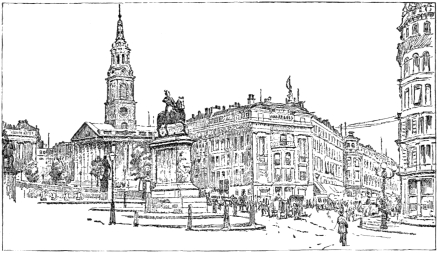
Another piece of wanton wickedness was the destruction of Northumberland House. It is, of course, absurd to say that its removal was required. The removal of a great historic house can never be required. It was the last of the great houses, with the exception of Somerset House, and that is nearly all modern, having been erected in 1776–1786 on the site of the old palace.
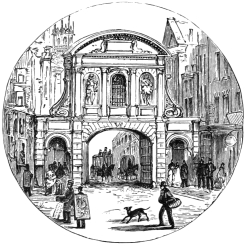
The Strand, indeed, is very much altered since the year 1837. At the west end the removal of Northumberland House has been followed by the building of the38 Grand Hotel, and the opening of the Northumberland Avenue: the Charing Cross Station and Hotel have been erected: two or three new theatres have been added: Temple Bar has been taken down—in any other country the old gate would have been simply left standing, because it was an ancient historical monument; they would have spared it and made a roadway on either side; the rookeries which formerly stood on the north side close to the Bar have been swept away, and the Law Courts stand in their place—where the rooks are gone it is impossible to say. I myself dimly remember a labyrinth of lanes, streets, and courts on this site. They were inhabited, I believe, by low-class solicitors, money-lenders, racing and betting men, and by all kinds of adventurers. Did not Mr. Altamont have chambers here, when he visited Captain Costigan39 in Lyons Inn? Lyons Inn itself is pulled down, and on its site is the Globe Theatre.
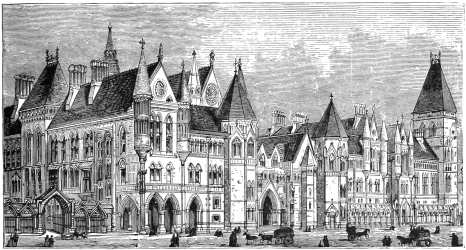
As for churches, there has been such an enormous increase of churches in the last fifty years, that it seems churlish to lament the loss of half a dozen. But this half-dozen belongs to the City: they were churches built, for the most part, by Wren, on the site of ancient churches destroyed in the Fire; they were all hallowed by old and sacred associations; many of them were interesting and curious for their architecture: in a word, they ought not to have been pulled down in order to raise hideous warehouses over their site. Greed of gain prevailed; and they are gone. People found out that their number of worshippers was small, and argued that there was no longer any use for them. So40 they are gone, and can never be replaced. As for their names, they were the churches of Allhallows, Broad Street; St. Benet’s, Gracechurch Street; St. Dionis Backchurch; St. Michael’s, Queenhithe; St. Antholin’s, Budge Row; St. Bene’t Fink; St. Mary Somerset; St. Mary Magdalen; and St. Matthew, Friday Street. The church of St. Michael, Crooked Lane, in which was the grave of Sir William Walworth, disappeared in the year 1831; those of St. Bartholomew by Eastcheap, and of St. Christopher-le-Stock, which stood on either side of the Bank, were taken down in the years 1802 and 1781 respectively. The site of these old churches is generally marked by a small enclosure, grown over with thin grass, containing one, or at most two, tombs. It is about the size of a dining-room table, and you may read of it that the burying-ground of Saint So-and-so is still preserved. Indeed! Were the City churchyards of such dimensions? The ‘preservation’ of the burial-grounds is like the respect which used to be paid to the First Day of the week in the early lustra of the Victorian Age by the tobacconist. He kept one shutter up. So the desecrators of the City churchyards, God’s acre, the holy ground filled with the bones of dead citizens, measured off a square yard or two, kept one tomb, and built their warehouses over all the rest.
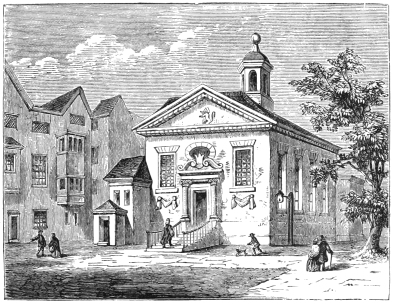
LYONS INN IN 1804
(From an Engraving in Herbert’s ‘History of the Inns of Court’)
All round London the roads were blocked everywhere by turnpikes. It is difficult to understand the annoyance of being stopped continually to show a pass or to pay the pike. Thus, there were two or three turnpikes41 in what is now called the Euston Road, and was then the New Road; one of them was close to Great Portland Street, another at Gower Street. At Battle Bridge, which is now King’s Cross, there were two, one on the east, and one on the west; there was a pike in St. John Street, Clerkenwell. There were two in the City Road, and one in New North Road, Hoxton; one at Shoreditch, one in Bethnal Green Road, one in Commercial Road. No fewer than three in East India Dock Road, three in the Old Kent Road, one in Bridge Street, Vauxhall; one in Great Surrey Street, near the Obelisk; one at Kennington Church—what man turned of forty cannot remember42 the scene at the turnpike on Derby Day, when hundreds of carriages would be stopped while the pikeman was fighting for his fee? There was a turnpike named after Tyburn, close to Marble Arch; another at the beginning of Kensington Gardens; one at St. James’s Church, Hampstead Road. Ingenious persons knew how to avoid the pike by making a long détour.
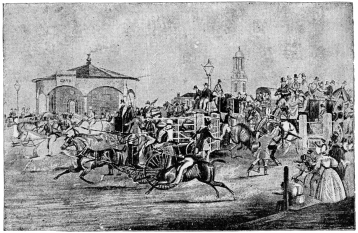
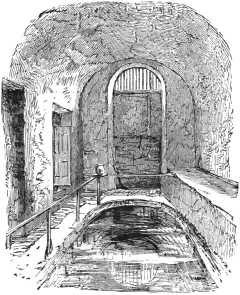
The turnpike has gone, and the pikeman with his apron has gone—nearly everybody’s apron has gone too—and the gates have been removed. That is a clear gain. But there are also losses. What, for instance, has become of all the baths? Surely we have not, as a nation, ceased to desire cleanliness? Yet in reading the list of the London baths fifty years ago one cannot choose but ask the question. St. Annice-le-Clair used to be a medicinal spring, considered efficacious in43 rheumatic cases. Who stopped that spring and built upon its site? The Peerless Pool close beside it was the best swimming bath in all London. When was that filled up and built over? Where are St. Chad’s Wells now? Formerly they were in Gray’s Inn Road, near ‘Battle Bridge,’ which is now King’s Cross, and their waters saved many an apothecary’s bill. There were swimming baths in Shepherdess Walk, near the almshouses. When were they destroyed? There was another in Cold Bath Fields; the spring, a remarkably cold one, still runs into a bath of marble slabs, represented to have been laid for Mistress Nell Gwynne in the days of the Merry Monarch. Curiously, the list from which I am quoting does not mention the most44 delightful bath of all—the old Roman Bath in the Strand. I remember making the acquaintance of this bath long ago, in the fifties, being then a student at King’s. The water is icy cold, but fresh and bright, and always running. The place is never crowded; hardly anybody seems to know that here, in the heart of London, is a monument of Roman times, to visit which, if it were at Arles or Avignon, people would go all the way from London. Some day, no doubt, we shall hear that it has been sold and destroyed, like Sion College, and the spring built over.
45
CHAPTER IV.
IN THE STREET.
Let us, friend Eighty-seven, take a walk down the Strand on this fine April afternoon of Thirty-seven. First, however, you must alter your dress a little. Put on this swallow-tail coat, with the high velvet collar—it is more becoming than the sporting coat in green bulging out over the hips; change your light tie and masher collar for this beautiful satin stock and this double breastpin; put on a velvet waistcoat and an under-waistcoat of cloth; thin Cossack trousers with straps will complete your costume; turn your shirt cuffs back outside the coat sleeve, carry your gloves in your hand, and take your cane. You are now, dear Eighty-seven, transformed into the dandy of fifty years ago, and will not excite any attention as we walk along the street.
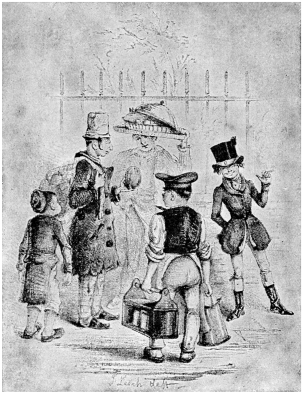
LONDON STREET CHARACTERS, 1827
(From a Drawing by John Leech)
We will start from Charing Cross and will walk towards the City. You cannot remember, Eighty-seven, the King’s Mews that stood here on the site of Trafalgar Square. When it is completed, with the National Gallery on the north side, the monument and statue of Nelson, the fountains and statues that they talk about, there will be a very fine square. And we have certainly46 got rid of a group of mean and squalid streets to make room for the square. It is lucky that they have left Northumberland House, the last of the great palaces that once lined the Strand.
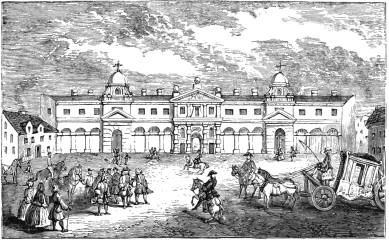
THE KING’S MEWS IN 1750
(From a Print by I. Maurer)
The Strand looks very much as it will in your time, though the shop fronts are not by any means so fine. There is no Charing Cross Station or Northumberland Avenue; most of the shops have bow windows and47 there is no plate-glass, but instead, small panes such as you will only see here and there in your time. The people, however, have a surprisingly different appearance. The ladies, because the east wind is cold, still keep to their fur tippets, their thick shawls, and have their necks wrapped round with boas, the ends of which hang down to their skirts, a fashion revived by yourself; their bonnets are remarkable structures, like an ornamental coal-scuttle of the Thirty-seven, not the Eighty-seven, period, and some of them are of surprising dimensions, and decorated with an amazing profusion of ribbons and artificial flowers. Their sleeves are shaped like a leg of mutton; their shawls are like a dining-room carpet of the time—not like your dining-room carpet, Eighty-seven, but a carpet of48 flaunting colour, crimson and scarlet which would give you a headache. But the curls of the younger ladies are not without their charms, and their eyes are as bright as those of their grandchildren, are they not?
Let us stand still awhile and watch the throng where the tide of life, as Johnson said, is the fullest.
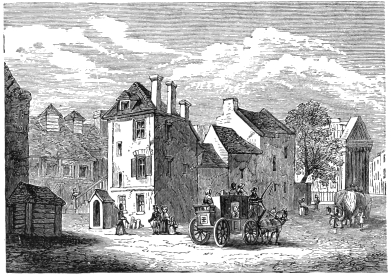
BARRACK AND OLD HOUSES ON THE SITE OF TRAFALGAR SQUARE
(From a Drawing made by F. W. Fairholt in 1826)
Here comes, with a roll intended for a military swagger, the cheap dandy. I know not what he is by trade; he is too old for a medical student, not shabby enough for an attorney’s clerk, and not respectable enough for a City clerk. Is it possible that he is a young gentleman of very small fortune which he is running through? He wears a tall hat broader at the49 top than at the bottom, he carries white thread gloves, sports a cane, has his trousers tightly strapped, wears a tremendously high stock, with a sham diamond pin, a coat with a velvet collar, and a double-breasted waistcoat. His right hand is stuck—it is an aggressive attitude—in his coat-tail pocket. The little old gentleman who follows him, in black shorts and white silk stockings, will be gone before your time; so will yonder still more ancient gentleman in powdered hair and pigtail who walks slowly along. Pigtails in your time will be clean forgotten as well as black silk shorts.
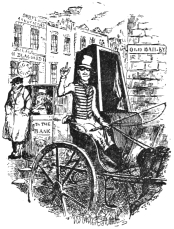
THE LAST CABRIOLET DRIVER
(From the Drawing by George Cruikshank in ‘Sketches by Boz’)
Do you see that thin, spare gentleman in the cloak, riding slowly along the street followed by a mounted servant? The people all take off their hats respectfully to him, and country folk gaze upon him curiously. That is the Duke. There is only one Duke to the ordinary Briton. It is the Duke with the hook nose—the Iron Duke—the Duke of Wellington.
The new-fashioned cabriolet, with a seat at the side for the driver and a high hood for the fare, is light and swift, but it is not beautiful nor is it popular. The50 wheels are too high and the machine is too narrow. It is always upsetting, and bringing its passengers to grief.
Here is one of the new police, with blue swallow-tail coat tightly buttoned, and white trousers. They are reported to be mightily unpopular with the light-fingered gentry, with whose pursuits they are always interfering in a manner unknown to the ancient Charley.
Here comes a gentleman, darkly and mysteriously clad in a fur-lined cloak, fastened at his neck by a brass buckle, and falling to his feet, such a cloak as in your time will only be used to enwrap the villains in a burlesque. But here no one takes any notice of it. There goes a man who may have been an officer, an actor, a literary man, a gambler—anything; whatever he was, he is now broken-down—his face is pale, his gait is shuffling, his elbows are gone, his boots are giving at the toes, and—see—the stout red-faced man with the striped waistcoat and the bundle of seals hanging at his fob has tapped him on the shoulder. That is a sheriff’s officer, and he will now be conducted, after certain formalities, to the King’s Bench or the Fleet, and in this happy retreat he will probably pass the remainder of his days. Here comes a middle-aged gentleman who looks almost like a coachman in his coat with many capes and his purple cheeks. That is the famous coaching baronet, than whom no better whip has ever been seen upon the road. Here come a51 pair of young bloods who scorn cloaks and greatcoats. How bravely do they tread in their tight trousers, bright-coloured waistcoats, and high satin stocks! with what a jaunty air do they tilt their low-crowned hats over their long and waving locks—you can smell the bear’s grease across the road! with what a flourish do they bear their canes! Here comes swaggering along the pavement a military gentleman in a coat much befrogged. He has the appearance of one who knows Chalk Farm, which is situated among meadows where the morning air has been known to prove suddenly fatal to many gallant gentlemen. How he swings his shoulders and squares his elbows! and how the peaceful passengers make room for him to pass! He is, no doubt, an old Peninsular; there are still many like unto him; he is the ruffling Captain known to Queen Elizabeth’s time; in the last century he took the wall and shoved everybody into the gutter. Presently he will turn into the Cigar Divan—he learned to smoke cigars in Spain—in the rooms of what was once the Repository of Art; we breathe more freely when he is gone.
Here comes a great hulking sailor; his face beams with honesty, he rolls in his gait, he hitches up his wide trousers, he wears his shiny hat at the back of his head; his hair hangs in ringlets; he chews a quid; under his arm is a parcel tied in red bandanna. He looks as if he were in some perplexity. Sighting one who appears to be a gentleman recently from the country, he bears down upon him.
52 ‘Noble captain,’ he whispers hoarsely, ‘if you like, here’s a chance that doesn’t come every day. For why? I’ve got to go to sea again, and though they’re smuggled—I smuggled them myself, your honour—and worth their weight in gold, you shall have the box for thirty shillin’. Say the word, my captain, and come round the corner with me.’
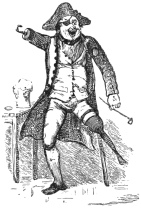
A GREENWICH PENSIONER
(From a Drawing by George Cruikshank in ‘London Characters’)
Honest tar! Shall we meet him to-morrow with another parcel tied in the same bandanna, his face screwed up with the same perplexity and anxiety to get rid of his valuable burden? You yourself, Eighty-seven, will have your confidence trick, your ring-dropper, your thimble-and-pea, your fat partridge-seller, even though the bold smuggler be no more.
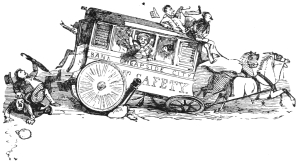
AN OMNIBUS UPSET
(From Cruikshank’s ‘Comic Almanack’)
In the matter of street music we of Thirty-seven are perhaps in advance of you of Eighty-seven. We have not, it is true, the pianoforte-organ, but we have already the other two varieties—the Rumbling Droner and the Light Tinkler. We have not yet the street nigger, or the banjo, or the band of itinerant blacks, or Christy’s Minstrels. The negro minstrel does not exist in any form. But the ingenious Mr. Rice is at this very moment studying the plantation songs of53 South Carolina, and we can already witness his humorous personation of ‘Jump, Jim Crow,’ and his pathetic ballad of ‘Lucy Neal.’ (He made his first appearance at the Adelphi as Jim Crow in 1836.) We have, like you, the Christian family in reduced circumstances, creeping slowly, hand in hand, along the streets, singing a hymn the while for the consolation it affords. They have not yet invented Moody and Sankey, and therefore they cannot sing ‘Hold the Fort’ or ‘Dare to be a Daniel,’ but there are hymns in every collection which suit the Gridler. We have also the ballad-singer, who warbles at the door of the gin-palace. His favourite song just now is ‘All round my Hat.’ We have the lady (or gentleman) who takes her (or his) place upon the kerb with a guitar, adorned with red ribbon, and sings a sentimental song, such as ‘Speed on, my Mules, for Leila waits for me,’ or ‘Gaily the Troubadour;’ there is the street seller of ballads at a penny each, a taste of which he gives the delighted listener; there are the horns of stage-coach and of54 omnibus, blown with zeal; there is the bell of the crier, exercised as religiously as that of the railway-porter; the Pandean pipes and the drum walk, not only with Punch, but also with the dancing bear. The performing dogs, the street acrobats, and the fantoccini; the noble Highlander not only stands outside the tobacconist’s, taking a pinch of snuff, but he also parades the street, blowing a most patriotic tune upon his bagpipe; the butcher serenades his young mistress with the cleaver and the bones; the Italian boy delights all the ears of those who hear with his hurdy-gurdy.
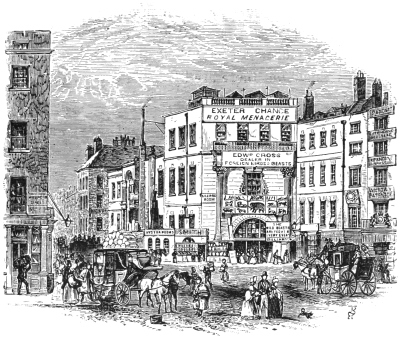
55 Here comes the Paddington omnibus, the first omnibus of all, started seven years ago by Mr. Shillibeer, the father of all those which have driven the short stages off the road, and now ply in every street. You will not fail to observe that the knifeboard has not yet been invented. There are twelve passengers inside and none out. The conductor is already remarkable for his truthfulness, his honesty, and his readiness to take up any lady and to deposit her within ten yards of wherever she wishes to be. The fare is sixpence, and you must wait for ten years before you get a twopenny ’bus.
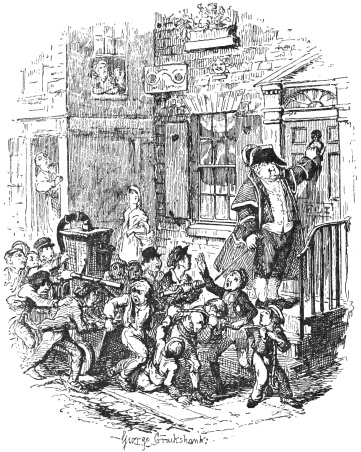
THE PARISH ENGINE
(From a Drawing by George Cruikshank in ‘Sketches by Boz’)
Now let us resume our walk. The Strand is very little altered, you think. Already Exeter Change is gone; Exeter Hall is already built; the shops are less splendid, and plate glass is as yet unknown; in Holywell Street I can show you one or two of the old signs still on the house walls; Butcher Row, behind St. Clement Danes, is pulled down and the street widened; on the north side there is standing a nest of rookeries and mean streets, where you will have your Law Courts; here is Temple Bar, which you will miss; close to Temple Bar is the little fish shop which once belonged to Mr. Crockford, the proprietor of the famous club; the street messengers standing about in their white aprons will be gone in your time; for that matter, so will the aprons; at present every other man in the street wears an apron. It is a badge of his rank and station; the apron marks the mechanic or the serving-man;56 some wear white aprons and some wear leather aprons; I am afraid you will miss the apron.
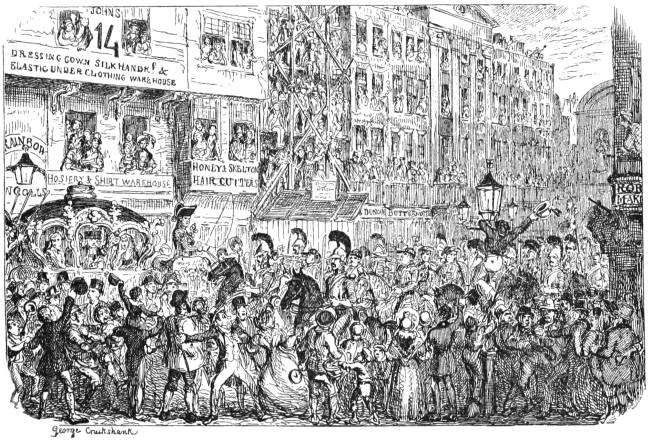
Fleet Street is much more picturesque than the Strand, is it not? Even in your day, Eighty-seven, when so many old houses will have perished, Fleet Street will still be the most picturesque street in all London.57 The true time to visit it is at four o’clock on a summer morning, when the sun has just risen on the sleeping city. Look at the gables of it, the projecting stories of it, the old timber work of it, the glory and the beauty of it. As you see Fleet Street, so Dr. Johnson saw it.
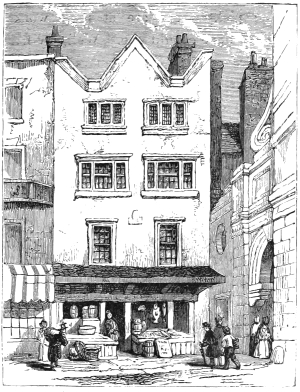
CROCKFORD’S FISH SHOP
(From a Drawing by F. W. Fairholt)
There is a good deal more crowd and animation in Fleet Street than in the Strand. That is because we are nearer the City, of course; the traffic is greater;58 the noise is much greater. As for this ring before us, let us avoid it. A coachman fighting a ticket-porter is a daily spectacle in this thoroughfare; those who crowd round often get bloody noses for their pains, and still more often come away without their purses. Look! The pickpockets are at their work almost openly. They have caught one. Well, my friend, our long silk purses—yours will be square leather things—are very easily stolen. I do not think it will repay you for the loss of yours to see a poor devil of a pickpocket pumped upon.
You are looking again at the plain windows with the small square panes. The shops make no display as yet, you see. First, it would not be safe to put valuable articles in windows protected by nothing but a little thin pane of glass—which reminds me that in the matter of street safety you will be a good deal ahead of us; next, an honest English tradesman loves to keep his best out of sight. The streets are horribly noisy. That is quite true. You have heard of the roar of the mighty city. Your London, Eighty-seven, will not know how to roar. But you can now understand what its roaring used to be. An intolerable stir and uproar, is it not? But then your ears are not, like ours, used to it. First, the road is not macadamised, or asphalted, or paved with wood. Next, the traffic of wagons, carts, and wheelbarrows, and hand-carts, is vastly greater than you had ever previously imagined; then there is a great deal more of porter work done in the street,59 and the men are perpetually jostling, quarrelling, and fighting; the coaches, those of the short stages with two horses, and the long stages with four, are always blowing their horns and cracking their whips. Look at yonder great wagon. It has come all the way from Scotland. It is piled thirty feet high with packages of all kinds: baskets hang behind, filled with all kinds of things. In front there sit a couple of Scotch lasses who have braved a three weeks’ journey from Edinburgh in order to save the expense of the coach. Brave girls! But such a wagon with such a load does not go along the street in silence. It is not in silence either that the women who carry baskets full of fish on their heads go along the street, nor is the man silent who goes with a pack-donkey loaded on either side with small coal; and the wooden sledge on which is the cask of beer, dragged along by a single horse, makes by itself as much noise as all your carriages together, Eighty-seven.
And there is nothing, you observe, for the protection and convenience of passengers who wish to cross the road. Nothing at all. No policeman stands in the middle of the road to regulate the traffic; the drivers pay no heed to the foot passengers; at the corner of Chancery Lane, where the press is the thickest, the boys and the clerks slip in and out among the horses and the wheels without hurt: but how will those ladies be able to get across? They never would but for the crossing-sweeper—the most remunerative part of the work, in fact, is to convoy the ladies across the road; if60 he magnifies the danger of this service, and expects silver for saving the lives of his trembling clients, who shall blame him?
There are still left some of the old posts which divided the footway from the roadway, though the whole is now paved and—what, Eighty-seven? You have stepped into a dandy-trap and splashed your feet. Well, perhaps, in your day they will have learned to pave more evenly, but just at present our paving is a little rough, and the stones sometimes small, so that here and there, after rain, these things will happen.
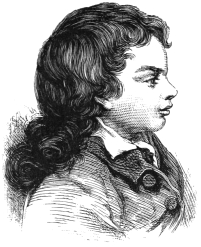
Here we are at Blackfriars. This is the Gate of Bridewell, where they used to flog women, and still flog the ’prentices. Yonder is the Fleet Prison, of which we have just read an account in the ‘Pickwick Papers.’ They have cleared away the old Fleet Market, which used to stand in the middle of the street, and they have planted it behind the houses opposite the Prison. Come and look at it. Let us tread softly over the stones of Farringdon Market, for somewhere beneath our feet lie the bones of poor young Chatterton. No monument has been erected here to his memory, nor is the spot known61 where he lies, but it is somewhere in this place, which is a tragic and mournful spot, being crammed beneath its pavement with the bones of the poor, the outcast, the broken down, the wrecks and failures of life, and littered above the pavement with the wreckage and refuse of the market. This place was formerly the burial-ground of the Shoe Lane Workhouse.
We can walk down to the Bridge and look at the river. No Embankment yet, Eighty-seven. No penny steamers, either. Yet the watermen grumble at the omnibuses which have cut into their trade.
Here comes the lamplighter, with his short ladder and his lantern.
Gas, of course, has been introduced for ever so long. They have blindly followed the old plan of lighting, and have stuck up a gas lamp wherever there used to be an oil lantern. The theatres and places of amusement are brilliant with gas, and it is gas which makes the splendour of the gin-palace. The shops took to it slowly, but they are now beginning to understand how to brighten their appearance after dark. Go into any little thoroughfare, however, and you will see the shops lit with two or three candles still.
In the small houses and the country towns the candles linger still. And such candles! For the most part they are tallow: they need constant snuffing: they drop their detestable grease everywhere—on the tablecloth, on your clothes, on the butter and on the bread. You, Eighty-seven, will be saying hard things of gas, but62 you do not know from what darkness, and misery of darkness, it saved your ancestors.
As for the churches, they are not yet generally provided with gas. There is some strange prejudice against it in the minds of the clergy. Yet it is not Papistical, or even freethinking. In most of them, where they have evening service, the pews are provided with two candles apiece, stuck in tin candlesticks, with four candles for the pulpit and four for the reading-desk. The effect is not unpleasing, but the candles continually require snuffing, and the operation is constantly attended with accidents, so that the church is always filled with the fragrance of smouldering tallow wicks. The repugnance to gas is so great, indeed, in some quarters, that one clergyman, the Rector of Holy Trinity, Marylebone, is going to commit all his vestrymen to the Ecclesiastical Courts because they have attempted to light the church with gas.
Here is a City funeral in one of the burial-grounds close to the crowded street; the clergyman reads the Service, and the mourners in their long black cloaks stand round the open grave, and the coffin is lowered into it, and outside there is no cessation at all to the bustle and the noise; the wagoner cracks his whip, the drover swears at his cattle, the busy men run to and fro as if the last rites were not being performed for one who has heard the call of the Messenger, and, perforce, obeyed it. And look—the mould in which the grave is dug is nothing but bits of bones and splinters of coffins. The63 churchyard is no longer a field of clay: it is a field of dead citizens. You, friend Eighty-seven, will manage these things better.
Here goes one of the long stages. Saw you ever a finer coach, more splendidly appointed, with better cattle? Ten miles an hour that coachman reckons upon as soon as he is clear of London. They say that in a year or two, when all the railways are opened, the stage coaches will be ruined, the horses all sold, and the English breed of horses ruined. We shall travel twenty miles an hour without stopping to change horses; the accidents will be frightful, but those who meet with none will get from London to Edinburgh in less than twenty-four hours. Next year they promise to open the London and Birmingham Railway.
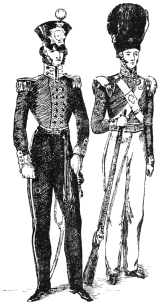
Here comes a soldier. You find his dress absurd? To be sure, his tight black stock makes his red cheeks seem swollen; his queer tall hat, with the neat red ball at the top, might be more artistic; the red shoulder roll, not the least like an epaulette, would hardly ward off a sword-cut; the coat with its swallow tail is no protection to the body or the legs; the whitened belt must64 cost an infinite amount of trouble to keep it fit for inspection, and a working-man’s breeches and stockings would be more serviceable than those long trousers. There are always brave fellows, however, ready to enlist; the soldier’s life is attractive, though the discipline is hard and the floggings are truly awful.
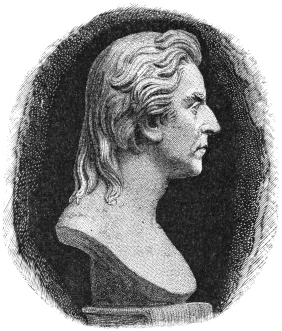
DOUGLAS JERROLD
(From the Bust by the late E. H. Bailey, R.A.)
My friend, it is half-past five, and you are tired. Let us get back to Temple Bar and dine at the Mitre, where we can take our cut off the joint for eighteen-pence. About this time most men are thinking of dinner. Buy an evening paper of the boy.
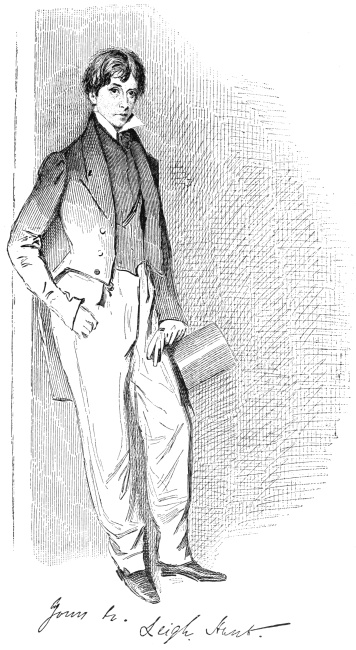
Leigh Hunt.
-LEIGH HUNT-
65 So: this is cosy. A newly sanded floor, a bright fire, and a goodly company. James! a clean tablecloth, a couple of candles, and the snuffers, and the last joint up. What have you got in the paper? Madagascar Embassy, Massacre in New Zealand—where the devil is New Zealand?—Suicide of Champion, who made the infernal machine, Great Distress in the Highlands, Murder of a Process-server in Ireland, Crossing of the Channel in a Balloon—I hope that some day an army may not cross it—Letter from Syria, concerning the recent Great Earthquake, Conduct of the British Legion in Spain, Seven Men imprisoned for unlawfully ringing the Bells, Death of the Oldest Woman in the World, aged 162 years, said to have been the Nurse of George Washington—a good deal of news all for one evening paper. Hush! we are in luck. Here is Douglas Jerrold. Now we shall hear something good. Here is Leigh Hunt, and here is Forster, and here—ah! this is unexpected—here comes none other than ‘Boz’ himself. Of course you know his name? It is Charles Dickens. Saw one ever a brighter eye or a more self-reliant66 bearing? Such self-reliance belongs to those who are about to succeed. They say his fortune is already made, though but yesterday he was a reporter in the House, taking down the speeches in shorthand. Who is that tall young man with the ugly nose? Only a journalist. They say he wrote that funny paper called ‘The Fatal Boots’ in Tilt’s Annual. His name is Thackeray, I believe, but I know nothing more about him.
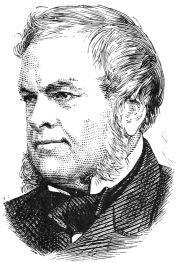
JOHN FORSTER
(From a Photograph by Elliott and Fry)
Here comes dinner, with a tankard of foaming stout. Is there any other drink quite so good as stout? After you have taken your dinner, friend Eighty-seven, I shall prescribe for you what you will never get, poor wretch—a bottle of the best port in the cellars of the Mitre.
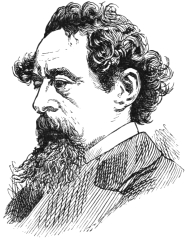
My friend, there is one thing in which we of the Thirties do greatly excel you of the Eighties. We can eat like ploughboys, and we can drink like draymen. As for your nonsense about Apollinaris Water, we do not know what it means; and as for your not being able to take a simple glass of port, we do not in the least understand it. Not take a pint of port? Man alive! we can take two bottles, and never turn a hair.
67
CHAPTER V.
WITH THE PEOPLE.
When the real history of the people comes to be written—which will be the History, not of the Higher, but of the Lower Forms of Civilisation—it will be found that, as regards the people of these islands, they sank to their lowest point of degradation and corruption in the middle of the eighteenth century—a period when they had no religion, no morality, no education, and no knowledge, and when they were devoured by two dreadful diseases, and were prematurely killed by their excessive drinking of gin. No virtue at all seems to have survived among all the many virtues attributed to our race except a bulldog courage and tenacity. There are glimpses here and there, when some essayist or novelist lifts the veil, which show conditions of existence so shocking that one asks in amazement how there could have been any cheerfulness in the civilised part of the community for thinking of the terrible creatures in the ranks below. They did not think of them; they did not know of them; to us it seems as if the roaring of that volcano must have been always in their ears, and the smoke of it68 always choking their throats. But our people saw and heard nothing. Across the Channel, where men’s eyes were quicker to see, the danger was clearly discerned, and the eruption foretold. Here, no one saw anything, or feared anything.
How this country got through without a revolution, how it escaped the dangers of that mob, are questions more difficult to answer than the one which continually occupies historians—How Great Britain, single-handed, fought against the conqueror of the world. Both victories were mainly achieved, I believe, by the might and majesty of Father Stick.
He is dead now, and will rule no more in this country. But all through the last century, and well into this, he was more than a king—he was a despot, relentless, terrible. He stripped women to the waist and whipped them at Bridewell; he caught the ’prentices and flogged them soundly; he lashed the criminal at the cart-tail; he lashed the slaves in the plantations, the soldiers in the army, the sailors on board the ships, and the boys at school. He kept everybody in order, and, truly, if the old violence were to return, we might have to call in Father Stick again.
He was good up to a certain point, beyond which he could not go. He could threaten, ‘If you do this, and this, you shall be trounced.’ Thus the way of transgressors was made visibly hard for them. But he could not educate—he taught nothing except obedience to the law; he had neither religion nor morals; therefore,69 though he kept the people in order, he did not advance them. On the other hand, under his rule they were left entirely to themselves, and so they grew worse and worse, more thirsty of gin, more brutal, more ignorant. So that, in the long run, I suppose there was not under the light of the sun a more depraved and degraded race than that which peopled the lowest levels of our great towns. There is always in every great town a big lump of lawlessness, idleness, and hostility to order. The danger, a hundred years ago, was that this lump was getting every day bigger, and threatening to include the whole of the working class.
Remember that as yet the government of this realm was wholly in the hands of the wealthier sort. Only those who had what was humorously called a stake in the country were allowed to share in ruling it. Those who brought to the service of their native land only their hands and their lives, their courage, their patience, skill, endurance, and obedience, were supposed to have no stake in the country. The workers, who contribute the whole that makes the prosperity of the country, were then excluded from any share in managing it.
It seems to me that the first improvement of the People dates from their perception of the fact that all have a right to help in managing their own affairs; I think one might prove that the ideas of the French Revolution, when they were once grasped, arrested the downward course of the People—the first step to dignity and self-respect was to understand that they might70 become free men, and not remain like unto slaves who are ordered and have to obey. Then they began to struggle for their rights, and in the struggle learned a thousand lessons which have stood them in good stead. They learned to combine, to act together, to form committees and councils; they learned the art of oratory, and the arts of persuasion by speech and pen; they learned the power of knowledge—in a word, the long struggle whose first great victory was the Reform Act of 1832 taught the People the art of self-government.
Fifty years ago, though that Act had been passed, the great mass of the people were still outside the government. They were governed by a class who desired, on the whole, to be just, and wished well to the people, provided their own interests were not disturbed, as when the most philanthropic manufacturers loudly cried out as soon as it was proposed to restrict the hours of labour. It is not wonderful, therefore, that the working classes should at that time regard all governments with hostility, and Religion and Laws as chiefly intended to repress the workers and to safeguard the interests of landlords and capitalists. This fact is abundantly clear from the literature which the working men of 1837 delighted to read.
As regards their religion, there was already an immense advance in the spread of the Nonconformist sects and the multiplication of chapels. As for the churches, I am very certain that the working man does not go much to church even yet, but fifty years ago he attended service71 still less often. A contemporary who pretends to know asserts that nine out of ten among the working men were professed infidels, whose favourite reading was Paine, Carlile, and Robert Taylor, the author of ‘The Devil’s Chaplain.’ Further, he declares that not one working man in a hundred ever opened a Bible.
I refrain from dwelling upon this state of things as compared with that of the present, but it appears from a census taken by a recent weekly newspaper (which, however, omitted the mission churches and services in school-rooms and other places) that about one person in nine now attends church or chapel on a Sunday.
As regards drink, a question almost as delicate as that of religion, it is reported that in London alone three millions of pounds were spent every year in gin, which seems a good deal of money to throw away with nothing to show for it. But figures are always misleading. Thus, if everybody drank his fair share of this three millions, there would be only a single glass of gin every other day for every person; and if half the people did not drink at all, there would be only one glass of gin a day for those who did. Still, we must admit that three millions is a sum which shows a widespread love of gin. As for rum, brandy, and Hollands, the various forms of malt liquor, fancy drinks, and compounds, let us reserve ourselves for the chapter on Taverns. Suffice it here to call attention to the fact that there was no blue ribbon worn. Teetotallers there were, it is true, but in very small numbers; they were not yet a power in the72 land; there was none of the everlasting dinning about the plague spot, the national vice, and the curse of the age, to which we are now accustomed. Honest men indulged in a bout without subsequent remorse, and so long as the drink was unadulterated they did themselves little harm. Without doubt, if the men had become teetotallers, there would have been very much more to spend in the homes, and the employers would, also without doubt, have made every effort to reduce the wages accordingly, so as to keep up the old poverty. That is what the former school of philosophers called a Law of Political Economy. The wages of a skilled mechanic fifty years ago seem to have never risen above thirty shillings a week, while food, clothes, and necessaries were certainly much dearer than at present. He had savings banks, and he sometimes put something by, but not nearly so much as he can do now if he is thrifty and in regular work. It is quite clear that he was less thrifty in those days than now, that he drank more, and that he was even more reckless, if that is possible, about marriage and the multiplication of children.
As for the material condition of the people, there cannot be a doubt that it has been amazingly improved within the last fifty years. It is not true, as stated in a very well known work, that the poor have become poorer, though the rich have certainly become richer. The skilled working man is better paid now than then, his work is more steady, his hours are shorter. He is better clad, with always a suit of clothes apart from73 his working dress; he is better taught; he is better mannered; he has holidays; he has clubs; he is no longer forbidden to combine; he can co-operate; he holds meetings; he has much better newspapers to read; his food is better and cheaper; he has model lodging houses. Not only is he actually better; he is relatively better compared with the richer classes, while for the last ten years these have been growing poorer every day, although still much richer than they were fifty years ago. Moreover, it is becoming more difficult in every line, owing to the upward pressure of labour, to become rich.
His amusements no longer have the same brutality which used to characterise them. The Ring was his chief delight, and a well-fought battle between two accomplished bruisers caused his heart to leap with joy. Unhappily the Ring fell, not because the national sentiment concerning pugilism changed, but by its own vices, and because nearly every fight was a fight on the cross; so that betting on your man was no longer possible, and every victory was arranged beforehand. There are now signs of its revival, and if it can be in any way regulated it will be a very good thing for the country. Then there was dog-fighting, which is still carried on in certain parts of the country. Only a few years ago I saw a dozen dog-fights, each with its ring of eager lookers-on, one Sunday morning upon the sands between Redcar and Saltburn. All round London, again, there were ponds, quantities of ponds, all marked74 in the maps of the period and now all filled up and built over. Some, for instance, were in the fields on the east side of Tottenham Court Road. Hither, on Sundays, came the London working man with ducks, cats, and dogs, and proceeded to enjoy himself with cat-hunts and duck-hunts in these ponds. There were also bull-and-bear-baitings and badger-drawings. As for the fairs, Bartholomew and Greenwich, one is sorry that they had to be abolished, but I suppose that London had long been too big for a fair, which may be crowded but must not be mobbed. A real old fair, with rows of stalls crammed with all kinds of things which looked ever so much prettier under the flaring lamps than in the shops, with Richardson’s Theatre, the Wild Beast Show, the wrestlers and the cudgel-players, the boxers, with or without the gloves, the dwarfs, giants, fat women, bearded women, and monsters, was a truly delightful thing to the rustics in the country; but in London it was incongruous, and even in Arcadia a modern fair is apt to lose its picturesque aspect towards nightfall. On the whole, it is just as well for London that it has lost its ancient fairs.
It is not in connection with working men, but with the whole people, that one speaks of prisons. I do not think that our prison system at the present day is every thing that it might be. There have been one or two books published of late years, which make one uncomfortable in thinking of the poor wretches immured in these abodes of solitary suffering. Still, if one has to choose75 between a lonely cell and the society of the prison birds by day and night, one would prefer the former. Some attempts had been made in Newgate and elsewhere to prevent the prisoners from corrupting each other, but with small success. Those who were tried and sentenced were separated from those who were waiting their trial; the boys were separated from the men, the girls from the women. Yet the results of being committed to prison, for however short a period, were destructive of all morals and the last shred of principle. Not a single girl or woman who went into prison modest and virtuous but became straightway ashamed of her modesty and virtue, and came out of the prison already an abandoned woman. Not a man or boy who associated with the prisoners for a week but became a past master in all kinds of wickedness. In the night rooms they used to lock up fifteen or twenty prisoners together, and leave them there all night to interchange their experiences—and what experiences! Only those who were under sentence of death had separate cells. These poor wretches were put into narrow and dark rooms, receiving light only from the court in which the criminals are permitted to walk during the day. They slept on a mat, and in former days had but twenty-four hours between sentence and execution, with bread and water for all their food.
Transportation still went on, with the horrors of the convict ship, the convict hulks, and the convict establishments of New South Wales and Tasmania. The76 ‘horrors’ of the system have always seemed to me as forming an unessential part of the system. With better management on modern ideas, transportation should be far better than the present system of hopeless punishment by long periods of imprisonment. We can never return to transportation as far as any colony is concerned, but I venture to prophesy that the next change of the penal laws will be the re-establishment of transportation with the prospect of release, a gift of land, and a better chance for an honest life.
Meantime the following lines belong to Fifty Years Ago. They are the Farewell of convicts about to sail for Botany Bay:

And Ned, the primest ruffling cove that ever nail’d a swell—
To share the swag, or chaff the gab, we’ll never meet again,
The hulks is now my bowsing crib, the hold my dossing ken.
Don’t nab the bib, my Bet, this chance must happen soon or later,
For certain sure it is that transportation comes by natur;
His lordship’s self, upon the bench, so downie his white wig in,
Might sail with me, if friends had he to bring him up to priggin;
And is it not unkimmon fly in them as rules the nation,
To make us end, with Botany, our public edication?
But Sal, so kind, be sure you mind the beaks don’t catch you tripping,
You’ll find it hard to be for shopping sent on board the shipping:
So tip your mauns afore we parts, don’t blear your eyes and nose,
Another grip, my jolly hearts—here’s luck, and off we goes!
Debtors’ prisons were in full swing. There were Whitecross Street Prison, built in 1813 for the exclusive reception of debtors, who were before this crowded together with criminals at Newgate; Queen’s Bench Prison, the Fleet, and the Marshalsea. The King’s Bench Prison was the largest, and, so to speak, the most fashionable of these prisons. Both at the King’s Bench and the Fleet debtors were allowed to purchase what were called the ‘Rules,’ which enabled them to live within a certain area outside the prison, and practically left them free. They paid a certain percentage on their78 debts. This practice enabled the debtor to refuse paying his debts, and to save his money for himself or his heirs. Lodgings, however, within the Rules were bad and expensive.
77
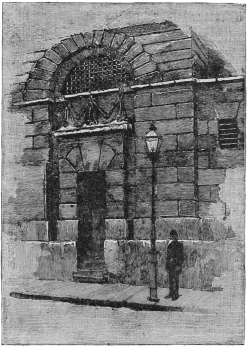
There was no national compulsory system of education; yet the children of respectable working men were sent to school. The children of the very poor, those who lived from hand to mouth by day jobs, by chance and luck, were not taught anything. If you talk to a working man of sixty or thereabouts, you will most likely discover that he can read, though he has very often forgotten how to write. He was taught when he was a child at the schools of the National Society, or at those of the British and Foreign Society, or at the parish schools, of which there were a great many. There were also many thousands of children who went to the Sunday School. Yet, partly through the neglect of parents, and partly through the demand for children’s labour in the factories, nearly a half of the children in the country grew up without any schooling. In 1837 there were forty per cent. of the men and sixty-five per cent. of the women who could not sign their own names.
And there were already effected, or just about to be effected, three immense reforms, the like of which the nation had never seen before, which are together working for a Revolution of Peace, not of war, greater than contemplated by the most sincere and most disinterested of the French Revolutionaries.
The first was the Reform of the Penal Laws.
79 In the beginning of the century the law recognised 223 capital offences. A man might be hanged for almost anything: if he appeared in disguise on a public road; if he cut down young trees; if he shot rabbits; if he poached at night; if he stole anything worth five shillings from a person or a shop; if he came back from transportation before his time; a gipsy, if he remained in the same place a year. In fact, the chief desire of the Government was to get rid of the criminal classes by hanging them. It was Sir Samuel Romilly, as everybody knows, who first began to attack this bloodthirsty code. He was assisted by the growth of public opinion and by the juries, who practically repealed the laws by refusing to convict.
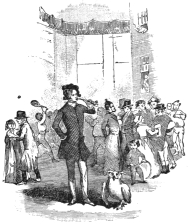
It was not, again, until the year 1836 that counsel for a prisoner under trial for felony was permitted to address the jury. In the year 1834, there were 480 death sentences; in 1838, only 116. In 1834, 894 persons were sentenced to transportation for life, and in 1838 only 266. Remember that this wicked severity only served to enlist the sympathies of the people against the Government.
80 The second great step was the repeal of the Acts which forbade combination. Until the year 1820, the people had been forbidden to combine. Their only power against employers who worked them as many hours a day as they dared, and paid them wages as small as they could, who took their children and locked them up in unwholesome factories, was in combination, and they were forbidden to combine. When the law—an old mediæval law—was repealed, it was found that any attempt to hold public meetings might be put down by force; so that, though they could not combine, the chief means of promoting combination was taken from them.
The third great step was the Extension of the Suffrage, so that now there is no Briton or Irishman but can, if he please, have his vote in the government of the nation. It is not a great share which is conferred by one vote, but it enables every man to feel that he is himself a part of the nation; that the government is not imposed upon him, but elected and approved by himself.
Considering all these things, have we any reason to be surprised when we learn that, on the Queen’s Accession, there was among the people no loyalty whatever? Attachment to the Sovereign, personal devotion to the young Queen, rallying round the Throne—all these things were not even phrases to the working class. For they never heard them used.
There was no loyalty at all, either to the Queen, or to81 the institution of a limited Monarchy, or to the Constitution, or to the Church.
For a hundred and fifty years there had been no loyalty among the people. Loyalty left the country with James II. Not one of the Sovereigns who followed him commanded the personal enthusiasm of the people, not even Farmer George, for whom there had been some kind of affection with something of contempt. From 1687 until 1837, which is exactly one hundred and fifty years, not one Sovereign who sat upon the Throne of England could boast that he had the love of the people. Not one wished to have the love of the people. He represented a principle: he governed with the assistance of a few families and by the votes of a small class. As King he was a stranger. When he drove through the streets, the people hurrahed; but they did not know him, and they cared nothing for him.
Therefore the sentiment of loyalty had to be re-born. It could only be awakened by a woman, young, virtuous, naturally amiable, and resolved on ruling by constitutional methods. Yet in some of the journals written for, and read by, the working men, the things said concerning the Queen, the Prince Consort, and the Court were simply horrible and disgusting. Such things are no longer said. There are still papers which speak of the aristocracy as a collection of titled profligates, and of the clergy as a crowd of pampered hypocrites, but of the Queen it is rare indeed to find mention other than is respectful. Her life and example for fifty years82 have silenced the slanderers. It has been found once more possible for a Sovereign to possess the love of her people.
The papers read by the working men were not only scurrilous, but they were Republican and revolutionary. The Republic whose example they set before themselves was not the American, which is Conservative, for of this they knew nothing. Let us clearly understand this. Fifty years ago America was far more widely separated from England than is China now. The ideal Republic was then the earlier form of the first French Republic. These people cared little for the massacres which accompanied the application of Republican principles. I do not say that they wished to set the heads of the Queen’s Ladies-in-Waiting on pikes, but they thought the massacres of innocent women by the French an accident rather than a consequence. They loved the cry of ‘Liberty, Equality, and Fraternity,’ and still believed in it. They dreamed of a country which they thought could be established by law, in which every man was to be the equal of his neighbour—as clever, as skilful, as capable, as rich, and as happy. The dream continues, and will always continue, to exist. It is a generous dream—there never has been a nobler dream—so that it is a thousand pities that human greed, selfishness, ambition, and masterfulness will not suffer the dream to be realised. Those who advocated an attempt to realise it flung hard names at the Crown, the Court, the aristocracy, the Church, the educated, and the wealthy.83 Presently they began to formulate the way by which they thought to place themselves within reach of their object. The way was Chartism. They wanted to carry six measures—Universal Suffrage, Annual Parliaments, Vote by Ballot, Abolition of Property Qualification, Payment of Members, and Equal Electoral Districts. Very well; we have got, practically, four out of the six points, and there are many who think that we are as far off the Millennium as ever. Yet there are, however, still among us people who believe that we can be made happy, just, merciful, and disinterested by changing the machinery. Changing the machinery! The old party of Radicals still work themselves into a white heat by crying for change in the machinery.
And now a thing which was never contemplated even by the Chartists themselves—the really important thing—has been acquired by the people. They are no longer the governed, but the governors. The Government is no longer a thing apart from themselves, and outside them. It is their own—it is the Government of the People of England. If there is anything in it which they do not like, they can alter it; if there is anything they agree to abolish, they can abolish it, whether it be Church, Crown, Lords, wealth, education, science, art—anything. They may destroy what they please: they may reduce the English to an illiterate peasantry if they please.
They will not please. I, for one, have the greatest84 confidence in the justice, the common-sense, and the Conservatism of the English and the Scotch. The people do not, as yet, half understand their own power; while they are gradually growing to comprehend it, they will be learning the history of their country, the duties and responsibilities of citizenship, the dangers of revolution, and the advantages of those old institutions by whose aid the whole world has been covered with those who speak the Anglo-Saxon speech and are governed by the English law.
My friends, we are changed indeed. Fifty years ago we were, as I have said, still in the eighteenth century. The people had no power, no knowledge, no voice; they were the slaves of their employers; they were brutish and ill-conditioned, ready to rebel against their rulers, but not knowing how; chafing under laws which they did not make, and restraints which kept them from acting together, or from meeting to ask if things must always continue so. We are changed indeed.
We now stand upright; our faces are full of hope, though we are oppressed by doubts and questions, because we know not which path, of the many before us, will be the wisest; the future is all our own; we are no longer the servants; we are the Masters, the absolute Rulers, of the greatest Empire that the world has ever seen.
God grant that we govern it with wisdom!
85
CHAPTER VI.
WITH THE MIDDLE-CLASS.
The great middle-class—supposed, before the advent of Mr. Matthew Arnold, to possess all the virtues; to be the backbone, stay, and prop of the country—must have a chapter to itself.
In the first place, the middle-class was far more a class apart than it is at present. In no sense did it belong to society. Men in professions of any kind, except the two services, could only belong to society by right of birth and family connections; men in trade—bankers were still accounted tradesmen—could not possibly belong to society. That is to say, if they went to live in the country they were not called upon by the county families, and in town they were not admitted by the men into their clubs, or by ladies into their houses. Those circles, of which there are now so many—artistic, æsthetic, literary—all of them considering themselves to belong to society, were then out of society altogether; nor did they overlap and intersect each other. The middle-class knew its own place, respected itself, made its own society for itself, and86 cheerfully accorded to rank its reverence due. The annals of the poor are meagre; only here and there one gets a glimpse into their lives. But the middle-class is much better known, because it has had prophets; nearly all the poets, novelists, essayists, journalists, and artists have sprung from it. Those who adorned the Thirties and the Forties—Hood, Hook, Galt, Dickens, Albert Smith, Thackeray—all belonged to it; George Eliot, whose country towns are those of the Thirties and the Forties, was essentially a woman of the middle-class.
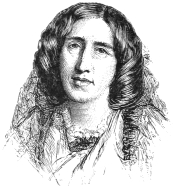
GEORGE ELIOT
(Taken from the Drawing in ‘The Graphic’ by permission)
Middle-class life—especially in the country—was dull, far, far duller than modern life even in the quietest country town. The men had their business; the women had the house. Incomes ran small; a great deal was done at home that is now done out of it. There was a weekly washing-day, when the house steamed with hot soap-suds, and the ‘lines’ were out upon the poles—they were painted green and were square—and on the lines hung half the family linen. All the jam was made at home; the cakes, the pies, and the puddings, by the wife and daughters; the bread was home-made; the beer was home-brewed (and better beer than good home-brewed no man need87 desire); all those garments which are not worn outside were made at home. Everybody dined in the middle of the day. Therefore, in the society of the country town dinner-parties did not exist. On the other hand, there were sociable evenings, which began with a sit-down tea, with muffins and tea-cakes, very delightful, and ended with a hot supper. Tobacco was not admitted in any shape except that of snuff into the better kind of middle-class house; only working men smoked vulgar pipes; the Sabbath was respected; there was no theatre nearer than the county town; the girls had probably never seen a play; every man who respected himself ‘laid down’ port, but there was little drinking of wine except on Sunday afternoons; no one, not even the ladies, scorned the glass of something warm, with a spoon in it, after supper. For the young there was a fair once a year; now and then a travelling circus came along; there was a lecture occasionally on an instructive subject, such as chemistry, or astronomy, or sculpture; there were picnics, but these were rare; if there were show places in the neighbourhood, parties were made to them, and tea was festively taken among the ruins of the Abbey.
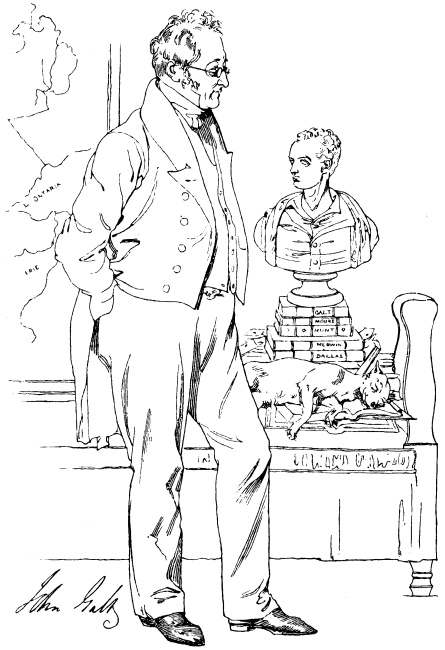
John Galt
-JOHN GALT-
Fashion descends slowly; it is now the working man who takes his wife into the country for tea: fifty years ago he took his wife nowhere, and scorned tea. Open-air games and sports there were none; no lawn-tennis, Badminton, or anything of that kind in those days; even croquet, which is now so far lost in the88 mists of antiquity that men of thirty are too young to remember the rage for it, was actually not yet invented. Archery certainly existed, and the comic writers are always drawing pictures of the young ladies sticking their arrows into the legs of people a hundred feet or so wide of the target. But archery belonged to a class rather above that which we are now considering. There was not much sketching and painting. There was no amateur photography; there was no catching of strange creatures in ponds for the aquarium—a fashion also now happily extinct; there was not, in fact, any single pursuit, amusement, or game which would bring young people together in the open air. There was no travelling; the summer holiday had not yet got down in the country. In London, to be sure, everybody down to Bevis Marks and Simmery Axe went out of town and to the seaside in July or August; but in the country nobody thought of such a thing; not the vicar’s daughters, not the solicitor’s wife, not the family of the general practitioner; the very schoolmaster, who got his four weeks in the summer and his three at Christmas, spent them at home in such joy as accompanies rest from labour. With no outdoor amusements, and with no summer holiday, how much is life simplified! But the simplicity of life means monotony—faciunt vitam, balnea, vina, Venus.
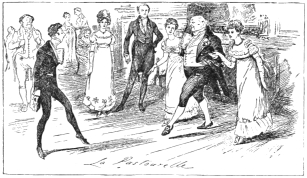
In the winter, things were somewhat different. In some towns there was the county ball. At this function one had the pleasure of gazing upon ladies and89 gentlemen of the highest rank and fashion, and of observing that they kept to themselves like a Hindu caste, danced with each other at the upper end of the room, cast disparaging glances at the dresses of the ladies of the lower end, and sniffed at their manner and appearance. This was true joy. There were also occasional dances at home, but these were rare, because people had not learned how to meet and dance without making a fuss over it, taking up carpets, putting candles in tin sconces, keeping late hours, and having a supper, the preparation of which was mainly done by the ladies of the house, and it nearly killed them, and drove the servants—the genteel middle-class family often got along with only one—to give notice. I think that the dances which had gone out in London still lingered in the country. There were, for instance, the Caledonians as well as the Lancers; there were country dances without end, the very names of which are now lost; the gentlemen performed the proper steps with grace and90 agility, while the ladies were careful to preserve an attitude supposed the only one possible for a lady while dancing, in which the figure was bent forward, the face was turned up with the chin stuck out, while the hands were occupied in holding up the dress to the regulation height. The elders, meanwhile, played long whist at tables lit by candles which wanted snuffing between the deals. The bashful youth of the party was always covering himself with shame by his clumsiness in snuffing out the candles, or, even if he succeeded in taking off the red-hot ball of burnt thread, he too often neglected to close the instrument with which he effected the operation, and thereby mightily offended the nostrils of the company. When there was no dancing the younger members began with a ‘little music.’ Their songs—how faded and stale they seem now if one tries to sing them!—turned chiefly on the affections, and the favourite poet was Felicia Hemans. After the little music they sat down to a round game, of which there were a great many, such as Commerce, Speculation, Vingt-et-Un, Limited Loo, or Pope Joan. The last was played with a board. I remember the board—it was a round thing, lacquered, and like a punch-bowl, but I think with divisions; as for the game itself, and what was done with the board, I quite forget, but both game and bowl lasted quite into the Fifties. Are there any country circles now where they still play Pope Joan with mother-o’-pearl counters, and after the game have a grand settlement, and exchange91 the counters for silver and copper, some with chuckles, and others with outward smiles but inward rage?
People were extremely punctilious on the subject of calls—one remembers the call in the ‘Mill on the Floss.’ The call was due at regular intervals, so that even the day should almost be known on which it was paid or returned. It was a ceremonial which necessitated a great deal of ritual and make-believe. No one, for instance, was to be surprised in doing any kind of work. There was a fiction in genteel families that the ladies of the house never did anything serious or serviceable after dinner; the afternoon was supposed to be devoted either to walking, or to making calls, or to elegant trifling at home. Therefore, if the girls were at the moment engaged upon any useful work—many of them, poor things, never did anything but useful work—they crammed it under the sofa, and pretended to be reading a book, or painting, or knitting, or to be engaged in easy and fashionable conversation. Why they went through this elaborate pretence I have not the least idea, because everybody knew that every girl in the place was always making, mending, cutting-out, basting, gusseting, trimming, turning, and contriving. How do you suppose that the solicitor’s daughters made so brave a show on Sundays if they were not clever enough to make up things for themselves? Everybody, of course, knew it, and why the girls would not own up at once one cannot now understand. Perhaps it was a sort of suspicion, or a faint hope, or a wild dream,92 that a reputation for ladylike uselessness might enable them to cross the line at the County Ball, and mingle with the county people.
Are there still any circles of society in which, if a lady with her daughters calls upon another lady with her daughters, the decanters, biscuits, and glasses are placed upon the table, and the visitors are asked whether they will take port or sherry? This, fifty years ago, was always done in country towns, and the visitors always took a glass of port or sherry. In some houses it was not port and sherry that were placed upon the table, but ‘red’ and ‘white.’ I do not know whether the red was currant or raspberry, but I think that the white was generally cowslip. When the visitors were gone, the ladies got out their work again, threaded their needles, and spent an enjoyable hour or two in discussing the appearance, the dress, the manners, and the resources of their visitors. But the visit did them good, because it compelled company manners, which are always good for girls, and it dragged them a little out of themselves. They were too much en famille, these girls; they were never separated from each other. The boys got out to school or to business all day; but the poor girls were always together. Side by side they did their household duties, side by side they sewed and dressmaked, side by side they walked, side by side they prayed in the church, side by side they slept. Small chance of happiness was theirs—happiness is a separate, distinct, individual kind of thing, in which one can consult93 one’s own likes—until, in the fulness of time, there came along the lover—a humdrum, commonplace kind of lover, I dare say, but his sweetheart was as commonplace as himself—and she exchanged a house, where she was a better kind of servant, for one of exactly the same sort, in which she was the mistress. And when one says mistress, it must be remembered that man was, in those days, much more of a master in the house than he is now allowed to be. I speak not at random, but from the evidence of those who remember and from study of the literature, both that written by the men and that by the women. I am certain that the husband, unless he was hen-pecked—a pleasing word, now seldom used—was always the Master and generally the Tyrant in the house.
Let me, with some diffidence, approach the subject of the Church in the country town. I never truly understood the Church of fifty years ago until, in the autumn of 1885, I perambulated with one who is jealous for Church architecture and Church antiquities the north-east corner of Norfolk, where there are many churches, and most of them are fine. In our pilgrimage among these monuments we presently came upon one at the aspect of which we were fain to sit down and weep. It was, externally, an old and venerable structure, which might have been made beautiful within. Plaster covered the walls, and hid the columns; the interior of the church was crowded with high pews, painted white, and having along the top a sham mahogany kind of94 hand-rail; the chancel was encumbered with these enclosures, which hid the old brass-work; that which belonged to the Squire was provided with red curtains on brass rods to keep the common people from gazing at the Quality. The reading-desk, pulpit, and altar were covered with a cloth which had been red, but had long before faded away into an indescribably shabby brown. The pulpit was not part of the old three-decker, but was stuck into the wall; the windows had lost their old tracery; the painted glass was gone; the roof was a flat whitewashed ceiling. The church, to eyes accustomed to better things, presented a deplorable appearance. My friend, pointing solemnly to the general shabbiness, remarked, ‘Donec templa refeceris.’ It was the motto of the journal started early in the Forties by a small knot of Cambridge men—among whom was Mr. Beresford Hope, now, alas! no more—who desired to raise and beautify public worship in the Anglican faith, and also, I believe, to assert and insist upon certain points of doctrine. And they clearly perceived that, while the churches remained in their neglected condition, and church architecture was at its then low ebb, their doctrine was impossible. How far they have succeeded not only the Ritualists themselves proclaim, but also every other party in the Church, and even the Nonconformists, who have shared in the increased beauty and fitness of public worship.
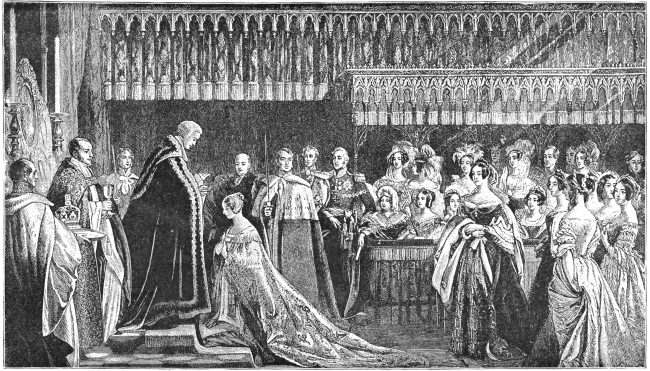
THE QUEEN RECEIVING THE SACRAMENT AFTER HER CORONATION—WESTMINSTER ABBEY, JUNE 29, 1838.
(From the Picture by C. R. Leslie, R.A., at Windsor Castle.)
He who can remember the ordinary Church Services in the early Fifties very well knows what they were in95 the Thirties, except that in the latter there were still some venerable divines who wore a wig.
The musical part of the service was, to begin with, taken slow—incredibly slow; no one now would, who is not old enough to remember, believe how slow it was. The voluntary at the beginning was a slow rumble; the Psalms were very slowly read by the clergyman and the clerk alternately, the Gloria alone being sung, also to a slow rumble. The choir was generally stationed in the organ loft, which has been known to be built over the altar at the east end—as at St. Mary’s, Cambridge—but was generally at the west end. It was not a choir of boys and men only, but of women and men. The ‘Te Deum’ was always ‘Jackson’—from my youth up have I loathed ‘Jackson’; there was just one lively bit in it for which one looked and waited; but it lasted a very few bars; and then the thing dragged on more slowly than ever till it came to the welcome words, ‘Let me never be confounded.’ Two hymns were sung—very slowly; they were always of the kind which expressed either the despair of the sinner or the doubtful joy of the believer. I say doubtful, because he was constantly being warned not to be too confident, not to mistake a vague hope for the assurance of election, and because, with the rest of the congregation, he was always being told how few in number were those elect, and how extremely unlikely that there could be many of those few in that one flock. Read any of the theological literature of the96 period, and mark the gulf that lies between us and our fathers. There were many kinds of preachers, just as at present—the eloquent, the high and dry, the low and threatening, the forcible-feeble, the florid, the prosy, the scholarly—but they all seemed to preach the same doctrine of hopelessness, the same Gospel of Despair, the same Father of all Cruelty, the same Son who could at best help only a few; and when any of the congregation dared to speak the truth, which was seldom, these blasphemous persons whispered that it was best to live and enjoy the present, and to leave off trying to save their souls against such fearful odds, and with the knowledge that if they were going to be saved it would be by election and by no merit or effort of their own, while, if the contrary was going to happen, it was no use striving against fate. Wretched, miserable creed! To think that unto this was brought the Divine Message of the Son of Man! And to think of the despairing deathbeds of the careless, the lifelong terror of the most religious, and the agony of the survivors over the death of one ‘cut off in his sins’!
What we now call the ‘life’ of the Church, with its meetings, committees, fraternities, guilds, societies, and organisations, then simply did not exist. The clergyman had an easy time; he visited little, he had an Evening Service once a week, he did not pretend to keep saints’ days and minor festivals and fasts—none of his congregation expected him to keep them; as for his being a teetotaller for the sake of the weaker brethren,97 that would have seemed to everybody pure foolishness, as, indeed, it is, only people now run to the opposite belief; yet he was a good man, for the most part, who lived a quiet and exemplary life, and a good scholar—scholars are, indeed, sadly to seek among the modern clergy—a sound theologian, a judge of good port, and a gentleman. But processions, banners, surpliced choirs, robes, and the like, he would have regarded as unworthy the consideration of one who was a Churchman, a Protestant, and a scholar.
To complete this brief study of the Church fifty years ago, let us remark that out of 11,500 livings which it possessed, 3,000 were under 100l. and 1,000 under 60l. a year, that there were 6,080 pluralists and 2,100 non-residents, that the Dissenters had only been allowed to marry in their own chapels and by their own clergy in the year 1831, that they were not admitted, as Dissenters, to the Universities, and that the incomes of some of the Bishops were enormous.
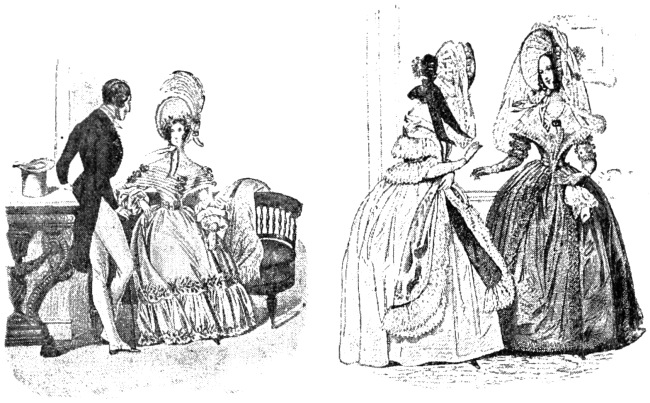
FASHIONS FOR AUGUST, 1836
FASHIONS FOR MARCH, 1837
As for Art, in the house or out of it, Art in pictures, sculpture, architecture, dress, furniture, fiction, oratory, acting, the middle-class person, the resident in the country town, knew nothing of it. His church was most likely a barn, his own house was four-square, his furniture was mahogany, his pictures were coloured engravings, the ornaments of his rooms were hideous things in china, painted red and white, his hangings were of a warm and comfortable red, his sofas were horsehair, his drawing-room was furnished with a round98 table, on which lay keepsakes and forget-me-nots; but as the family never used the room, which was generally kept locked, it mattered little how it was furnished. He dressed, if he was an elderly gentleman, in a spencer, buttoned tight, a high black satin stock, and boots up to his knees—very likely he still carried his hair in a tail. If he was young, he had long and flowing hair, waved and curled with the aid of pomade, bear’s grease, and oil; he cultivated whiskers, also curled and oiled all round his face; he wore a magnificent stock, with a liberal kind of knot in the front: in this he stuck a great pin; and he was magnificent in waistcoats. As for the ladies’ dresses, I cannot trust myself to describe them; the accompanying illustration will be of service in bringing the fashion home to the reader. But this is the effigy of a London and a fashionable lady. Her99 country cousin would be two or three years, at least, behind her. Well, the girls had blooming cheeks, bright eyes, and simple manners. They were much more retiring than the modern maiden; they knew very little of young men and their manners, and the young men knew very little of them—the novels of the time are full of the shyness of the young man in presence of the maiden. Their ideas were limited, they had strong views as to rank and social degrees, and longed earnestly for a chance of rising but a single step; their accomplishments were generally contemptible, and of Art they had no idea whatever. How should they have any idea when, year after year, they saw no Art, and heard of none? But they were good daughters, who became good wives and good mothers—our own, my friends—and we must not make even a show of holding them up to ridicule.
One point must not be forgotten. In the midst of all this conventional dulness there was, in the atmosphere of the Thirties, a certain love of romance which showed itself chiefly in a fireside enthusiasm for the cause of oppressed races. Poland had many friends; the negro—they even went so far in those days as to call him a brother—was warmly befriended; the case of the oppressed Greek attracted the good wishes of everybody. Now, sympathy with oppression that is unseen may sometimes be followed by sympathy with the oppression which is before the eyes; so that one is not surprised to hear that the case of the women and100 the children in the mines and the factories was soon afterwards taken seriously in hand. The verse which then formed so large a part of family reading had a great deal to do with the affections, especially their tearful side; while the tales they loved the best were those of knights and fair dames of adventure and romance.
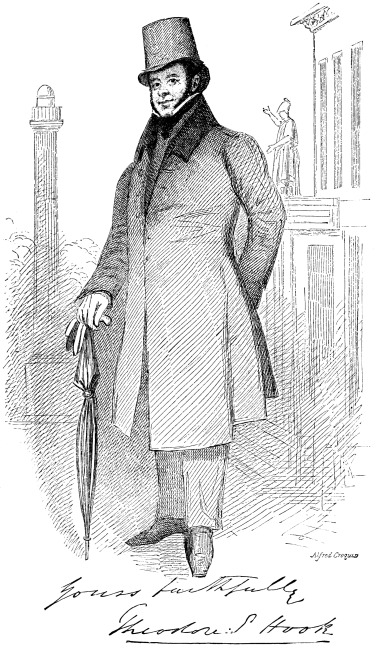
Yours faithfully
Theodore S Hook
-THEODORE HOOK-
A picture by Du Maurier in Punch once represented a man singing a comic song at an ‘At Home.’ Nobody laughed; some faces expressed wonder; some, pity; some, contempt; a few, indignation; but not one face smiled. Consider the difference: in the year 1837 every face would have been broadened out in a grin. Do we, therefore, laugh no more? We do not laugh so much, certainly, and we laugh differently. Our comic man of society still tells good stories, but he no longer sings songs; in his stories he prefers the rapier or the jewelled dagger to the bludgeon. Those who desire to make the acquaintance of the comic man, as he was accepted in society and in the middle-class, should read the works of Theodore Hook and of Albert Smith. To begin with, he played practical jokes; he continually played practical jokes, and he was never killed, as would now happen, by his victims. I am certain that we should kill a man who came to our houses and played the jokes which then were permitted to the comic man. He poured melted butter into coat pockets at suppers; he turned round signposts, and made them point the wrong way, in order to send people whither101 they did not wish to go. It may be remarked that his tricks were rarely original. He wrenched off door-knockers; he turned off the gas at the meter; he tied strings across the river to knock people backwards in their boats; he tied two doors together, and then rang both bells, and waited with a grin from ear to ear; he rang up people in the dead of the night on any pretext; he filled keyholes with powdered slate-pencil when the master of the house was coming home late; he hoaxed innocent ladies, and laughed when they were nearly driven mad with worry and terror; he went to masquerades, carrying a tray full of medicated sweets—think of such a thing!—which he distributed, and then retired, and came back in another dress to gaze upon the havoc he had wrought. Again, it was a time when candles were still carried about the house, and, as yet, it was thought that gas in bedrooms was dangerous. He dipped the candles waiting for the ladies when they went to bed into water, so that they spluttered and went out, and made alarming fireworks when they were lit; and then, to remove the horrible smell, the candles being of tallow, he offered to burn pastilles, but these were confections of gunpowder and water, and caused the liveliest102 emotions, and sent the poor ladies upstairs in an agony of nervous terror.
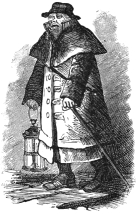
WATCHMAN
(From a Drawing by George Cruikshank in ‘London Characters’)
There was no end to the tricks of this abominable person. Once he received an invitation to a great ball, which a Royal Personage was to honour with his presence. The Royal Personage was to be regaled in a special supper-room, apart from the common herd. The table had been laid in this room with the most elaborate care and splendour: down the middle of the table there meandered a beautiful canal filled with gold and silver fish—a contrivance believed in those remote ages to set off and greatly increase the beauty of a supper table. Our ingenious friend quickly discovered that the room was accessible from the garden, where some workmen were still putting the finishing touches to their work, the men who had constructed the marquee, and had arranged the lamps and things. He went, therefore, into the garden: he invited these workmen to partake of a little refreshment, led them into the Royal supper-room, and begged them to help themselves, and to spare nothing: in a twinkling the tables were cleared. He then put certain chemicals into the canal, which instantly killed every fish: this done, he returned to the ballroom, and waited for the moment when the Illustrious Personage, the hostess on his arm, should enter that supper-room, and gaze upon those empty dishes.
On another occasion, he discovered that a respectable butler was in the habit of creeping upstairs, in103 order to listen to the conversation, leaving his slippers, in position, at the head of the kitchen stairs. He therefore hid himself while the poor man, after adjusting the slippers, walked noiselessly upstairs. He then hammered a tintack into the heel of each slipper, and waited again, until a confederate gave the alarm, and the fat butler, hurrying down, slipped one foot into each slipper, and—went headlong into the depths below, and was nearly killed. ‘Never laughed so much in all my life, sir.’
At Oxford, of course, he enjoyed himself wonderfully. For, with a party of chosen friends, he met no less a person than the Vice-Chancellor, at ten or eleven at night, going home alone, and peacefully. To raise that personage, lift him on their shoulders, crown him with a lamp cover, and carry him triumphantly to the gates of his own College, was not only a great stroke of fun, but a thing not to be resisted. And he blew up the group of Cain and Abel in the Quadrangle of Brasenose. And what he did with proctors, bulldogs, and the like, passeth all understanding. It was at Oxford that the funny man made the acquaintance of the Major. Now the Major was in love, but he was no longer so young as he had been, and his hair was getting thin on the top—a very serious thing in the days of long hair, wavy, curled, singed, and oiled, flowing gracefully over the ears and the coat-collar. The Major, in an evil moment, commissioned the Practical Joker, whose character, one would think, must have104 been well known, to procure for him a bottle of a certain patent hair-restorer. Of course, the Joker brought him a bottle of depilatory mixture, which being credulously accepted, and well rubbed in, deprived the poor Major of every hair that was left. It is needless to relate how, when he was at Richmond with a party of ladies, the introduction of the ‘maids of honour’ was a thing not to be resisted; and one can quite understand how one of the young ladies was led on to ordering, in addition to another ‘maid of honour,’ a small Gentleman Usher of the Black Rod, if they had one quite cold.
The middle-class of London, before the development of omnibuses, lived in and round the City of London, Bloomsbury being the principal suburb; many thousands of well-to-do people, merchants and shopkeepers, lived in the City itself, and were not ashamed of their houses, and filled the City churches on the Sunday. Some lived at Clapham, Camberwell, and Stockwell on the south; a great many at Islington, where a vigorous offshoot of the great city ran through the High Street past Sadler’s Wells as far as Highbury; a few even lived at Highgate and Hampstead. There were the ‘short’ stages from London to all these places, but, so far as can be gathered, most of those who lived in these suburbs before the days of the omnibus had their own carriages, and drove to town and home again every day. On Sunday they entertained their friends, and the young gentlemen of the City delighted to hire horses and ride down. The105 comic literature of the time is full of the Cockney horseman. It will be remembered how Mr. Horatio Sparkins rode gallantly from town to dine with his hospitable friends on Sunday.
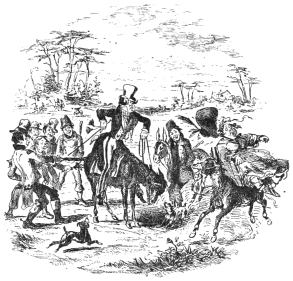
A SCENE ON BLACKHEATH
By ‘Phiz’
(From ‘Sketches in London,’ by James Grant)
The manners and customs of the Islington colony, which may, I suppose, be taken for the suburban and Bloomsbury people generally—except that Russell and Bedford Squares were very, very much grander—may be read in Albert Smith’s ‘Adventures of Mr. Ledbury,’ his ‘Natural History of the Gent,’ ‘The Pottleton Legacy,’ and other contemporary works. Very good reading they are, if approached in the right spirit, which is a humble and an inquiring spirit. Many106 remarkable things may be learned from these books. For instance, would you know how the middle-class evening party was conducted? Here are a few details. The gentlemen, of whose long and wavy hair I have already spoken, wore, for evening dress, a high black stock, the many folds of which covered the shirt, and were enriched by a massive pin; the white shirt-cuffs were neatly turned over their wrists, their dress-coats were buttoned, their trousers were tight, and they wore straps and pumps. The ladies either wore curls neatly arranged on each side—you may still see some old ladies who have clung to the pretty fashion of their youth—or they wore their hair dropped in a loop down the cheek and behind the ear, and then fastened in some kind of band with ribbons at the back of the head. The machinery of the frocks reminds one of the wedding morning in ‘Pickwick,’ when all the girls were crying out to be ‘done up,’ for they had hooks and eyes, and the girls were helpless by themselves. Pink was the favourite colour—and a very pretty colour too; and there was plenty of scope for the milliner’s art in lace and artificial flowers. The elder ladies were magnificent in turbans, and the younger ones wore across the forehead a band of velvet or silk decorated with a gold buckle, or something in pearls and diamonds. This fashion lingered long. I remember—it must have been about the year 1850—a certain elderly maiden lady who always wore every day and all day a black ribbon across her brows; this alone gave her a severe107 and keep-your-distance kind of expression; but, in addition, the ribbon contained in the middle, if I remember aright, a steel buckle—though a lady, one thinks, would hardly wear a steel buckle on her forehead. Sometimes there was a wreath of flowers worn like a coronet, and sometimes, but I think hardly in Islington, a tiara of jewels. In middle-class circles, the fashion of evening dress was marred by a fashion, common to both sexes, of wearing cleaned gloves. Now kid gloves could only be cleaned by one process, so that the result was an effect of turps which could not be subdued by any amount of patchouli or eau-de-Cologne. There were, as yet, no cards for the dances, and when a waltz was played, everybody was afraid to begin. Quadrilles of various kinds were danced, and the country dance yet lingered at this end of the town. The polka came later. Dancing was stopped whenever any young lady could be persuaded to sing, and happy was the young man whose avocations permitted him to wear the delightful moustaches forbidden in the City and in all the professions. Young Templars wore them until they were called, when they had to be shaved. For a City man to wear a moustache would have been ruin and bankruptcy.
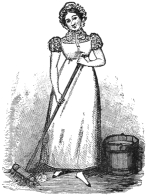
MAID SERVANT
(From a Drawing by Cruikshank in ‘London Characters’)
108 Other portions of Albert Smith’s works, if read with discernment, will enable one to make discoveries of some interest. One is that our modern ’Arry is really a survival, not, as is sometimes believed, a growth of modern days. His ally and mistress, ’Arriet, does not seem to have existed at all fifty years ago; at least there is no mention of her; but ’Arry flourished. He did really dreadful things. He was even worse than the Practical Joker. When he took Titus Ledbury abroad, he went into the cathedrals on purpose to spill the holy water, to blow out the candles, and to make faces at the women kneeling at their prayers; he got barrel-organs into lofts and invited men to bring grisettes and dance all night, with a supper brought from the charcuterie; wherever there was jumping, dancing, singing, and riot, ’Arry was to the fore. On board the steamer he seized a bottle of stout and took up a prominent and commanding position, where he drank it before all the world, smoking cigars, and laughing loudly at the poor people who were ill. At home, he wrenched off knockers, played practical jokes, drank more stout, ate oysters, chaffed bar-maidens, and called for brandy and water continually. He was loud in his dress and in his voice; he was insolent, caddish, and offensive in his manners. Generally, one thinks, he would end his career in Whitecross Street, or the Fleet, or the Queen’s Bench. Doubtless, however, there are still among us old gentlemen who now sit at church on Sunday with venerable white hair, among their children and grandchildren,109 and while the voice of the preacher rises and falls, their memory wanders back to the days when they danced and sang with the grisettes, when they wrenched the knockers, when they went from the theatre to the Coal Cellar, and from the Coal Cellar to the Finish; and came home with unsteady step and light purse in the grey of the morning.
The Debtors’ Prison belonged chiefly to the great middle-class. Before them stalked always a grisly spectre, called by some Insolvency and by others Bankruptcy. This villainous ghost seized its victims by the collar and haled them within the walls of a Debtors’ Prison, where it made them abandon hope, and abide there till the day of death. Everybody is familiar with the inside of the Fleet, the Queen’s Bench, the Marshalsea, and Whitecross Street. They are all pulled down now, and the only way to get imprisoned for debt is to incur contempt of court, for which Holloway is the reward. But what a drop from the humours of the Queen’s Bench, with its drinking, tobacco, singing, and noisy revelry, to the solitary cell of Holloway Prison! The Debtors’ Prison is gone, and the world is the better for its departure. Nowadays the ruined betting-man, the rake, the sharper, the profligate, the fraudulent bankrupt, have no prison where they can carry on their old excesses again, though in humbler way. They go down—below the surface—out of sight, and what they do, and how they fare, nobody knows, and very few care.
110
CHAPTER VII.
IN SOCIETY.
As to society in 1837, contemporary commentators differ. For, according to some, society was always gambling, running away with each other’s wives, causing and committing scandals, or whispering them, the men were spendthrifts and profligates, the women extravagant and heartless. Of course, the same things would be said, and are sometimes said, of the present day, and will be said in all following ages, because to the ultra-virtuous or to the satirist who trots out the old, stale, worn-out sham indignation, or to the isn’t-it-awful, gaping gobemouche, every generation seems worse than all those which preceded it. We know the tag and the burden and the weariness of the old song. As for myself, I am no indignant satirist, and the news that certain young gentlemen have been sitting up all night playing baccarat, drinking champagne, and ‘carrying on’ after the fashion of youth in all ages, does not greatly agitate my soul, or surprise me, or lash me into virtuous indignation. Not at all. At the same time, if one must range oneself and take a side, one may imitate111 the example of Benjamin Disraeli and declare for the side of the angels. And, once a declared follower of that army, one may be allowed to rejoice that things are vastly improved in the space of two generations. Of this there can be no doubt. Making easy allowance for exaggeration, and refusing to see depravity in a whole class because there are one or two cases that the world calls shocking and reads eagerly, it is quite certain that there is less of everything that should not be than there used to be—less in proportion, and even less in actual extent. The general tone, in short the general manners of society, have very much improved. Of this, I say again, there can be no doubt. Let any one, for instance, read Lady Blessington’s ‘Victims of Society.’ Though there is an unreal ring about this horrid book, so that one cannot accept it for a moment as a faithful picture of the times, such a book could not now be written at all; it would be impossible.
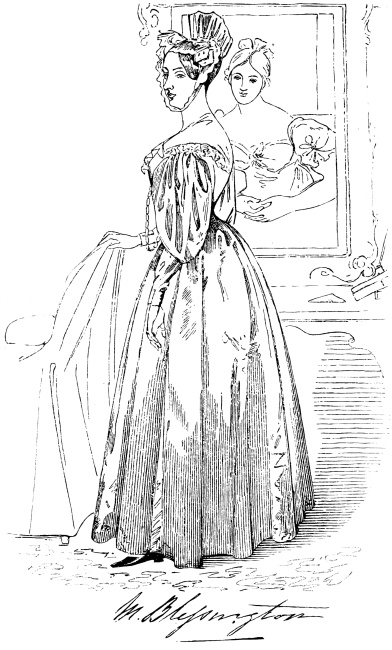
M. Blessington
-THE COUNTESS OF BLESSINGTON-
Let us sing of lighter themes. Take, for instance, the great subject of Swagger. There is still Swagger, even in these days; cavalry officers in garrison towns are112 still supposed to swagger. Eton boys swagger in their own little village; undergraduates swagger. The putting on of ‘side,’ by the way, is a peculiarly modern form of swagger: it is the assumption of certain qualities and powers which are considered as deserving of respect. Swagger, fifty years ago, was a coarser kind of thing. Officers swaggered; men of rank swaggered; men of wealth swaggered; gentlemen in military frogs—there are no longer any military frogs—swaggered in taverns, clubs, and in the streets. The adoption of quiet manners; the wearing of rank with unobtrusive dignity; the possession of wealth without ostentation; of wit without the desire to be always showing it—these are points in which we are decidedly in advance of our fathers. There was a great deal of cuff and collar, stock and breastpin about the young fellows of the day. They were oppressive in their gallantry: in public places they asserted themselves; they were loud in their talk. In order to understand the young man of the day, one may study the life and career of that gay and gallant gentleman, the Count d’Orsay, model and paragon for all young gentlemen of his time.
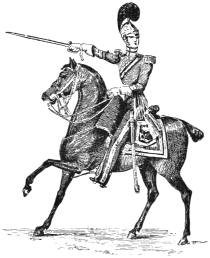
They were louder in their manners, and in their conversation they were insulting, especially the wits. Things were said by these gentlemen, even in a duelling age, which would be followed in these days by a violent personal assault. In fact, the necessity of fighting a duel if you kicked a man seems to have been the cause why men were constantly allowed to call each other, by113 implication, Fool, Ass, Knave, and so forth. So very disagreeable a thing was it to turn out in the early morning, in order to be shot at, that men stood anything rather than subject themselves to it. Consider the things said by Douglas Jerrold, for instance. They are always witty, of course, but they are often mere insults. Yet nobody seems ever to have fallen upon him. And not only this kind of thing was permitted, but things of the grossest taste passed unrebuked. For instance, only a few years before our period, at Holland House—not at a club, or a tavern, or a tap-room, but actually at Holland House, the most refined and cultured place in London—the following conversation once passed.
They were asking who was the worst man in the whole of history—a most unprofitable question; and one man after the other was proposed. Among the company present was the Prince Regent himself. ‘I,’ said Sydney Smith—no other than Sydney Smith, if you please—‘have always considered the Duke of Orleans, Regent of France, to have been the worst man in all history; and he,’ looking at the illustrious guest, ‘was a Prince.’ A dead silence followed, broken by the Prince himself. ‘For my own part,’ he said, ‘I have always considered that he was excelled by his tutor, the Abbé Dubois; and he was a priest, Mr. Sydney.’ Considering the reputation of the Prince, and the kind of life he was generally supposed to be leading, one can114 hardly believe that any man would have had the impudence and the bad taste to make such a speech.
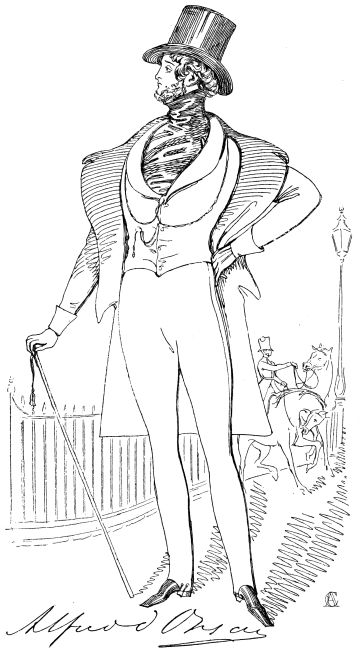
Alfred d Orsay
-COUNT d’ORSAY-
We still constantly hear, in the modern School for Scandal, remarks concerning the honour, the virtue, the cleverness, the ability, the beauty, the accomplishments of our friends. But it is behind their backs. We no longer try to put the truth openly before them. We stab in the back; but we no longer attack in front. One ought not to stab at all; but the back is a portion of the frame which feels nothing. So far the change is a distinct gain.
Society, again, fifty years ago, was exclusive. You belonged to society, or you did not; there was no overlapping, there were no circles which intersected. And if you were in society you went to Almack’s. If you did not go to Almack’s you might be a very interesting, praiseworthy, well-bred creature; but you could not claim to be in society. Nothing could be more simple. Therefore, everybody ardently desired to be seen at Almack’s. This, however, was not in everybody’s power. Almack’s, for instance, was far more exclusive than the Court. Riff-raff might go to Court; but they could not get to Almack’s, for at its gates there stood, not one angel with a fiery sword, but six in the shape of English ladies, terrible in turbans, splendid in diamonds, magnificent in satin, and awful in rank.
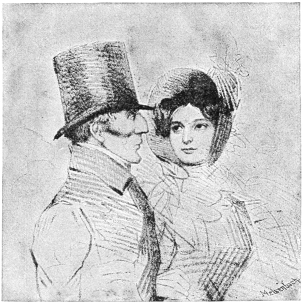
They were the Ladies Jersey, Londonderry, Cowper, Brownlow, Willoughby d’Eresby, and Euston. These ladies formed the dreaded Committee. They decided115 who should be admitted within the circle; all applications had to be made direct to them; no one was allowed to bring friends. Those who desired to go to the balls—Heavens! what lady did not ardently desire?—were obliged to send in a personal request to be allowed the honour. Not only this, but they were also obliged to send for the answer, which took the form of a voucher—that is, a ticket—or a simple refusal, from which there was no appeal. Gentlemen were admitted in the same way, and by the same mode of application, as the ladies. In their case, it is pleasing to add, some regard was paid to character as well as to birth and rank, so that if a man openly and flagrantly insulted116 society he was supposed not to be admitted; but one asks with some trembling how far such rigour would be extended towards a young and unmarried Duke. Almack’s was a sort of Royal Academy of Society, the Academic diploma being represented by the admitted candidate’s pedigree, his family connections, and his family shield. The heartburnings, jealousies, and maddening envies caused by this exclusive circle were, I take it, the cause of its decline and fall. Trade, even of the grandest and most successful kind, even in the persons of the grandchildren, had no chance whatever; no self-made man was admitted; in fact, it was not recognised that a man could make himself; either he belonged to a good family or he did not—genius was not considered at all; admission to Almack’s was like admission to the Order of the Garter, because it pretended no nonsense about merit; wives and daughters of simple country squires, judges, bishops, generals, admirals, and so forth, knew better than to apply; the intrigues, backstairs influence, solicitation of friends, were as endless at Almack’s as the intrigues at the Admiralty to procure promotion. Admission could not, however, be bought. So far the committee were beyond suspicion and beyond reproach; it was whispered, to be sure, that there was favouritism—awful word! Put yourself in the position, if you have imagination enough, of a young and beautiful débutante. Admission to Almack’s means for you that you can see your right and title clear to a coronet. What will you not do—what117 cringing, supplication, adulation, hypocrisies—to secure that card? And oh! the happiness, the rapture, of sending to Willis’s Rooms and finding a card waiting for you! and the misery and despair of receiving, instead, the terrible letter which told you, without reason assigned, that the Ladies of the Committee could not grant your request!
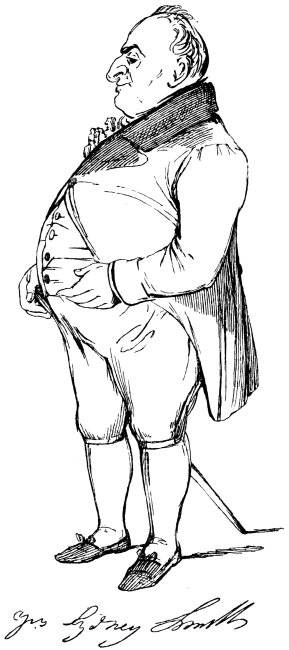
Yrs. Sydney Smith
-SYDNEY SMITH-
They were not expensive gatherings, the tickets being only 7s. 6d. each, which did not include supper. Dancing began at eleven to the strains of Weippert’s and Collinet’s band. The balls were held in the great room at Willis’s, and the space reserved for the dancers was roped round. The two favourite dances were the Valse and the Galop—the ‘sprightly galoppade,’ as it was called. Quadrilles were also danced. It may be interesting to those who have kept the old music to learn that in the year 1836 the favourite quadrilles were L’Eclair and La Tête de Bronze, and the favourite valse was Le Remède contre le Sommeil. They had also Strauss’s waltzes.
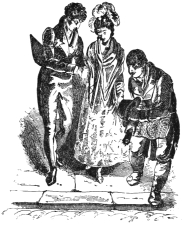
The decline and fall of Almack’s was partly caused by the ‘favouritism’ which not only kept the place exclusive,118 but excluded more than was politic. The only chance for the continued existence of such an institution is that it should be constantly enlarging its boundaries, just as the only chance for the continued existence of such an aristocracy as ours is that it should be always admitting new members. Somehow the kind of small circle which shall include only the crème de la crème is always falling to pieces. We hear of a club which is to contain only the very noblest, but in a year or two it has ceased to exist, or it is like all other clubs. Moreover, a great social change has now passed over the country. The stockbroker, to speak in allegory, has got into Society. Respect for Rank, fifty years ago universal and profound, is rapidly decaying. There are still many left who believe in some kind of superiority by Divine Right and the Sovereign’s gift of Rank, even though that Rank be but ten years old, and the grandfather’s shop is still remembered. We do not pretend to believe any longer that Rank by itself makes people cleverer, more moral, stronger, more religious, or more capable; but some of us still believe that, in some unknown way, it makes them superior. These thinkers are getting fewer. And the decay of agriculture, which promises to continue and increase, assists the decay of Respect for Rank, because such an aristocracy as that of these islands, when it becomes poor, becomes contemptible.
The position of women, social and intellectual, has wholly changed. Nothing was heard then of women’s119 equality, nothing of woman suffrage; there were no women on Boards, there were none who lectured and spoke in public, there were few who wrote seriously. Women regarded themselves, and spoke of themselves, as inferior to men in understanding, as they were in bodily strength. Their case is not likely to be understated by one of themselves. Hear, therefore, what Mrs. John Sandford—nowadays she would have been Mrs. Ethel Sandford, or Mrs. Christian-and maiden-name Sandford—says upon her sisters. It is in a book called ‘Woman in her Social and Domestic Character.’
‘There is something unfeminine in independence. It is contrary to Nature, and therefore it offends. A really sensible woman feels her dependence; she does what she can, but she is conscious of inferiority, and therefore grateful for support.’ The italics are mine. ‘In everything that women attempt they should show their consciousness of dependence.... They should remember that by them influence is to be obtained, not by assumption, but by a delicate appeal to affection or principle. Women in this respect are something like children—the more they show their need of support, the more engaging they are. The appropriate expression of dependence is gentleness.’ The whole work is executed in this spirit, the keynote being the inferiority of woman. Heavens! with what a storm would such a book be now received!
In the year 1835 Herr Räumer, the German historian, visited England, and made a study of the120 English people, which he afterwards published. From this book one learns a great deal concerning the manners of the time. For instance, he went to a dinner-party given by a certain noble lord, at which the whole service was of silver, a silver hot-water dish being placed under every plate; the dinner lasted until midnight, and the German guest drank too much wine, though he missed ‘most of the healths.’ It was then the custom at private dinner-parties to go on drinking healths after dinner, and to sit over the wine till midnight. He goes to an ‘At Home’ at Lady A.’s. ‘Almost all the men,’ he tells us, ‘were dressed in black coats, black or coloured waistcoats, and black or white cravats.’ Of what colour were the coloured waistcoats, and of what colour the coats which were not black, and how were the other men dressed? Perhaps one or two may have been Bishops in evening dress. Now the evening dress of a Bishop used to be blue. I once saw a Bishop dressed all in blue—he was a very aged Bishop, and it was at a City Company’s dinner—and I was told it had formerly been the evening dress of Bishops, but was now only worn by the most ancient among them. Herr Räumer mentions the ‘countless’ carriages in Hyde Park, and observes that no one could afford to keep a carriage who had not 3,000l. a year at least. And at fashionable dances he observes that they dance nothing but waltzes. The English ladies he finds beautiful, and of the men he observes that the more they eat and drink the colder they become—because they drank121 port, no doubt, under the influence of which, though the heart glows more and more, there comes a time when the brow clouds, and the speech thickens, and the tongue refuses to act.
The dinners were conducted on primitive principles. Except in great houses, where the meat and game were carved by the butler, everything was carved on the table. The host sat behind the haunch of mutton, and ‘helped’ with zeal; the guests took the ducks, the turkey, the hare, and the fowls, and did their part, conscious of critical eyes. A dinner was a terrible ordeal for a young man who, perhaps, found himself called upon to dissect a pair of ducks. He took up the knife with burning cheeks and perspiring nose; now, at last, an impostor, one who knew not the ways of polite society, would be discovered; he began to feel for the joints, while the cold eyes of his hostess gazed reproachfully upon him—ladies, in those days, knew good carving, and could carve for themselves. Perhaps he had, with a ghastly grin, to confess that he could not find those joints. Then the dish was removed and given to another guest, a horribly self-reliant creature, who laughed and talked while he dexterously sliced the breast and cut off the legs. If, in his agony, the poor wretch would take refuge in the bottle, he had to wait until some one invited him to take wine—horrible tyranny! The dinner-table was ornamented with a great épergne of silver or glass; after dinner the cloth was removed, showing the table, deep in colour, lustrous,122 well waxed; and the gentlemen began real business with the bottle after the ladies had gone.
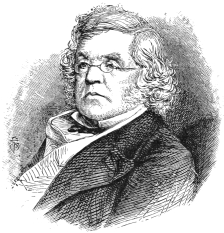
Very little need be said about the Court. It was then in the hands of a few families. It had no connection at all with the life of the country, which went on as if there were no Court at all. It is strange that in these fifty years of change the Court should have altered so little. Now, as then, the Court neither attracts, nor attempts to attract, any of the leaders in Art, Science, or Literature. Now, as then, the Court is a thing apart from the life of the country. For the best class of all, those who are continually advancing the country in science, or keeping alight the sacred lamp of letters, who are its scholars, architects, engineers, artists, poets, authors, journalists, who are the merchant adventurers of modern times, who are the preachers and teachers, the Court simply does not exist. One states the fact without comment. But it should be stated, and it should be clearly understood. The whole of those men who in this generation maintain the greatness of our country in the ways where alone greatness is desirable or memorable, except in arms, the only men of this generation whose memories will live and adorn the Victorian era, are strangers to the Court. It seems a great pity. An ideal Court should be the centre of everything—Art, Letters, Science, all.
As for the rest of society—how the people had drums and routs and balls; how they angled for husbands; how they were hollow and unnatural, and so forth—you123 may read about it in the pages of Thackeray. And I, for one, have never been able to understand how Thackeray got his knowledge of these exclusive circles. Instead of dancing at Almack’s he was taking his chop and stout at the Cock; instead of gambling at Crockford’s he was writing ‘copy’ for any paper which would take it. When and where did he meet Miss Newcome and Lady Kew and Lord Steyne? Perhaps he wrote of them by intuition, as Disraeli wrote the ‘Young Duke.’ ‘My son, sir,’ said the elder Disraeli proudly, ‘has never, I believe, even seen a Duke.’
One touch more. There is before me a beautiful, solemn work, one in which the writer feels his responsibilities almost too profoundly. It is on no less important a subject than Etiquette, containing Rules for the124 Conduct of Life on the most grave and serious occasions. I permit myself one or two extracts:—
‘Familiarity is the greatest vice of Society. When an acquaintance says “My dear fellow,” cut him immediately.’
‘Never enter your own house without bowing to every one you may meet there.’
‘Never ask a lady any questions about anything whatever.’
‘If you have drunk wine with every one at the table and wish for more’—Heavens! More! And after drinking with every one at the table!—‘wait till the cloth is removed.’
‘Never permit the sanctity of the drawing-room to be violated by a Boot.’
125
CHAPTER VIII.
AT THE PLAY AND THE SHOW.
Fifty years ago the Theatre was, far more than at present, the favourite amusement of the Londoners. It was a passion with them. They did not go only to laugh and be pleased as we go now; they went as critics; the pit preserves to this day a reputation, long since lost, for critical power. A large number of the audience went to every new performance of a stock piece in order to criticise. After the theatre they repaired to the Albion or the Cock for supper, and to talk over the performance. Fifty years ago there were about eighteen theatres, for a London of two millions.2
2 The following were the London theatres in the year 1837: Her Majesty’s, formerly the King’s; Drury Lane, Covent Garden, the ‘Summer House,’ or Haymarket; the Lyceum, the Prince’s (now St. James’s), the Adelphi, the City of London (Norton Folgate), the Surrey, Astley’s, the Queen’s (afterwards the Prince of Wales’s), the Olympic, and the Strand, the Coburg (originally opened as the Victoria in 1833), Sadler’s Wells, the Royal Pavilion, the Garrick, and the Clarence (now the King’s Cross).
These theatres were not open all the year round, but it was reckoned that 20,000 people went every night to the theatre. There are now thirty theatres at least open nearly the whole year round. I doubt if there are many more than 20,000 at all of them126 together on an average in one night. Yet London has doubled, and the visitors to London have been multiplied by ten. It is by the visitors that the theatres are kept up. The people of London have in great measure lost their taste for the theatres, because they have gone to live in the suburbs. Who, for instance, that lives in Hampstead and wishes to get up in good time in the morning can take his wife often to the theatre? It takes an hour to drive into town, the hour after dinner. The play is over at a little after eleven; if he takes a cab, the driver is sulky at the thought of going up the hill and getting back again without another fare; if he goes and returns in a brougham, it doubles the expense. Formerly, when everybody lived in town, they could walk. Again, the price of seats has enormously gone up. Where there were two rows of stalls at the same price as the dress circle—namely, four shillings—there are now a dozen at the price of half a guinea. And it is very much more the fashion to take the best places, so that the dress circle is no longer the same highly respectable part of the house, while the upper boxes are now ‘out of it’ altogether, and, as for the pit, no man knoweth whether there be any pit still.
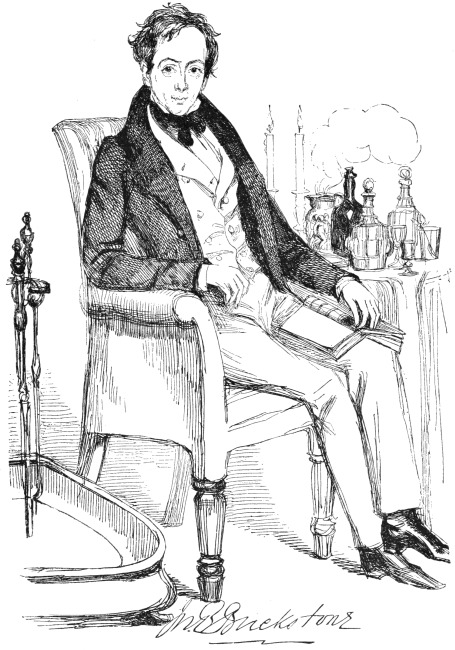
Jn. B Buckstone
-JOHN BALDWIN BUCKSTONE-
Besides, there are so many more distractions; a more widely spread habit of reading, more music, more art, more society, a fuller life. The theatre was formerly—it is still to many—the only school of conversation, wit, manners, and sentiment, the chief excitement which took them out of their daily lives, the most delightful,127 the most entrancing manner of spending the evening. If the theatre were the same to the people of London as it used to be, the average attendance, counting the visitors, would be not 20,000 but 120,000.
The reason why some of the houses were open for six months only was that the Lord Chancellor granted a licence for that period only, except to the patent houses. The Haymarket was a summer house, from April to October; the Adelphi a winter house, from October to April.
The most fashionable of the houses was Her Majesty’s, where only Italian Opera was performed. Everybody in society was obliged to have a box for the season, for which sums were paid varying with the place in the house and the rank and wealth of the tenant. Thus the old Duke of Gloucester used to pay three hundred guineas for the season. On levée days and drawing-rooms the fashionable world went to the Opera in their Court dresses, feathers, and diamonds, and all—a very moving spectacle. Those who only took a box in order to keep up appearances, and because it was necessary for one in society to have a box, used to sell seats—commonly called bones, because a round numbered bone was the ticket of admission—to their friends; sometimes they let their box for a single night, a month, or the whole season, by means of the agents, so that, except for the honour of it, as the man said when the bottom of his sedan-chair fell out, one might as well have had none at all.
128 The prices of admission to the theatres were very much less than obtain at the present day. At Drury Lane the boxes and stalls, of which there were two or three rows only, were 7s. each; the pit was 3s. 6d., the upper boxes 2s., and the gallery 1s. At Covent Garden, where they were great at spectacle, with performing animals, the great Bunn being lessee, the prices were lower, the boxes being 4s., the pit 2s., the upper boxes 1s. 6d., and gallery 1s. At the Haymarket the boxes were 5s., the pit 3s., and the gallery 1s. 6d.
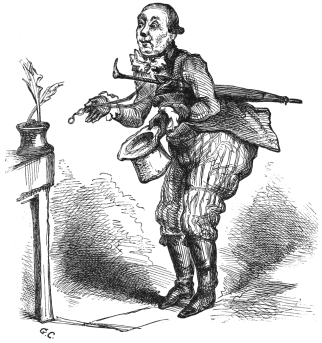
LISTON AS ‘PAUL PRY’
(From a Drawing by George Cruikshank)
The actors and actresses were many and good. At129 the Haymarket they had Farren, Webster, Buckstone, Mrs. Glover, and Mrs. Humby. At the Olympic, Elliston, Liston, and Madame Vestris. Helen Faucit made her first appearance in 1835; Miss Fanny Kemble hers in 1830. Charles Mathews, Harley, Macready, and Charles Kean were all playing. I hardly think that in fifty years’ time so good a list will be made of actors of the present day whose memory has lasted so long as those of 1837. The salaries of actors and singers varied greatly, of course. Malibran received 125l. a night, Charles Kean 50l. a night, Macready 30l. a week, Farren 20l. a week, and so on, down to the humble chorister—they then called her a figurante—with her 12s. or 18s. a week.
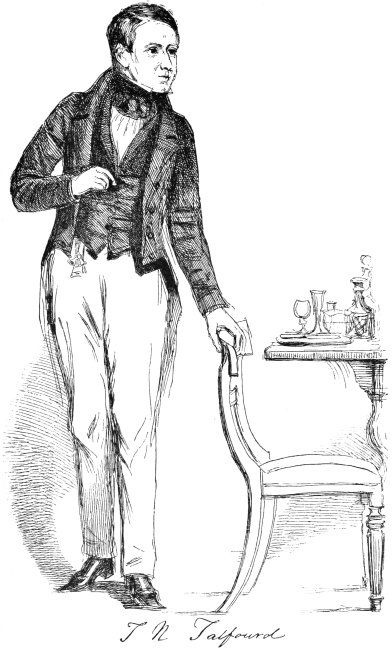
T N Talfourd
-THOMAS NOON TALFOURD-
As for the national drama, I suppose it had never before been in so wretched a state. Talfourd’s play of ‘Ion’ was produced about this time; but one good play—supposing ‘Ion’ to be a good play—is hardly enough to redeem the character of the age. There were also tragedies by Miss Mitford and Miss Baillie—strange that no woman has ever written even a tolerable play—but these failed to keep the stage. One Mr. Maturin, now dying out of recollection, also wrote tragedies. The comedies and farces were written by Planché, Reynolds, Peake, Theodore Hook, Dibdin, Leman Rede, Poole, Maddison Morton, and Moncrieff. A really popular writer, we learn with envy and astonishment, would make as much as 30l., or even 40l., by a good piece. Think of making 30l. or 40l. by a good piece at the130 theatre! Was not that noble encouragement for the playwrights? Thirty pounds for one piece! It takes one’s breath away. Would not Mr. Gilbert, Mr. Wills, and Mr. George Sims be proud and happy men if they could get 30l.—a whole lump of 30l.—for a single piece? We can imagine the tears of joy running down their cheeks.
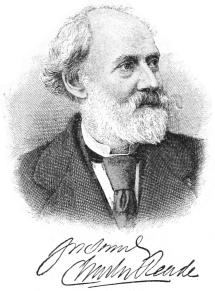
Charles Reade
-CHARLES READE-
The decline of the drama was attributed by Räumer to the entire absence of any protection for the dramatist. This is no doubt partly true; but the dramatist was protected, to a certain extent, by the difficulty of getting copies of his work. Shorthand writers used to try—they still try—to take down, unseen, the dialogue. Generally, however, they are detected in the act and desired to withdraw. As a rule, if the dramatist did not print the plays, he was safe, except from treachery on the part of the prompter. The low prices paid for dramatic work were the chief causes of the decline—say, rather, the dreadful decay, dry rot, and galloping consumption—of the drama fifty years ago. Who, for instance, would ever expect good fiction to be produced if it was131 rewarded at the rate of no more than 30l., or even 300l., a novel? Great prizes are incentives for good work. Good craftsmen will no longer work if the pay is bad; or, if they work at all, they will not throw their hearts into the work. The great success of Walter Scott was the cause why Dickens, Thackeray, George Eliot, Charles Reade, and the many second-rate novelists chose fiction rather than the drama for their energies. One or two of them, Dickens and Reade, for instance, were always hankering after the stage. Had dramatists received the same treatment in England as in France, many of these writers would have seriously turned their attention to the theatre, and our modern dramatic literature would have been as rich as our work in fiction. The stage now offers a great fortune, a far greater fortune, won much more swiftly than can be got by fiction, to those who succeed.
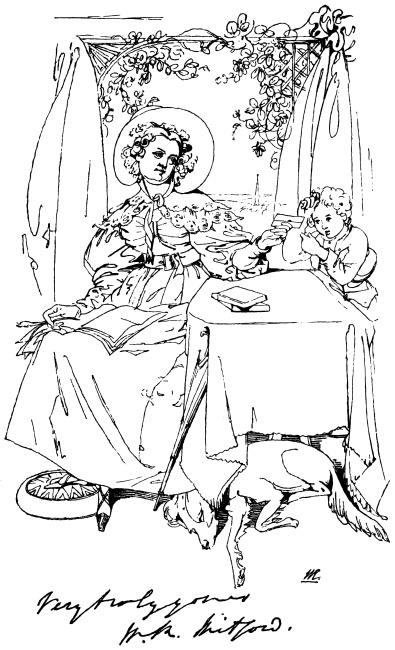
M. R. Mitford.
-MARY RUSSELL MITFORD-
As for the pieces actually produced about this period, they were chiefly adaptations from novels. Thus, we find ‘Esmeralda’ and ‘Quasimodo,’ two plays from Victor Hugo’s ‘Hunchback of Notre Dame;’ ‘Lucillo,’ from ‘The Pilgrims of the Rhine,’ by Lytton; Bulwer, indeed, was continually being dramatised; ‘Paul Clifford’ and ‘Rienzi,’ among others, making their appearance on the stage. For other plays there were ‘Zampa’ or ‘The Corsair,’ due to Byron; ‘The Waterman,’ ‘The Irish Tutor,’ ‘My Poll and my Partner Joe,’ with T. P. Cooke, at the Surrey Theatre. The comedy of the time is very well illustrated by Lytton’s ‘Money,’ stagey and132 unreal. The scenery, dresses, and general mise-en-scène would now be considered contemptible.
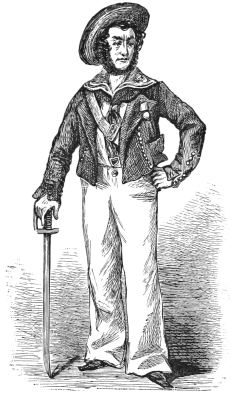
Apart from the Italian Opera, music was very well supported. There were concerts in great numbers: the Philharmonic, the Vocal Society, and the Royal Academy of Music gave their concerts at the King’s Ancient Concert Rooms, Hanover Square. Willis’s Rooms were also used for music; and the Cecilia Society gave its concerts in Moorgate Street.
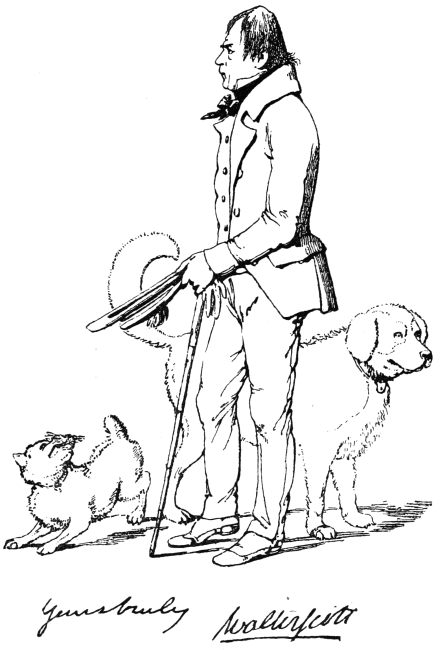
Yours truly Walter Scott
-SIR WALTER SCOTT-
There were many other shows, apart from the well-known sights of town. Madame Tussaud’s Gallery in Baker Street, the Hippodrome at Bayswater, the Colosseum, the Diorama in Regent’s Park, the Panorama in Leicester Square—where you could see ‘Peru and the Andes, or the Village engulfed by the Avalanche’—and the Panorama in Regent Street attracted the less frivolous and those133 who came to town for the improvement of their minds. For Londoners themselves there were the Vauxhall Gardens first and foremost—the most delightful places of amusement that London ever possessed except, perhaps, Belsize. Everybody went to Vauxhall; those who were respectable and those who were not. Far more beautiful than the electric lights in the Gardens of the ‘Colonies’ were the two hundred thousand variegated oil lamps, festooned among the trees of Vauxhall; there was to be found music, singing, acting, and dancing. Hither came the gallant and golden youth from the West End; here were seen sober and honest merchants with their wives and daughters; here were ladies of doubtful reputation and ladies about whose reputation there could be no doubt; here there134 were painted arbours where they brought you the famous Vauxhall ham—‘sliced cobwebs;’ the famous Vauxhall beef—‘book muslin, pickled and boiled;’ and the famous Vauxhall punch—Heavens! how the honest folk did drink that punch!
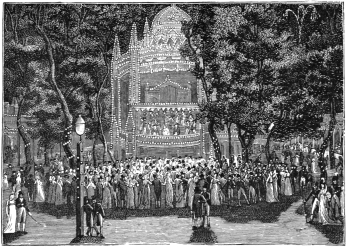
I have before me an account of an evening spent at Vauxhall about this time by an eminent drysalter of the City, his partner, a certain Tom, and two ladies, the drysalter’s wife and his daughter Lydia; ‘a laughter-loving lass of eighteen, who dearly loved a bit of gig.’ Do you know, gentle reader, what is a ‘bit of gig’? This young lady laughs at everything, and cries, ‘What a bit of gig!’ There was singing, of course, and after the singing there were fireworks, and after the fireworks an ascent on the rope. ‘The ascent on the rope, which Lydia had never before witnessed, was to her particularly interesting. For the first time during the evening she looked serious, and as the mingled rays of the moon (then shining gloriously in the dark blue heavens, attended by her twinkling handmaidens, the stars), which ever and anon shot down as the rockets mounted upwards, mocking the mimic pyrotechnia of man, and the flashes of red fire played upon her beautiful white brow and ripe lips—blushing like a cleft cherry—we thought for a moment that Tom was a happy blade. While we were gazing on her fine face, her eye suddenly assumed its wonted levity, and she exclaimed in a laughing tone—“Now, if the twopenny postman of the rockets were to mistake one of the directions and deliver it among the135 crowd so as to set fire to six or seven muslin dresses, what a bit of gig it would be!”’
Another delightful place was the Surrey Zoological Gardens, which occupied fifteen acres, and had a large lake in the middle, very useful for fireworks and the showing off of the Mount Vesuvius they stuck up on one side of it. The carnivorous animals were kept in a single building, under a great glazed cupola, but the elephants, bears, monkeys, &c., had separate buildings of their own. Flower shows, balloon ascents, fireworks, and all kinds of exciting things went on at the Surrey Zoo.
The Art Galleries opened every year, and, besides the National Gallery, there were the Society of British Artists, the Exhibition of Water Colours, and the British Institution in Pall Mall. At the Royal Academy of 1837, Turner exhibited his ‘Juliet,’ Etty a ‘Psyche and Venus,’ Landseer a ‘Scene in Chillingham Park,’ Wilkie the ‘Peep o’ Day Boy’s Cabin,’ and Roberts the ‘Chapel of Ferdinand and Isabella at Granada.’
There were Billiard Rooms, where a young man from the country who prided himself upon his play could get very prettily handled. There were Cigar Divans, but as yet only one or two, for the smoking of cigars was a comparatively new thing—in fact, one who wrote in the year 1829 thought it necessary to lay down twelve solemn rules for the right smoking of a cigar; there were also Gambling Hells, of which more anon.
136 Fifty years ago, in short, we amused ourselves very well. We were fond of shows, and there were plenty of them; we liked an al fresco entertainment, and we could have it; we were not quite so picksome in the matter of company as we are now, and therefore we endured the loud vulgarities of the tradesman and his family, and shut our eyes when certain fashionably dressed ladies passed by showing their happiness by the loudness of their laughter; we even sat with our daughter in the very next box to that in which young Lord Tomnoddy was entertaining these young ladies with cold chicken and pink champagne. It is, we know, the privilege of rank to disregard morals in public as well as in private. Then we had supper and a bowl of punch, and so home to bed.
Those who are acquainted with the doings of Corinthian Tom and Bob Logic are acquainted with the Night Side of London as it was a few years before 1837. Suffice it to say that it was far darker, far more vicious, far more dangerous fifty years ago than it is now. Heaven knows that we have a Night Side still, and a very ugly side it is, but it is earlier by many hours than it used to be, and it is comparatively free from gambling-houses, from bullies, blackmailers, and sharks.
137
CHAPTER IX.
IN THE HOUSE.
On November 20, 1837, the young Queen opened her first Parliament in person. The day was brilliant with sunshine, the crowds from Buckingham Palace to the House were immense, the House of Lords was crammed with Peers and the gallery with Peeresses, who occupied every seat, and even ‘rushed’ the reporters’ gallery, three reporters only having been fortunate enough to take their places before the rush.3
3 I am indebted for the whole of this chapter to Random Recollections of the Lords and Commons, 1838.
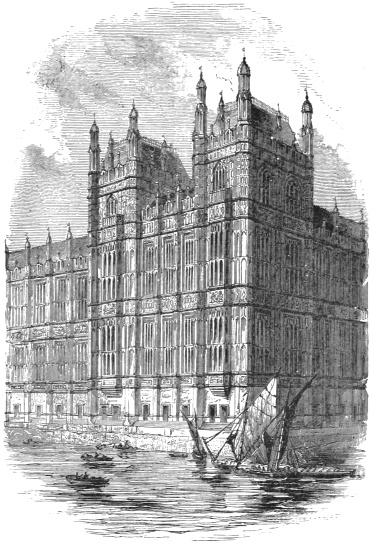
THE ‘NEW’ HOUSES OF PARLIAMENT, FROM THE RIVER
(First stone laid 1840. Sir Charles Barry, architect)
When Her Majesty arrived and had taken her place, there was the rush from the Lower House.
‘Her Majesty having taken the oath against Popery, which she did in a slow, serious, and audible manner, proceeded to read the Royal Speech; and a specimen of more tasteful and effective elocution it has never been my fortune to hear. Her voice is clear, and her enunciation distinct in no ordinary degree. Her utterance is timed with admirable judgment to the ear: it is the happy medium between too slow and too rapid.138 Nothing could be more accurate than her pronunciation; while the musical intonations of her voice imparted a peculiar charm to the other attributes of her139 elocution. The most perfect stillness reigned through the place while Her Majesty was reading her Speech. Not a breath was to be heard: had a person, unblessed with the power of vision, been suddenly taken within hearing of Her Majesty, while she was reading her Speech, he might have remained some time under the impression that there was no one present but herself. Her self-possession was the theme of universal admiration.
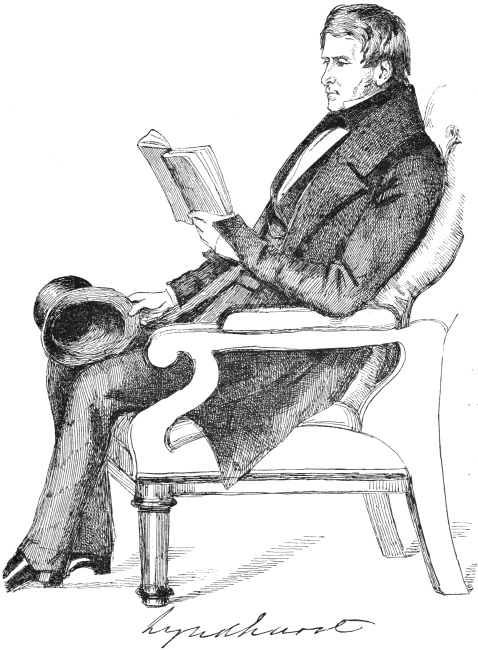
Lyndhurst
-LORD LYNDHURST-
‘In person Her Majesty is considerably below the average height. Her figure is good; rather inclined, as far as one could judge from seeing her in her robes of state, to the slender form. Every one who has seen her must have been struck with her singularly fine bust. Her complexion is clear, and has all the indications of excellent health about it. Her features are small, and partake a good deal of the Grecian cast. Her face, without being strikingly handsome, is remarkably pleasant, and is indicative of a mild and amiable disposition.’
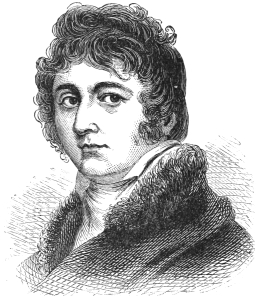
In the House of Lords the most prominent figures were, I suppose, those of Lord Brougham and the Duke of Wellington. The debates in the Upper House, enlivened by the former, and by Lords Melbourne, Lyndhurst, and others, were lively and animated, compared with the languor of the modern House. The Duke of Rutland, the Marquis of Bute, the Marquis of Camden (who paid back into the Treasury every year the salary he received as Teller of the Exchequer), the140 Earls of Stanhope, Devon, Falmouth, Lords Strangford, Rolls, Alvanley, and Redesdale were the leaders of the Conservatives. The Marquis of Sligo, the Marquis of Northampton, the Earls of Rosebery, Gosford, Minto, Shrewsbury, and Lichfield, Lords Lynedoch and Portman were the leaders of the Liberals. With the exceptions of Wellington, Brougham, Melbourne, and Redesdale, it is melancholy to consider that these illustrious names are nothing more than names, and convey no associations to the present generation.
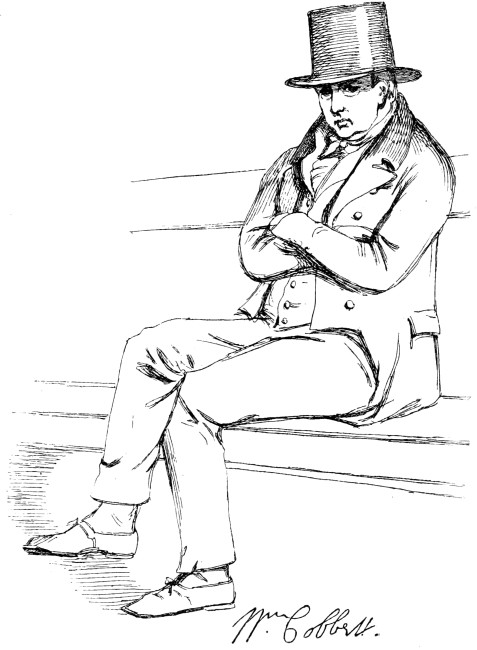
Wm. Cobbett.
-WILLIAM COBBETT-
Among the members of the Lower House were many more who have left behind them memories which are not likely to be soon forgotten. Sir Robert Peel,141 Lord Stanley, Thomas Macaulay, Cobbett, Lord John Russell, Sir John Cam Hobhouse, Lord Palmerston, Sir Francis Burdett, Hume, Roebuck, O’Connell, Lytton Bulwer, Benjamin D’Israeli, and last sole survivor, William Ewart Gladstone, were all in the Parliaments immediately before or immediately after the Queen’s Accession.
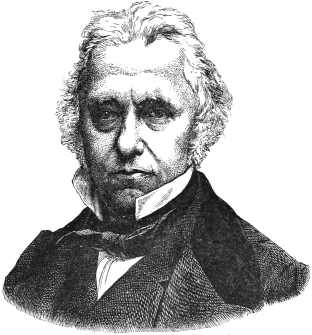
If you would like to know how these men impressed their contemporaries, read the following extracts from Grant’s ‘Random Recollections.’
‘Mr. Thomas Macaulay, the late member for Leeds, and now a member of Council in India, could boast of142 a brilliant, if not a very long Parliamentary career. He was one of those men who at once raised himself to the first rank in the Senate. His maiden speech electrified the House, and called forth the highest compliments to the speaker from men of all parties. He was careful to preserve the laurels he had thus so easily and suddenly won. He was a man of shrewd mind, and knew that if he spoke often, the probability was he would not speak so well; and that consequently there could be no more likely means of lowering him from the elevated station to which he had raised himself, than frequently addressing the House.
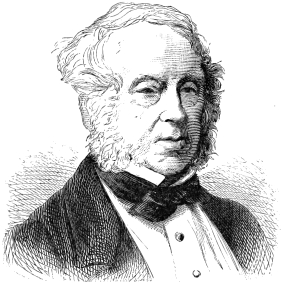
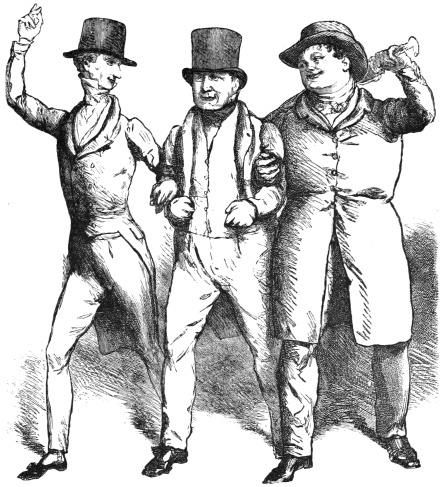
BURDETT, HUME, AND O’CONNELL
(From a Drawing by HB.)
‘His speeches were always most carefully studied, and committed to memory, exactly as he delivered143 them, beforehand. He bestowed a world of labour on their preparation; and, certainly, never was labour bestowed to more purpose. In every sentence you saw the man of genius—the profound scholar—the deep144 thinker—the close and powerful reasoner. You scarcely knew which most to admire—the beauty of his ideas, or of the language in which they were clothed.’
‘Lord John Russell is one of the worst speakers in the House, and but for his excellent private character, his family connections, and his consequent influence in the political world, would not be tolerated. There are many far better speakers, who, notwithstanding their innumerable efforts to catch the Speaker’s eye in the course of important debates, hardly ever succeed; or, if they do, are generally put down by the clamour of honourable members. His voice is weak and his enunciation very imperfect. He speaks in general in so low a tone as to be inaudible to more than one-half of the House. His style is often in bad taste, and he stammers and stutters at every fourth or fifth sentence. When he is audible he is always clear; there is no mistaking his meaning. Generally his speeches are feeble in matter as well as manner; but on some great occasions I have known him make very able speeches, more distinguished, however, for the clear and forcible way in which he put the arguments which would most naturally suggest themselves to a reflecting mind, than for any striking or comprehensive views of the subject.’
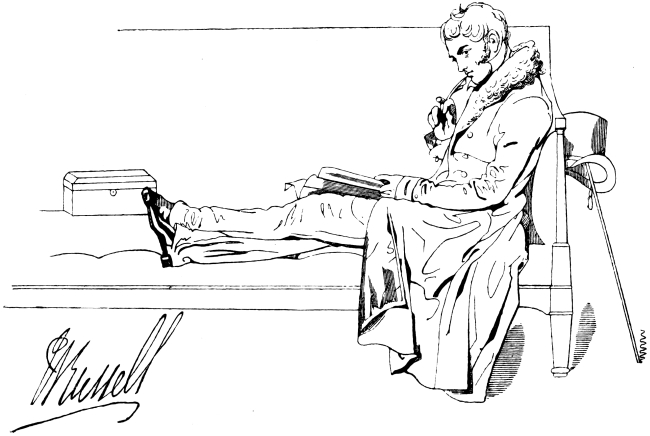
J Russell
-LORD JOHN RUSSELL-
‘Of Lord Palmerston, Foreign Secretary, and member for Tiverton, I have but little to say. The situation he fills in the Cabinet gives him a certain degree of prominence in the eyes of the country, which145 he certainly does not possess in Parliament. His talents are by no means of a high order. He is very irregular in his attendance on his Parliamentary duties, and, when in the House, is by no means active in defence either of his principles or his friends. Scarcely anything calls him up except a regular attack on himself, or on the way in which the department of the public service with which he is entrusted is administered.
‘In person, Lord Palmerston is tall and handsome. His face is round, and is of a darkish hue. His hair is black, and always exhibits proofs of the skill and attention of the perruquier. His clothes are in the extreme of fashion. He is very vain of his personal appearance, and is generally supposed to devote more of his time in sacrificing to the Graces than is consistent with the duties of a person who has so much to do with the destinies of Europe. Hence it is that the “Times” newspaper has fastened on him the sobriquet of Cupid.’
‘Mr. O’Connell is a man of the highest order of genius. There is not a member in the House who, in this respect, can for a moment be put in comparison with him. You see the greatness of his genius in almost every sentence he utters. There are others—Sir Robert Peel, for example—who have much more tact and greater dexterity in debate; but in point of genius none approach to him. It ever and anon bursts forth with a brilliancy and effect which are quite overwhelming. You have not well recovered from the146 overpowering surprise and admiration caused by one of his brilliant effusions, when another flashes upon you and produces the same effect. You have no time, nor are you in a condition, to weigh the force of his arguments; you are taken captive wherever the speaker chooses to lead you from beginning to end.’
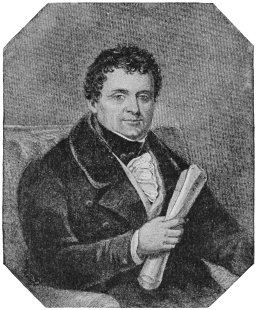
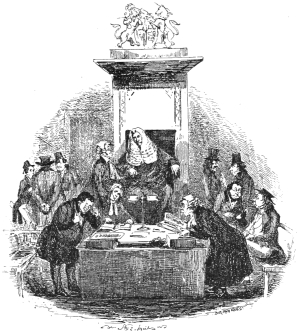
O’CONNELL TAKING THE OATHS IN THE HOUSE
(From a Drawing by ‘Phiz’ in ‘Sketches in London’)
‘One of the most extraordinary attributes in Mr. O’Connell’s oratory is the ease and facility with which he can make a transition from one topic to another. “From grave to gay, from lively to severe,” never costs him an effort. He seems, indeed, to be himself insensible of the transition. I have seen him begin his speech by alluding to topics of an affecting nature, in such a147 manner as to excite the deepest sympathy towards the sufferers in the mind of the most unfeeling person present. I have seen, in other words—I speak with regard to particular instances—the tear literally glistening in the eyes of men altogether unused to the melting mood, and in a moment afterwards, by a transition from the grave to the humorous, I have seen the whole audience convulsed with laughter. On the other hand, I have often heard him commence his speech in a strain of most exquisite humour, and, by a sudden transition to deep pathos, produce the stillness148 of death in a place in which, but one moment before, the air was rent with shouts of laughter. His mastery over the passions is the most perfect I ever witnessed, and his oratory tells with the same effect whether he addresses the “first assembly of gentlemen in the world,” or the ragged and ignorant rabble of Dublin.’
‘The most distinguished literary man in the House is Mr. E. L. Bulwer, member for Lincoln, and author of “Pelham,” “Eugene Aram,” &c. He does not speak often. When he does, his speeches are not only previously turned over with great care in his mind, but are written out at full length, and committed carefully to memory. He is a great patron of the tailor, and he is always dressed in the extreme of fashion. His manner of speaking is very affected: the management of his voice is especially so. But for this he would be a pleasant speaker. His voice, though weak, is agreeable, and he speaks with considerable fluency. His speeches are usually argumentative. You see at once that he is a person of great intellectual acquirements.’
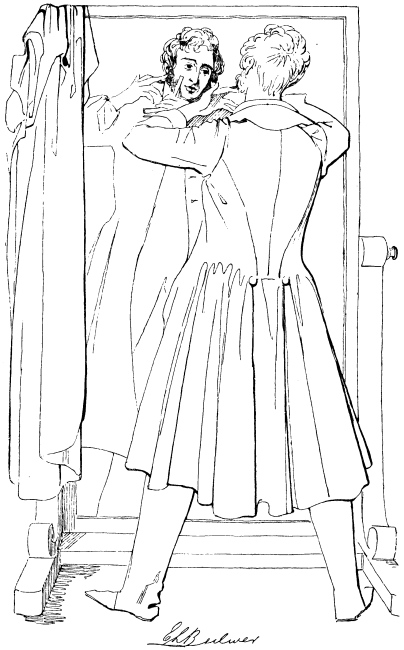
E L Bulwer
-EDWARD LYTTON BULWER-
‘Mr. D’Israeli, the member for Maidstone, is perhaps the best known among the new members who have made their débuts. As stated in my “Sketches in London,” his own private friends looked forward to his introduction into the House of Commons as a circumstance which would be immediately followed by his obtaining for himself an oratorical reputation equal to that enjoyed by the most popular speakers in that assembly. They thought he would produce an extraordinary149 sensation, both in the House and in the country, by the power and splendour of his eloquence. But the result differed from the anticipation.
‘When he rose, which he did immediately after Mr. O’Connell had concluded his speech, all eyes were fixed on him, and all ears were open to listen to his eloquence; but before he had proceeded far, he furnished a striking illustration of the hazard that attends on highly wrought expectations. After the first few minutes he met with every possible manifestation of opposition and ridicule from the Ministerial benches, and was, on the other hand, cheered in the loudest and most earnest manner by his Tory friends; and it is particularly deserving of mention, that even Sir Robert Peel, who very rarely cheers any honourable gentleman, not even the most able and accomplished speakers of his own party, greeted Mr. D’Israeli’s speech with a prodigality of applause which must have been severely trying to the worthy baronet’s lungs.
‘At one time, in consequence of the extraordinary interruptions he met with, Mr. D’Israeli intimated his willingness to resume his seat, if the House wished him to do so. He proceeded, however, for a short time longer, but was still assailed by groans and under-growls in all their varieties; the uproar, indeed, often became so great as completely to drown his voice.
‘At last, losing all temper, which until now he had preserved in a wonderful manner, he paused in the midst of a sentence, and, looking the Liberals indignantly150 in the face, raised his hands, and, opening his mouth as wide as its dimensions would permit, said, in remarkably loud and almost terrific tones—“Though I sit down now, the time will come when you will hear me.” Mr. D’Israeli then sat down amidst the loudest uproar.
‘The exhibition altogether was a most extraordinary one. Mr. D’Israeli’s appearance and manner were very singular. His dress also was peculiar; it had much of a theatrical aspect. His black hair was long and flowing, and he had a most ample crop of it. His gesture was abundant; he often appeared as if trying with what celerity he could move his body from one side to another, and throw his hands out and draw them in again. At other times he flourished one hand before his face, and then the other. His voice, too, is of a very unusual kind: it is powerful, and had every justice done to it in the way of exercise; but there is something peculiar in it which I am at a loss to characterise. His utterance was rapid, and he never seemed at a loss for words. On the whole, and notwithstanding the result of his first attempt, I am convinced he is a man who possesses many of the requisites of a good debater. That he is a man of great literary talent, few will dispute.’
Lastly, here is a contemporary judgment on Gladstone. The italics are my own.
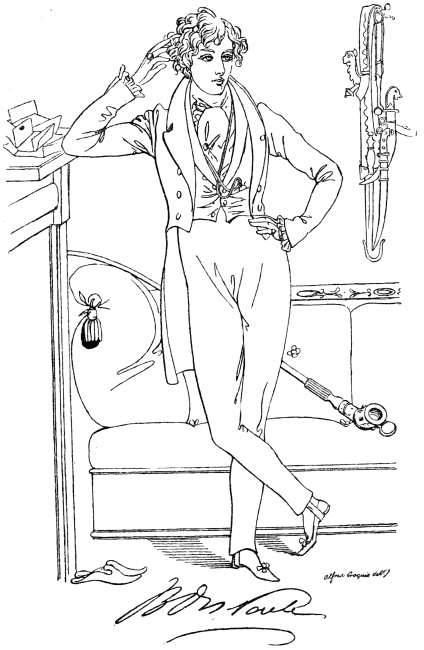
B D’Israeli
-BENJAMIN D’ISRAELI-
‘Mr. Gladstone, the member for Newark, is one of the most rising young men on the Tory side of the House. His party expect great things from him; and151 certainly, when it is remembered that his age is only twenty-five, the success of the Parliamentary efforts he has already made justifies their expectations. He is well informed on most of the subjects which usually occupy the attention of the Legislature, and he is happy in turning his information to a good account. He is ready, on all occasions which he deems fitting ones, with a speech in favour of the policy advocated by the party with whom he acts. His extemporaneous resources are ample. Few men in the House can improvisate better. It does not appear to cost him an effort to speak. He is a man of very considerable talent, but has nothing approaching to genius. His abilities are much more the result of an excellent education, and of mature study, than of any prodigality on the part of Nature in the distribution of mental gifts. I have no idea that he will ever acquire the reputation of a great statesman. His views are not sufficiently profound or enlarged for that; his celebrity in the House of Commons will chiefly depend on his readiness and dexterity as a debater, in conjunction with the excellence of his elocution, and the gracefulness of his manner when speaking. His style is polished, but has no appearance of the effect of previous preparation. He displays considerable acuteness in replying to an opponent; he is quick in his perception of anything vulnerable in the speech to which he replies, and happy in laying the weak point bare to the gaze of the House. He now and then indulges in sarcasm, which is, in most cases, very felicitous.152 He is plausible even when most in error. When it suits himself or his party, he can apply himself with the strictest closeness to the real point at issue; when to evade that point is deemed most politic, no man can wander from it more widely.
‘The ablest speech he ever made in the House, and by far the ablest on the same side of the question, was when opposing, on the 30th of March last, Sir George Strickland’s motion for the abolition of the negro apprenticeship system on the 1st of August next. Mr. Gladstone, I should here observe, is himself an extensive West India planter.
‘Mr. Gladstone’s appearance and manners are much in his favour. He is a fine-looking man. He is about the usual height, and of good figure. His countenance is mild and pleasant, and has a highly intellectual expression. His eyes are clear and quick. His eyebrows are dark and rather prominent. There is not a dandy in the House but envies what Truefitt would call his ‘fine head of jet-black hair.’ It is always carefully parted from the crown downwards to his brow, where it is tastefully shaded. His features are small and regular, and his complexion must be a very unworthy witness, if he does not possess an abundant stock of health.’
So the ghost of the first Victorian Parliament vanishes. All are gone except Mr. Gladstone himself. Whether the contemporary judgment has proved well founded or not, is for the reader to determine. For my153 own part, I confess that my opinion of the author of ‘Random Recollections’ was greatly advanced when I had read this judgment on the members. We who do not sit in the galleries, and are not members, lose the enormous advantage of actually seeing the speakers and hearing the debates. The reported speech is not the real speech; the written letter remains; but the fire of the orator flames and burns, and passes away. Those know not Gladstone who have never seen him and heard him speak.
And as for that old man eloquent, when he closes his eyes in the House where he has fought so long, the voices around him may well fall unheeded on his ear, while a vision of the past shows him once more Peel and Stanley, Lord John and Palmerston, O’Connell and Roebuck, and, adversary worthiest of all, the man whom the House at his first attempt hooted down and refused to hear—the great and illustrious Dizzy.
154
CHAPTER X.
AT SCHOOL AND UNIVERSITY.
The great schools had no new rivals; all the modern public schools—Cheltenham, Clifton, Marlborough, and the like—have sprung into existence or into importance since the year 1837. Those who did not go to the public schools had their choice between small grammar schools and private schools. There were a vast number of private schools. It was, indeed, recognised that when a man could do nothing else and had failed in everything that he had tried, a private school was still possible for him. The sons of the lower middle-class had, as a rule, no choice but to go to a private school. At the grammar school they taught Greek and Latin—these boys wanted no Greek and no Latin; they wanted a good ‘commercial’ education; they wanted to learn bookkeeping and arithmetic, and to write a good hand. Nothing else was of much account. Again, all the grammar schools belonged to the Church of England; sons of Nonconformists were, therefore, excluded, and had to go to the private school.
The man who kept a private school was recommended155 for his cheapness as much as for his success in teaching. As for the latter, indeed, there were no local examinations held by the Universities, and no means of showing whether he taught well or ill. Probably, in the five or six years spent at his school, boys learned what their parents mostly desired for them, and left school to become clerks or shopmen. The school fees were sometimes as low as a guinea a quarter. The classes were taught by wretchedly paid ushers; there was no attention paid to ventilation or hygienic arrangements; the cane was freely used all day long. Everybody knows the kind of school; you can read about it in the earlier pages of ‘David Copperfield,’ and in a thousand books besides.
In the public schools, where the birch flourished rank and tall and in tropical luxuriance, Latin and Greek were the only subjects to which any serious attention was given. No science was taught; of modern languages, French was pretended; history and geography were neglected; mathematics were a mere farce. As regards the tone of the schools, perhaps we had better not inquire. Yet that the general life of the boys was healthy is apparent from the affection with which elderly men speak of their old schools. There were great Head Masters before Arnold; and there were public schools where manliness, truth, and purity were cultivated besides Rugby. One thing is very certain—that the schools turned out splendid scholars, and their powers of writing Latin and Greek verse156 were wonderful. A year ago we were startled by learning that a girl had taken a First Class in the Classical Tripos at Cambridge. This, to some who remembered the First Class of old, seemed a truly wonderful thing. Some even wanted to see her iambics. Alas! a First Class can now be got without Greek iambics. What would they have said at Westminster fifty years ago if they had learned that a First Class could be got at Cambridge without Greek or Latin verse? What is philology, which can be crammed, compared with a faultless copy of elegiacs, which no amount of cramming, even of the female brain, can succeed in producing?
The Universities were still wholly in the hands of the Church. No layman, with one or two exceptions, could be Head of a College; all the Fellowships—or very nearly all—were clerical; the country living was the natural end of the Fellowship; no Dissenters, Jews, or Catholics were admitted into any College unless they went through the form of conforming to the rules as regards Chapel; no one could be matriculated without signing the Thirty-nine Articles—nearly twenty years later I had, as a lad of seventeen, to sign that unrelenting definition of Faith on entering King’s College, London. Perhaps they do it still at that seat of orthodoxy. Tutors and lecturers were nearly all in orders. Most of the men intended to take orders, many of them in order to take family livings.
The number of undergraduates was about a third157 of that now standing on the College books. And the number of reading men—those who intended to make their University career a stepping-stone or a ladder—was far less in proportion to the number of ‘poll’ men than at the present day. The ordinary degree was obtained with even less difficulty than at present.
There were practically only two Triposes at Cambridge—the Mathematical and the Classical—instead of the round dozen or so which now offer their honours to the student. No one could get a Fellowship except through those two Triposes. As for the Fellowships and Scholarships, indeed, half of them were close—that is to say, confined to students from certain towns, or certain counties, or certain schools; while at one College, King’s, both Fellowships and Scholarships were confined to ‘collegers’ of Eton, and the students proceeded straight to Fellowships without passing through the ordeal of the Senate House.
Dinner was at four—a most ungodly hour, between lunch and the proper hour for dinner. For the men who read, it answered pretty well, because it gave them a long evening for work; for the men who did not read, it gave a long evening for play.
There was a great deal of solid drinking among the men, both Fellows and undergraduates. The former sat in Combination Room after Hall and drank the good old College port; the latter sat in each other’s rooms and drank the fiery port which they bought in the town. In the evening there were frequent suppers, with milk-punch158 and songs. I wonder if they have the milk-punch still; the supper I think they cannot have, because they all dine at seven or half-past seven, after which it is impossible to take supper.
In those days young noblemen went up more than they do at present, and they spread themselves over many colleges. Thus at Cambridge they were found at Trinity, John’s, and Magdalene. A certain Cabinet thirty years ago had half its members on the books of St. John’s. In these days all the noblemen who go to Cambridge flock like sheep to Trinity. There seems also to have been gathered at the University a larger proportion of county people than in these later years, when the Universities have not only been thrown open to men of all creeds, but when men of every class find in their rich endowments and prizes a legitimate and laudable way of rising in the world. ‘The recognised way of making a gentleman now,’ says Charles Kingsley in ‘Alton Locke,’ ‘is to send him to the University.’ I do not know how Charles Kingsley was made a gentleman, but it is certainly a very common method of advancing your son if he is clever. Formerly it meant ambition in the direction of the Church. Now it means many other things—the Bar—Journalism—Education—Science—Archæeology—a hundred ways in which a ‘gentleman’ may be made by first becoming a scholar. Nay, there are dozens of men in the City who have begun by taking their three years on the banks of the Cam or the Isis. For what purposes do the Universities159 exist but for the encouragement of learning? And if the country agree to call a scholar a gentleman—as it calls a solicitor a gentleman—by right of his profession, so much the better for the country. But Kingsley was born somewhere about the year 1820, which was still very much in the eighteenth century, when there were no gentlemen recognised except those who were gentlemen by birth.
With close Fellowships, tied to the Church of England, with little or no science, Art, archæology, philology, Oriental learning, or any of the modern branches of learning, with a strong taste for port, and undergraduates drawn for the most part from the upper classes, the Universities were different indeed from those of the present day.
As for the education of women, it was like unto the serpents of Ireland. Wherefore we need not devote a chapter to this subject at all.
160
CHAPTER XI.
THE TAVERN.
The substitution of the Restaurant for the Tavern is of recent origin. In the year 1837 there were restaurants, it is true, but they were humble places, and confined to the parts of London frequented by the French; for English of every degree there was the Tavern. Plenty of the old Taverns still survive to show us in what places our fathers took their dinners and drank their punch. The Cheshire Cheese is a survival; the Cock, until recently, was another. Some of them, like the latter, had the tables and benches partitioned off; others, like the former, were partly open and partly divided. The floor was sanded; there was a great fire kept up all through the winter, with a kettle always full of boiling water; the cloth was not always of the cleanest; the forks were steel; in the evening there was always a company of those who supped—for they dined early—on chops, steaks, sausages, oysters, and Welsh rabbit, of those who drank, those who smoked their long pipes, and those who sang. Yes—those who sang. In those days the song went round. If three or four Templars supped at the161 Coal Hole, or the Cock, or the Rainbow, one of them would presently lift his voice in song, and then be followed by a rival warbler from another box. At the Coal Hole, indeed—where met the once famous Wolf Club, Edmund Kean, President—the landlord, one Rhodes by name, was not only a singer but a writer of songs, chiefly, I apprehend, of the comic kind. I suppose that the comic song given by a private gentleman in character—that is, with a pocket-handkerchief for a white apron,162 or his coat off, or a battered hat on his head—is almost unknown to the younger generation. They see the kind of thing, but done much better, at the music-halls.
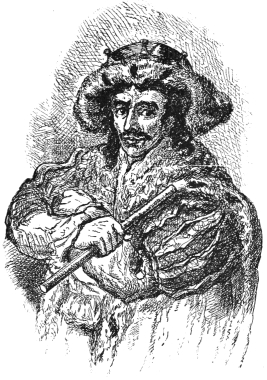
Really, nothing marks the change of manners more than the fact that fifty years ago men used to meet together every evening and sing songs over their pipes and grog. Not young men only, but middle-aged men, and old men, would all together join in the chorus, and that joyfully, banging the tables with their fists, and laughing from ear to ear—the roysterers are always represented as laughing with an absence of restraint impossible for us quite to understand. The choruses, too, were of the good old ‘Whack-fol-de-rol-de-rido’ character, which gives scope to so much play of sentiment and lightness of touch.
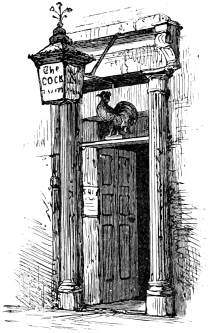
Beer, of course, was the principal beverage, and there were many more varieties of beer than at present prevail. One reads of ‘Brook clear Kennett’—it used to be sold in a house near the Oxford Street end of Tottenham Court Road; of Shropshire ale, described as ‘dark and heavy;’ of the ‘luscious Burton, innocent of hops;’ of new ale, old ale, bitter ale, hard ale, soft ale, the ‘balmy’ Scotch, mellow October, and good brown stout. All these were to be obtained at taverns which made a spécialité as they would say now, of any one kind. Thus the best stout in London was to be had at the Brace Tavern in the Queen’s Bench Prison, and the Cock was also famous for the same beverage, served in pint glasses. A rival of the Cock, in this respect, was the Rainbow,163 long before the present handsome room was built. The landlord of the Rainbow was one William Colls, formerly head-waiter at the Cock, predecessor, I take it, of Tennyson’s immortal friend. But he left the Cock to better himself, and as at the same time Mary—the incomparable, the matchless Mary, most beautiful of barmaids—left it as well, gloom fell upon the frequenters of the tavern. Mary left the Cock about the year 1820, too early for the future Poet Laureate to have been one of the worshippers of her Grecian face. Under Colls’s management the Rainbow rivalled the Cock in popularity. The Cider Cellar, kept by Evans of Covent Garden, had gone through a period of decline, but was again popular and well frequented. Mention may also be made of Clitter’s, of Offley’s, famous for its lamb in spring; of the Kean’s Head, whose landlord was a great comic singer; of the Harp, haunt of aspiring actors; of the Albion, the Finish, or the Royal Saloon, Piccadilly, where one looked in for a ‘few goes of max’—what was164 max?—in the very worst company that London could supply.
It is the fashion to lament the quantity of money still consumed in drink. But our drink-bill is nothing, in proportion, compared with that of fifty years ago. Thus, the number of visitors to fourteen great gin-shops in London was found to average 3,000 each per diem; in Edinburgh there was a gin-shop for every fifteen families; in one Irish town of 800 people there were eighty-eight gin-shops; in Sheffield, thirteen persons were killed in ten days by drunkenness; in London there was one public-house to every fifty-six houses; in Glasgow one to every ten. Yet it was noted at the time that a great improvement could be observed in the drinking habits of the people. In the year 1742, for instance, there were 19,000,000 gallons of spirits consumed by a population of 6,000,000—that is to say, more than three gallons a head every year; or, if we take only the adult men, something like twelve gallons for every man in the year, which may be calculated to mean one bottle in five days. But a hundred years later the population had increased to 16,000,000, and the consumption of spirits had fallen to 8,250,000 gallons, which represents a little more than half a gallon, or four pints, a head in the year. Or, taking the adult men only, their average was two gallons and one sixteenth a head, so that each man’s pint bottle would have lasted him for three weeks. In Scotland, however, the general average was twenty-seven pints a head, and, taking adults alone, thirteen165 gallons and a half a head; and in Ireland six and a half gallons a head. It was noted, also, in the year 1837, that the multiplication of coffee-houses, of which there were 1,600 in London alone, proved the growth of more healthy habits among the people.
But though there was certainly more moderation in drink than in the earlier years of the century, the drink-bill for the year 1837 was prodigious. A case of total abstinence was a phenomenon. The thirst for beer was insatiable; with many people, especially farmers, and the working classes generally, beer was taken with breakfast. Even in my own time—that is to say, when the Queen had been reigning for one-and-twenty years or so—there were still many undergraduates at Cambridge who drank beer habitually for breakfast, and at every breakfast-party the tankard was passed round as a finish. In country houses, the simple, light, home-brewed ale, the preparation of which caused a most delightful anxiety as to the result, was the sole beverage used at dinner and supper. Every farmhouse, every large country house, and many town house keepers brewed their own beer, just as they made their own wines, their own jams, and their own lavender water. Beer was universally taken with dinner; even at great dinner-parties some of the guests would call for beer, and strong ale was always served with the cheese. After dinner, only port and sherry, in middle-class houses, were put upon the table. Sometimes Madeira or Lisbon appeared, but, as a rule, wine meant port or sherry, unless, which sometimes166 happened, it meant cowslip, ginger, or gooseberry. Except among the upper class, claret was absolutely unknown, as were Burgundy, Rhone wines, Sauterne, and all other French wines. In the restaurants every man would call for bitter ale, or stout, or half-and-half with his dinner, as a matter of course, and after dinner would either take his pint of port, or half-pint of sherry, or his tumbler of grog. Champagne was regarded as the drink of the prodigal son. In the family circle it never appeared at all, except at weddings, and perhaps on Christmas Day.
In fact, when people spoke of wine in these days, they generally meant port. They bought port by the hogshead, had it bottled, and laid down. They talked about their cellars solemnly; they brought forth bottles which had been laid down in the days when George the Third was king; they were great on body, bouquet, and beeswing; they told stories about wonderful port which they had been privileged to drink; they looked forward to a dinner chiefly on account of the port which followed it; real enjoyment only began when the cloth was removed, the ladies were gone, and the solemn passage of the decanter had commenced.
There lingers still the old love for this wine—it is, without doubt, the king of wines. I remember ten years ago, or thereabouts, dining with one—then my partner—now, alas! gathered to his fathers—at the Blue Posts, before that old inn was burned down. The room was a comfortable old-fashioned first floor, low of167 ceiling; with a great fire in an old-fashioned grate; set with four or five tables only, because not many frequented this most desirable of dining-places. We took with dinner a bottle of light claret; when we had got through the claret and the beef, the waiter, who had been hovering about uneasily, interposed. ‘Don’t drink any more of that wash,’ he said; ‘let me bring you something fit for gentlemen to sit over.’ He brought us, of course, a bottle of port. They say that the taste for port is reviving; but claret has got so firm a hold of our affections that I doubt it.
As for the drinking of spirits, it was certainly much more common then than it is now. Among the lower classes gin was the favourite—the drink of the women as much as of the men. Do you know why they call it ‘blue ruin’? Some time ago I saw, going into a public-house, somewhere near the West India Docks, a tall lean man, apparently five-and-forty or thereabouts. He was in rags; his knees bent as he walked, his hands trembled, his eyes were eager. And, wonderful to relate, the face was perfectly blue—not indigo blue, or azure blue, but of a ghostly, ghastly, corpse-like kind of blue, which made one shudder. Said my companion to me, ‘That is gin.’ We opened the door of the public-house and looked in. He stood at the bar with a full glass in his hand. Then his eyes brightened, he gasped, straightened himself, and tossed it down his throat. Then he came out, and he sighed as one who has just had a glimpse of some earthly Paradise. Then he walked away with swift and168 resolute step, as if purposed to achieve something mighty. Only a few yards farther along the road, but across the way, there stood another public-house. The man walked straight to the door, entered, and took another glass, again with the quick grasp of anticipation, and again with that sigh, as of a hurried peep through the gates barred with the sword of fire. This man was a curious object of study. He went into twelve more public-houses, each time with greater determination on his lips and greater eagerness in his eyes. The last glass, I suppose, opened these gates for him and suffered him to enter, for his lips suddenly lost their resolution, his eyes lost their lustre, he became limp, his arms fell heavily—he was drunk, and his face was bluer than ever.
This was the kind of sight which Hogarth could see every day when he painted ‘Gin Lane.’ It was in the time when drinking-shops had placards stuck outside to the effect that for a penny one might get drunk, and blind drunk for twopence. But an example of a ‘blue ruin,’ actually walking in the flesh, in these days one certainly does not expect to see. Next to gin, rum was the most popular. There is a full rich flavour about rum. It is affectionately named after the delicious pineapple, or after the island where its production is the most abundant and the most kindly. It has always been the drink of Her Majesty’s Navy; it is still the favourite beverage of many West India Islands, and many millions of sailors, niggers, and coolies. It is hallowed by historical169 associations. But its effects in the good old days were wonderful and awe-inspiring. It was the author and creator of those flowers, now almost extinct, called grog-blossoms. You may see them depicted by the caricaturists of the Rowlandson time, but they survived until well past the middle of the century.
The outward and visible signs of rum were indeed various. First, there was the red and swollen nose; next, the nose beautifully painted with grog-blossoms. It is an ancient nose, and is celebrated by the bacchanalian poet of Normandy, Olivier Basselin, in the fifteenth century. There was, next, the bottle nose in all its branches. I am uncertain, never having walked the hospitals, whether one is justified in classifying certain varieties of the bottle nose under one head, or whether each variety was a species by itself. All these noses, with the red and puffy cheeks, the thick lips, the double chins, the swelling, aldermanic corporation, and the gouty feet, in list and slippers, meant Rum—Great God Rum. These symptoms are no longer to be seen. Therefore, Great God Rum is either deposed, or he hath but few worshippers, and those half-hearted.
The decay of the Great God Rum, and the Great Goddess Gin his consort, is marked in many other ways. Formerly, the toper half filled a thick, short rummer with spirit, and poured upon it an equal quantity of water. Mr. Weller’s theory of drink was that it should be equal. The modern toper goes to a bar, gets half a wineglass of Scotch whisky, and pours upon it a pint170 of Apollinaris water. The ancient drank his grog hot, with lemon and sugar, and sometimes spice. This made a serious business of the nightly grog. The modern takes his cold, even with ice, and without any addition of lemon. Indeed, he squashes his lemon separately, and drinks the juice in Apollinaris, without any spirit at all—a thing abhorrent to his ancestor.
Again, there are preparations of a crafty and cryptic character, once greatly in favour, and now clean forgotten, or else fallen into a pitiable contempt, and doomed to a stumbling, halt, and broken-winged existence. Take, for instance, the punch-bowl. Fifty years ago it was no mere ornament for the sideboard and the china cabinet. It was a thing to be brought forth and filled with a fragrant mixture of rum, brandy, and curaçoa, lemon, hot water, sugar, grated nutmeg, cloves, and cinnamon. The preparation of the bowl was as much a labour of love as that of a claret cup, its degenerate successor. The ladles were beautiful works of art in silver—where are those ladles now, and what purpose do they serve? Shrub, again—rum shrub—is there any living man who now calls for shrub? You may still see it on the shelf of an old-fashioned inn; you may even see the announcement that it is for sale painted on door-posts, but no man regardeth it. I believe that it was supposed to possess valuable medicinal properties, the nature of which I forget. Again, there was purl—early purl. Once there was a club in the neighbourhood of Covent Garden, which existed for171 the purpose of arising betimes, and drinking purl before breakfast. Or there was dog’s-nose. Gentle reader, you remember the rules for making dog’s-nose. They were explained at a now famous meeting of the Brick Lane Branch of the Grand Junction Ebenezer Temperance Association. Yet I doubt whether dog’s-nose is still in favour. Again, there was copus—is the making of copus-cup still remembered? There was bishop: it was a kind of punch, made of port wine instead of rum, and was formerly much consumed at the suppers of undergraduates; it was remarkable for its power of making men’s faces red and their voices thick; it also made them feel as if their legs and arms, and every part of them, were filled out and distended, as with twice the usual quantity of blood. These were, no doubt, valuable qualities, considered medicinally, yet bishop is no longer in demand. Mulled ale is still, perhaps, cultivated. They used to have pots made for the purpose of warming the ale: these were long and shaped like an extinguisher, so that the heat of the fire played upon a large surface, and warmed the beer quickly. When it was poured out, spice was added, and perhaps sugar, and no doubt a dash of brandy. Negus, a weak compound of sherry and warm water, used to be exhibited at dancing parties, but is now, I should think, unknown save by name. I do not speak of currant gin, damson brandy, or cherry brandy, because one or two such preparations are still produced. Nor need we consider British wines, now almost extinct. Yet in country towns one may172 here and there find shops where they provide for tastes still simple—the cowslip, delicate and silky to the palate; the ginger, full of flavour and of body; the red currant, rich and sweet—a ladies’ wine; the gooseberry, possessing all the finer qualities of the grape of Epernay; the raisin, with fine Tokay flavour; or the raspberry, full of bouquet and of beeswing. But their day is passed—the British wines are, practically, made no more. All these drinks, once so lovingly prepared and so tenderly cherished, are now as much forgotten as the toast in the nut-brown ale, or the October humming ale, or the mead drunk from the gold-rimmed horn—they still drink something out of a gold-rimmed horn in the Hall of Corpus Christi, Cambridge; or the lordly ‘ypocras’ wherewith Sir Richard Whittington entertained his Sovereign, what day he concluded the banquet by burning the King’s bonds; or the once-popular mixture of gin and noyau; or the cup of hot saloop from the stall in Covent Garden, or on the Fleet Bridge.
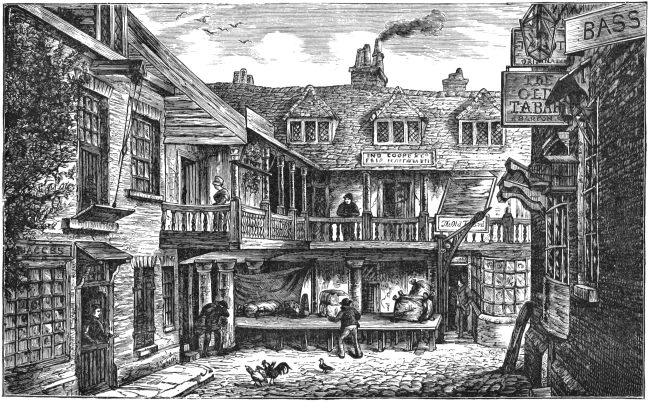
The Tavern! We can hardly understand how large a place it filled in the lives of our forefathers, who did not live scattered about in suburban villas, but over their shops and offices. When business was over, all of every class repaired to the Tavern. Dr. Johnson spent the evenings of his last years wholly at the Tavern; the lawyer, the draper, the grocer, the bookseller, even the clergy, all spent their evenings at the Tavern, going home in time for supper with their families. You may see the kind of Tavern life in any small country town174 to this day, where the shopkeepers assemble every evening to smoke and talk together. The Tavern was far more than a modern club, because the tendency of a club is to become daily more decorous, while the Tavern atmosphere of freedom and the equality of all comers prevented the growth of artificial and conventional restraints. Something of the Tavern life is left still in London; but not much. The substantial tradesman is no longer resident; there are no longer any clubs which meet at Taverns; and the old inns, with their sanded floors and great fireplaces, are nearly all gone. The Swan with Two Necks, the Belle Sauvage, the Tabard, the George and Vulture, the Bolt-in-Tun—they have either ceased their existence, or their names call forth no more associations of good company and good songs. The Dog and Duck, the Temple of Flora, Apollo’s Gardens, the Bull in the Pound, the Blue Lion of Gray’s Inn Lane—what memories linger round these names? What man is now living who can tell us where they were?


175
CHAPTER XII.
IN CLUB- AND CARD-LAND.
Club-land was a comparatively small country, peopled by a most exclusive race. There were twenty-five clubs in all,4 and, as many men had more than one club, and the average membership was less than a thousand, there were not more than 20,000 men altogether who belonged to clubs. There are now at least 120,000, with nearly a hundred clubs, to which almost any man might belong. Besides these, there are now about sixty second-class clubs, together with a great many clubs which exist for special purposes—betting and racing clubs, whist clubs, gambling clubs, Press clubs, and so forth.
4 The following is the complete list of clubs, taken from the New Monthly Magazine of the year 1835:—Albion, Alfred, Arthur’s, Athenæum, Boodle’s, Brookes’s, Carlton, Clarence, Cocoa-tree, Crockford’s, Garrick, Graham’s, Guards’, Oriental, Oxford and Cambridge, Portland, Royal Naval, Travellers, Union, United Service, Junior United Service, University, West Indian, White’s, Windham.
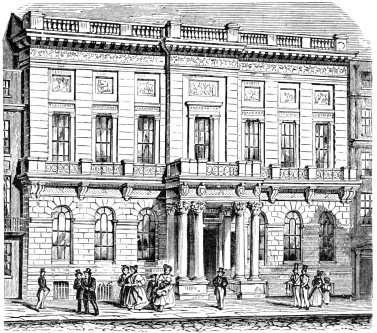
Of the now extinct clubs may be mentioned the Alfred and the Clarence, which were literary clubs. The Clarence was founded by Campbell on the ashes of the extinct Literary Club, which had been dissolved in consequence of internal dissensions. The Athenæum had176 the character which it still preserves; one of the few things in this club complained of by the members of 1837 was the use of gas in the dining-room, which produced an atmosphere wherein, it was said, no animals ungifted with copper lungs could long exist. The Garrick Club was exclusively theatrical. The Oriental was, of course, famous for curry and Madeira, the Union had a sprinkling of City men in it, the United University was famous for its iced punch, and the Windham was the first club which allowed strangers to dine within its walls. Speaking generally, no City men at all, nor any who were connected in any way with trade, were admitted177 into the clubs of London. A barrister, a physician, or a clergyman might be elected, and, of course, all men in the Services; but a merchant, an attorney, a surgeon, an architect, might knock in vain.
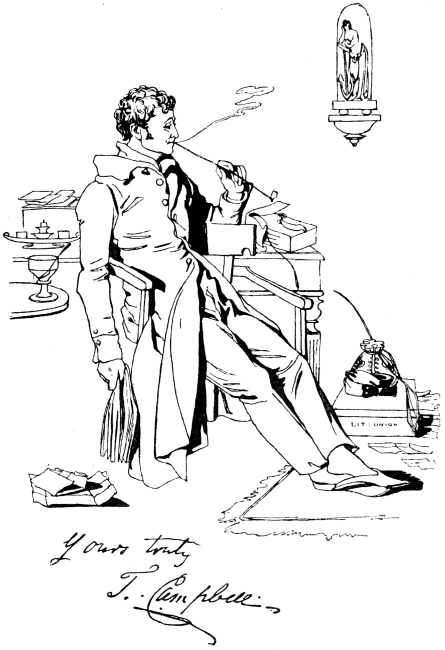
Yours truly
T. Campbell
-THOMAS CAMPBELL-
The club subscription was generally six guineas a year, and if we may judge by the fact that you could dine off the joint at the Carlton for a shilling, the clubs were much cheaper than they are now. They were also quite as dull. Thackeray describes the dulness of the club, the pride of belonging to it, the necessity of having at least one good club, the habitués of the card-room, the talk, and the scandal. But the new clubs of our day are larger: their members come from a more extended area; there are few young City men who have not their club; and it is not at all necessary to know a man because he is a member of your club. And when178 one contrasts the cold and silent coffee-room of the new great club, where the men glare at each other, with the bright and cheerful Tavern, where every man talked with his neighbour, and the song went round, and the great kettle bubbled on the hearth, one feels that civilisation has its losses.
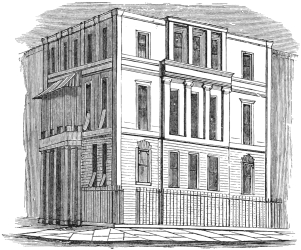
We have our gambling clubs still. From time to time there comes a rumour of high play, a scandal, or an action in the High Court of Justice for the recovery of one’s character. Baccarat is played all night by the young men; champagne is flowing for their refreshment, and sometimes a few hundreds are lost by some young fellow who can ill afford it. But these things are small and insignificant compared with the gambling club of fifty years ago.
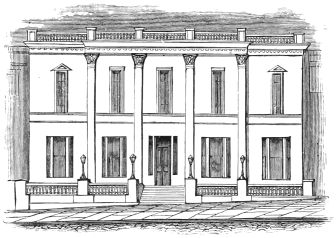
He who speaks of gambling in the year Thirty-seven, speaks of Crockford’s. Everything at Crockford’s was magnificent. The subscription was ten guineas a year, in return for which the members had the ordinary club- and coffee-rooms providing food and wine at the usual club charges—these were on the ground floor—and the run of the gambling-rooms every night, to which they could introduce guests and friends. These rooms were on the first floor: they consisted of a saloon, in which there was served every night a splendid supper, with wines of the best, free to all visitors. Crockford paid his chef a thousand guineas a year, and his assistant five hundred, and his cellar was reputed to be worth 70,000l. There were two card-rooms, one in which whist, écarté,179 and all other games were played, and a second smaller room, in which hazard alone was played. Every night at eleven the banker and proprietor himself took his seat at his desk in a corner; his croupier, sitting opposite to him in a high chair, declared the game, paid the winners, and raked in the money. Crockford’s ‘Spiders’—that is, the gentlemen who had the run of the establishment under certain implied conditions—introduced their friends to the supper and the champagne first, and to the hazard-room next. At two in the morning the doors were closed, and nobody else was admitted; but the play went on all night long. Crockford not only held the bank, but was ready to advance money to those who lost, and outside the card-room treated for reversionary interests, post-obits, and other means for raising the wind. The game was what is called ‘French Hazard,’180 in which the players play against the bank. Thousands were every night lost and won. As much as a million of money has been known to change hands in a single night, and the banker was ready to meet any stake offered. Those who lost borrowed more in order to continue the game, and lost that as well. But Crockford seems never to have been accused of any dishonourable practices. He trusted to the chances of the table, which were, of course, in his favour. In his ledgers—where are they now?—he was accustomed to enter the names of those who borrowed of him by initials or a number. He began life as a small fishmonger just within Temple Bar, and, fortunately for himself, discovered that he was endowed with a rare talent for rapid mental arithmetic, of which he made good use in betting and card-playing. The history of his gradual rise to greatness from a beginning so unpromising would be interesting, but perhaps the materials no longer exist. He was a tall and corpulent man, lame, who never acquired the art of speaking English correctly,—a thing which his noble patrons—the Duke of Wellington was a member of his club—passed over in him.
Everybody went to Crockford’s. Everybody played there. That a young fellow just in possession of a great estate should drop a few thousands in a single night’s play was not considered a thing worthy of remark; they all did it. We remember how Disraeli’s ‘Young Duke’ went on playing cards all night and all next day—was181 it not all the next night as well?—till he and his companions were up to their knees in cards, and the man who was waiting on them was fain to lie down and sleep for half an hour. The passion of gambling—it is one of those other senses outside the five old elementary endowments—possessed everybody. Cards played a far more important part in life than they do now; the evening rubber was played in every quiet house; the club card-tables were always crowded; for manly youth there were the fiercer joys of lansquenet, loo, vingt-et-un, and écarté; for the domestic circle there were the whist-table and the round table, and at the latter were played a quantity of games, such as Pope Joan, Commerce, Speculation, and I know not what, all for money, and all depending for their interest on the hope of winning and the fear of losing. Family gambling is gone. If in a genteel suburban villa one was to propose a round game, and call for the Pope Joan board, there would be a smile of wonder and pity. As well ask for a glass of negus, or call for the Caledonians at a dance!
Scandals there were, of course. Men gambled away the whole of their great estates; they loaded their property with burdens in a single night which would keep their children and their grandchildren poor. They grew desperate, and became hawks on the lookout for pigeons; they cheated at the card-table (read the famous case of Lord De Ros in this very year); they were always being detected and expelled, and so could no more show their faces at any place where gentlemen182 congregated; and sank from Crockford’s to the cheaper hells, such as the cribs where the tradesmen used to gamble, those frequented by City clerks, by gentlemen’s servants, and even those of the low French and Italians. They were illegal cribs, and informers were always getting money by causing the proprietors to be indicted. It was said of Thurtell, after he was hanged for murdering Weare, that he had offered to murder eight Irishmen, who had informed against these hells, for the consideration of 40l. a head. When they were suffered to proceed, however, the proprietors always made their fortunes. No doubt their descendants are now country gentry, and the green cloth has long since been folded up and put away in the lumber-room, with the rake and the croupier’s green shade and his chair, and the existence of these relics is forgotten.
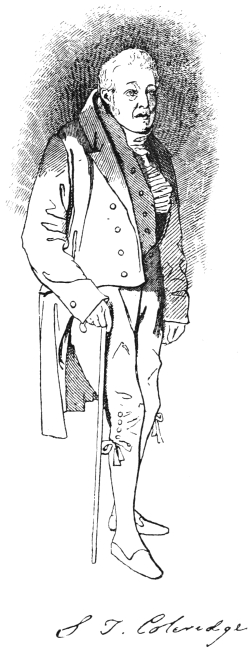
S. T. Coleridge
-SAMUEL TAYLOR COLERIDGE-
183
CHAPTER XIII.
WITH THE WITS.
The ten years of the Thirties are a period concerning whose literary history the ordinary reader knows next to nothing. Yet a good deal that has survived for fifty years, and promises to live longer, was accomplished in that period. Dickens, for example, began his career in the year 1837 with his ‘Sketches by “Boz”’ and the ‘Pickwick Papers;’ Lord Lytton, then Mr. Lytton Bulwer, had already before that year published five novels, including ‘Paul Clifford’ and ‘The Last Days of Pompeii.’ Tennyson had already issued the ‘Poems, by Two Brothers,’ and ‘Poems chiefly Lyrical.’ Disraeli had written ‘The Young Duke,’ ‘Vivian Grey,’ and ‘Venetia.’ Browning had published ‘Paracelsus’ and ‘Strafford;’ Marryat began in 1834; Carlyle published the ‘Sartor Resartus’ in 1832. But one must not estimate a period by its beginners. All these writers belong to the following thirty years of the century. If we look for those who were flourishing—that is, those who were producing their best work—it will be found that this decade was singularly poor. The principal name is184 that of Hood. There were also Hartley Coleridge, Douglas Jerrold, Procter, Sir Archibald Alison, Theodore Hook, G. P. R. James, Charles Knight, Sir Henry Taylor, Milman, Ebenezer Elliott, Harriet Martineau, James Montgomery, Talfourd, Henry Brougham, Lady Blessington, Harrison Ainsworth, and some others of lesser note. This is not a very imposing array. On the other hand, nearly all the great writers whom we associate with the first thirty years of the century were living, though their best work was done. After sixty, I take it, the hand of the master may still work with the old185 cunning, but his designs will be no longer new or bold. Wordsworth was sixty in 1830, and, though he lived for twenty years longer, and published the ‘Yarrow Revisited,’ and, I think, some of his ‘Sonnets,’ he hardly added to his fame. Southey was four years younger. He published his ‘Doctor’ and ‘Essays’ in this decade, but his best work was done already. Scott died in 1832; Coleridge died in 1834; Byron was already dead; James Hogg died in 1835; Felicia Hemans in the same year; Tom Moore was a gay young fellow of fifty in 1830, the year in which his life of Lord Byron appeared. He did very little afterwards. Campbell was two years older than Moore, and he, too, had exhausted himself. Rogers, older than any of them, had entirely concluded his poetic career. It is wonderful to think that he began to write in 1783 and died in 1855. Beckford, whose ‘Vathek’ appeared in 1786, was living until 1844. Among others who were still living in 1837 were James and Horace Smith, Wilson Croker, Miss Edgeworth, Mrs. Trollope, Lucy Aikin, Miss Opie (who lived to be eighty-five), Jane Porter (prematurely cut off at seventy-four),186 and Harriet Lee (whose immortal work, the ‘Errors of Innocence,’ appeared in 1786, when she was already thirty) lived on till 1852, when she was ninety-six. Bowles, that excellent man, was not yet seventy, and meant to live for twenty years longer. De Quincey was fifty-two in 1837, Christopher North was in full vigour, Thomas Love Peacock, who published his first novel in 1810, was destined to produce a last, equally good, in 1860; Landor, born in 1775, was not to die until 1864; Leigh Hunt, who in 1837 was fifty-three years of age, belongs to the time of Byron. John Keble, whose ‘Christian Year’ was published in 1827, was forty-four in 1837; ‘L. E. L.’ died in 1838. In America, Washington Irving, Emerson, Channing, Bryant, Whittier, and Longfellow, make a good group. In France, Chateaubriand,187 Lamartine, Victor Hugo, Béranger, Alfred de Musset, Scribe, and Dumas were all writing, a group much stronger than our English team.
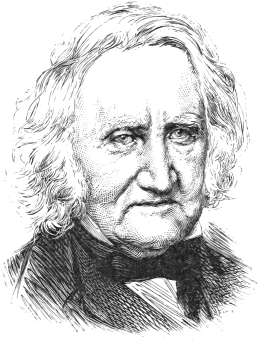
CHARLES KNIGHT
(From a Photograph by Hughes & Mullins, Regina House, Ryde, Isle of Wight)
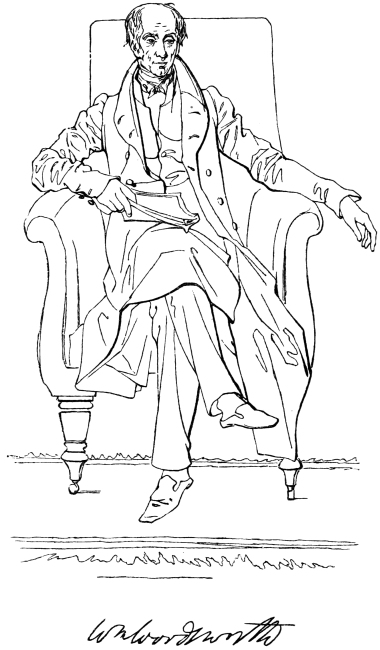
Wm Wordsworth
-WILLIAM WORDSWORTH-
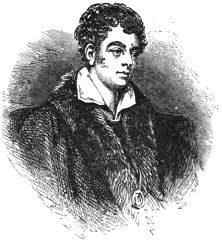
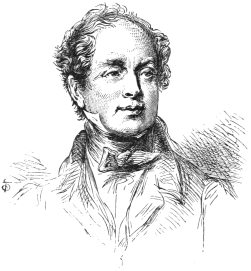
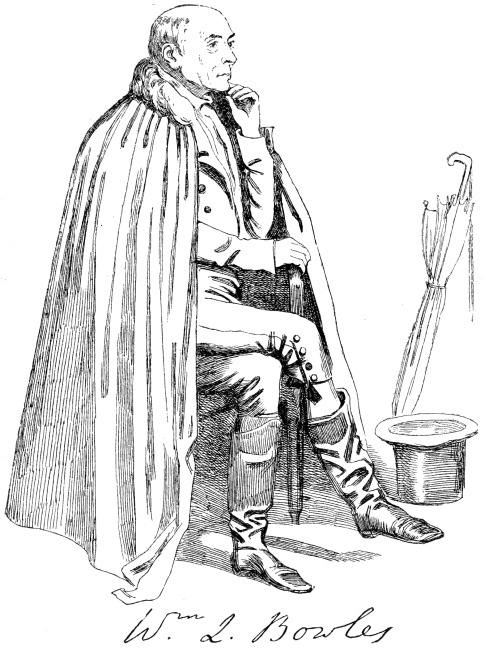
Wm. L. Bowles
-REV. WILLIAM LISLE BOWLES-

‘VATHEK’ BECKFORD
(From a Medallion)
It is difficult to understand, at first, that between the time of Scott, Wordsworth, Byron, and Keats, and that of Dickens, Thackeray, Marryat, Lever, Tennyson, Browning, and Carlyle, there existed this generation of wits, most of them almost forgotten. Those, however, who consider the men and women of the Thirties have to deal, for the most part, with a literature that is third-rate. This kind becomes dreadfully flat and stale when it has been out for fifty years; the dullest, flattest, dreariest reading that can be found on188 the shelves in the sprightly novel of Society, written in the Thirties.
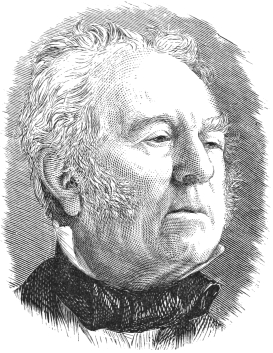
WALTER SAVAGE LANDOR
(From a Photograph by H. Watkins)
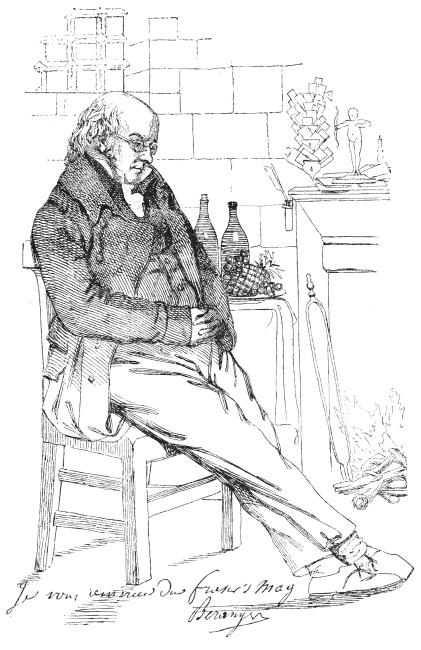
Béranger
-PIERRE-JEAN de BÉRANGER-
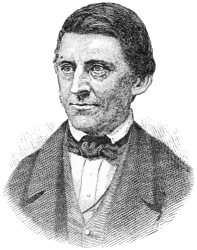
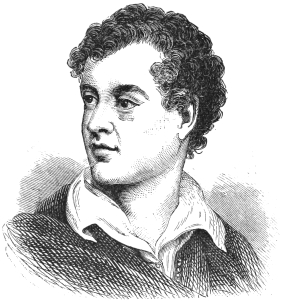
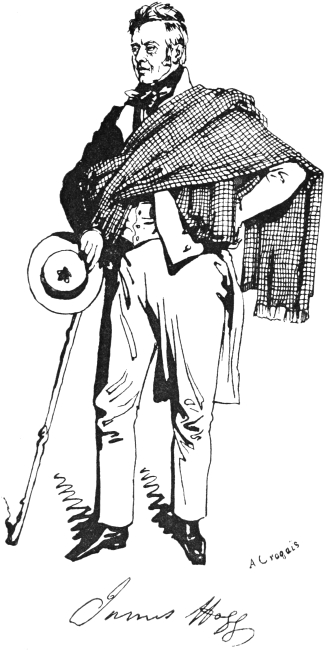
James Hogg
-JAMES HOGG-
A blight had fallen upon novels and their writers. The enormous success that Scott had achieved tempted hundreds to follow in his path, if that were possible. It was not possible; but this they could not know, because nothing seems so easy to write as a novel, and no man, of those destined to fail, can understand in what respects his own work falls short of Scott’s. That is the chief reason why he fails. Scott’s success, however,189 produced another effect. It greatly enlarged the number of novel readers, and caused them to buy up eagerly anything new, in the hope of finding another Scott. Thus, about the year 1826 there were produced as many as 250 three- and four-volume novels a year—that is to say, about as many as were published in 1886, when the area of readers has been multiplied by ten. We are also told that nearly all these novels could command a sale of 750 to 1,000 each, while anything above the average would have a sale of 1,500 to 2,000. The usual price given for these novels was, we are also told, from 200l. to 300l. In that case the publishers must have had a happy and a prosperous time, netting splendid hauls. But I think that we must take these figures with considerable deductions. There were, as yet, no circulating libraries of any importance; their place was supplied by book-clubs, to which the publishers chiefly looked for the purchase of their books. But one cannot believe that the book-clubs would take copies of all the rubbish that came out. Some of these novels I have read; some of them actually stand on my shelves; and I declare that anything more dreary and unprofitable it is190 difficult to imagine. At last there was a revolt: the public would stand this kind of stuff no longer. Down dropped the circulation of the novels. Instead of 2,000 copies subscribed, the dismayed publisher now read 50, and the whole host of novelists vanished like a swarm of midges. At the same time poetry went down too. The drop in poetry was even more terrible than that of novels. Suddenly, and without any warning, the people of Great Britain left off reading poetry. To be sure, they had been flooded with a prodigious quantity of trash. One anonymous ‘popular poet,’ whose name will never now be recovered, received 100l. for his last poem from a publisher who thought, no doubt, that the ‘boom’ was going to last. Of this popular poet’s work he sold exactly fifty copies. Another, a ‘humorous’ bard, who also received a large sum for his immortal poem, showed in the unhappy publisher’s books no more than eighteen copies sold. This was too ridiculous, and from that day to this the trade side of poetry has remained under a cloud. That of novelist has, fortunately for some, been redeemed from contempt by the enormous success of Dickens, Thackeray, George Eliot, and by the solid, though substantial, success of the lesser lights. Poets have now to pay for the publication of their own works, but novelists—some191192 of them—command a price; those, namely, who do not have to pay for the production of their works.
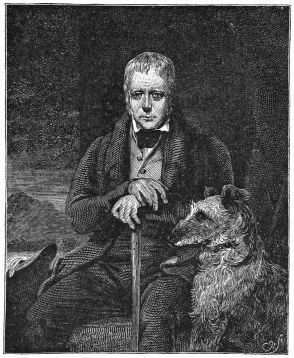
The popular taste, thus cloyed with novels and poetry, turned to books on popular science, on statistics, on health, and on travel. Barry Cornwall’s ‘Life of Kean,’ Campbell’s ‘Life of Siddons,’ the Lives of Sale, Sir Thomas Picton, and Lord Exmouth, for example, were all well received. So Ross’s ‘Arctic Seas,’ Lamartine’s ‘Pilgrimage,’ Macfarlane’s ‘Travels in the East,’ Holman’s ‘Round the World,’ and Quin’s ‘Voyage down the Danube,’ all commanded a sale of 1,000 copies each at least. Works of religion, of course, always succeed, if they are written with due regard to the religious leaning of the moment. It shows how religious fashions change when we find that the copyright of the works of Robert Hall realised 4,000l. and that of Charles Simeon’s books 5,000l.; while of the Rev. Alexander Fletcher’s ‘Book of Family Devotions,’ published at 24s., 2,000 copies were sold on the day of publication. I dare say the same thing would happen again to-day if another Mr. Fletcher were to hit upon another happy thought in the way of a religious book.
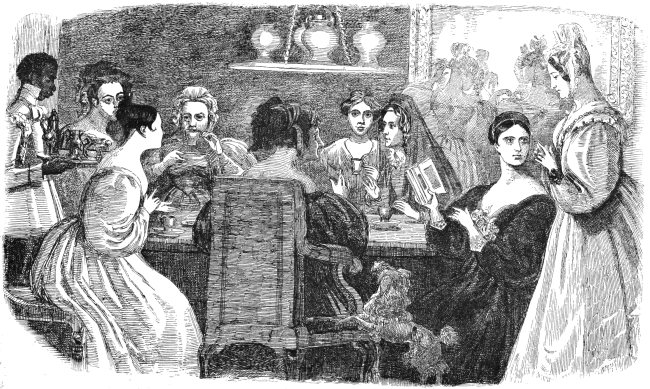
I think that one of the causes of the decay of trade as regards poetry and fiction may have been the badness of the annuals. You will find in any old-fashioned library copies of the ‘Keepsake,’ the ‘Forget-me-Not,’ the ‘Book of Beauty,’ ‘Flowers of Loveliness,’ Finden’s ‘Tableaux,’ ‘The Book of Gems,’ and others of that now extinct tribe. They were beautifully printed on the193 finest paper; they were illustrated with the most lovely steel engravings, the like of which could not now be had at any price; they were bound in brown and crimson watered silk, most fascinating to look upon; and194 they were published at a guinea. As for their contents, they were, to begin with, written almost entirely by ladies and gentlemen with handles to their names, each number containing in addition two or three papers by commoners—mere literary commoners—just to give a flavouring of style. In the early Thirties it was fashionable for lords and ladies to dash off these trifles. Byron was a gentleman; Shelley was a gentleman; nobody else, to be sure, among the poets and wits was a gentleman—yet if Byron and Shelley condescended to bid for fame and bays, why not Lord Reculver, Lady Juliet de Dagenham, or the Hon. Lara Clonsilla? I have before me the ‘Keepsake’ for the year 1831. Among the authors are Lord Morpeth, Lord Nugent, Lord Porchester, Lord John Russell, the Hon. George Agar Ellis, the Hon. Henry Liddell, the Hon. Charles Phipps, the Hon. Robert Craddock, and the Hon. Grantley Berkeley. Among the ladies are the Countess of Blessington, ‘L. E. L.,’ and Agnes Strickland. Theodore Hook supplies the professional part. The illustrations are engraved from pictures and drawings by Eastlake, Corbould, Westall, Turner, Smirke, Flaxman, and other great artists. The result, from the literary point of view, is a collection much lower in point of interest and ability than the worst number of the worst shilling magazine of the present day. I venture to extract certain immortal lines contributed by Lord John Russell, who is not generally known as a poet. They are ‘written at Kinneil, the residence of the late Mr. Dugald Stewart.’
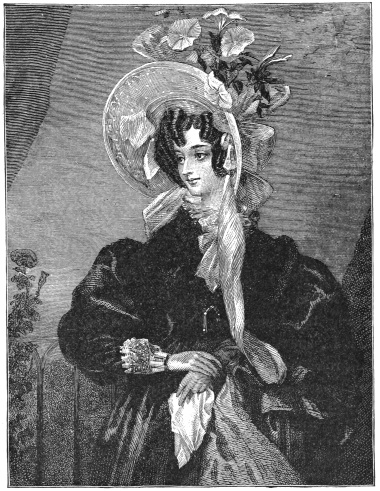
A FASHIONABLE BEAUTY OF 1837
(By A. E. Chalon, R.A.)
195
To nearer orbs the source of life and light;
Each star resplendent on its radiant throne
Gilds other systems and supports its own.
Thus we see Stewart, in his fame reclined,
Enlighten all the universe of mind;
To some for wonder, some for joy appear,
Admired when distant and beloved when near.
’Twas he gave rules to Fancy, grace to Thought,
Taught Virtue’s laws, and practised what he taught.
Dear me! Something similar to the last line one remembers written by an earlier bard. In the same way Terence has been accused of imitating the old Eton Latin Grammar.
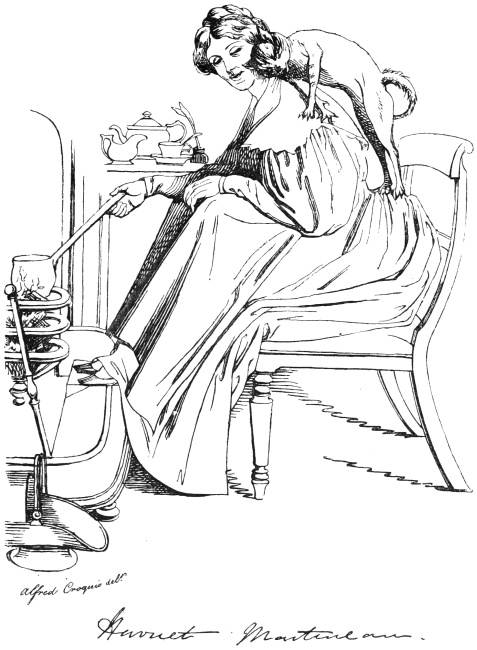
Harriet Martineau
-HARRIET MARTINEAU-
Somewhere about the year 1837 the world began to kick at the ‘Keepsakes,’ and they gradually got extinguished. Then the lords and the countesses put away their verses and dropped into prose, and, to the infinite loss of mankind, wrote no more until editors of great monthlies, anxious to show a list of illustrious names, began to ask them again.
As for the general literature of the day, there must have been a steady demand for new works of all kinds, for it was estimated that in 1836 there were no fewer than four thousand persons living by literary work. Most of them, of course, must have been simple publishers’ hacks. But seven hundred of them in London were journalists. At the present day there are said to be in London alone fourteen thousand men and women who live by writing. And of this number I should think that thirteen thousand are in some way or other connected196 with journalism. Publishers’ hacks still exist—that is to say, the unhappy men who, without genius or natural aptitude, or the art of writing pleasantly, are eternally engaged in compiling, stealing, arranging, and putting together books which may be palmed off upon an uncritical public for prize books and presents. But they are far fewer in proportion than they were, and perhaps the next generation may live to see them extinct.

LORD TENNYSON AS A YOUNG MAN
(From the Picture by Sir T. Lawrence)
What did they write, this regiment of 3,300 littérateurs? Novelists, as we have learned, had fallen upon evil times; poetry was what it still continues to be, a drug in the market; but there was the whole range of the sciences, there were morals, theology, education, travels, biography, history, the literature of Art in all its branches, archæology, ancient and modern literature, criticism, and a hundred other things. Yet, making allowance for everything, I cannot but think that the 3,300 must have had on the whole an idle and unprofitable time. However, some books of the year may be recorded. First of all, in the ‘Annual Register’ for 1837 there appears a poem by Alfred Tennyson. I have copied a portion of it:—
197
After long grief and pain,
To find the arms of my true love
Round me once again!
In the silent woody places
Of the land that gave me birth,
We stood tranced in long embraces,
Mixt with kisses sweeter, sweeter
Than anything on earth.
Not thee but like to thee.
Ah God! that it were possible
For one short hour to see
The souls we loved that they might tell us
What, and where they be.
It lightly winds and steals,
In a cold white robe before me,
When all my spirit reels
At the shouts, the leagues of lights,
And the roaring of the wheels.
And the sunk eye flits and fleets,
And will not let me be.
I loathe the squares and streets
And the faces that one meets,
Hearts with no love for me.
Always I long to creep
To some still cavern deep,
And to weep and weep and weep
My whole soul out to thee.
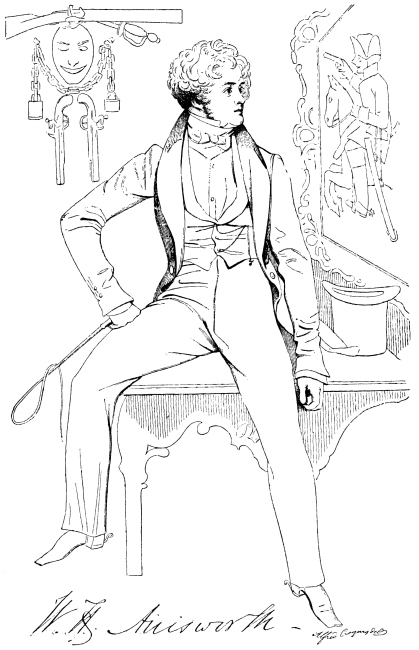
W. H. Ainsworth
-WILLIAM HARRISON AINSWORTH-
Books, indeed, there were in plenty. Lady Blessington produced her ‘Victims of Society’ and ‘Sunday at the Zoo;’ Mr. Lytton Bulwer his ‘Duchesse de la Vallière,’ ‘Ernest Maltravers,’ and ‘Athens, its Rise and Fall;’ Miss Mitford her ‘Country Stories;’ Cottle his ‘Recollections of Coleridge;’ Harrison Ainsworth, ‘Crichton;’ Disraeli, ‘Venetia;’ Talfourd, ‘The Life198 and Letters of Charles Lamb;’ Babbage, a ‘Bridgwater Treatise;’ Hook, ‘Jack Brag;’ Haynes Bayley, his ‘Weeds of Witchery’—a thing as much forgotten as the weeds in last year’s garden; James, his ‘Attila’ and ‘Louis XIV.;’ Miss Martineau, her book on ‘American Society.’ I find, not in the book, which I have not read, but in a review of it, two stories, which I copy. One is of an American traveller who had been to Rome, and said of it, ‘Rome is a very fine city, sir, but its public buildings are out of repair.’ The other is the following: ‘Few men,’ said the preacher in his sermon, ‘when they build a house, remember that there must some day be a coffin taken downstairs.’ ‘Ministers,’ said a lady who had been present, ‘have got into the strangest way of choosing subjects. True, wide staircases are a great convenience, but Christian ministers might find better subjects for their discourses than narrow staircases.’
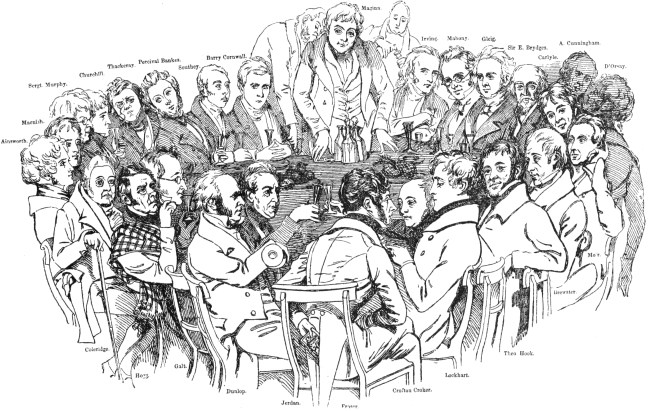
In addition to the above, Hartley Coleridge wrote the ‘Lives of Northern Worthies;’ the complete poetical works of Southey appeared—he himself died at the beginning of 1842; Dion Boucicault produced his first play, being then fifteen years of age; Carlyle brought out his ‘French Revolution;’ Lockhart his ‘Life of Scott;’ Martin Tupper the first series of the ‘Proverbial Philosophy;’ Hallam his ‘Literature of Europe;’ there were the usual travels in Arabia, Armenia, Italy, and Ireland; with, no doubt, the annual avalanche of sermons, pamphlets, and the rest. Above199 all, however, it must be remembered that to this time belong the ‘Sketches by “Boz”’ (1836) and the ‘Pickwick Papers’ (1837–38). Of the latter, the Athenæum not unwisely remarked that they were made up of ‘three pounds of Smollett, three ounces of Sterne, a handful of Hook, a dash of a grammatical Pierce Egan; the incidents at pleasure, served with an original sauce piquante.... We earnestly hope and trust that nothing we have said will tend to refine Boz.’ One could hardly expect a critic to be ready at once to acknowledge that here was a genius, original, totally unlike any of his predecessors, who knew the great art of drawing from life, and depicting nothing but what he knew. As for Thackeray, he was still in the chrysalis stage, though his likeness appears with those of the contributors to Fraser’s Magazine in the portrait group of Fraserians published in 1839. His first independently published book, I think, was the ‘Paris Sketch Book,’ which was not issued until the year 1840.
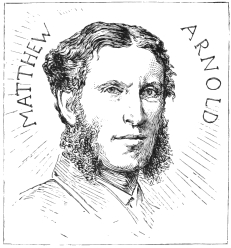
Here, it will be acknowledged, is not a record to be quite ashamed of, with Carlyle, Talfourd, Hallam, and Dickens to adorn and illustrate the year. After all, it is a great thing for any year to add one enduring book to English Literature, and it is a great deal to show so many works which are still read and remembered. Lytton’s ‘Ernest Maltravers,’ though not his best novel, is still read by some; Talfourd’s ‘Charles Lamb’ remains; Disraeli’s ‘Venetia;’ Lockhart’s ‘Life of Scott’200 is the best biography of the novelist and poet; Carlyle’s ‘French Revolution’ shows no sign of being forgotten.
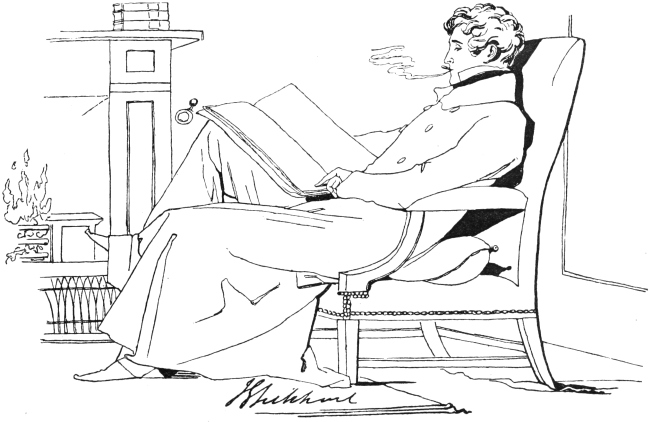
J G Lockhart
-JOHN GIBSON LOCKHART-
Between the first and the fiftieth years of Victoria’s reign there arose and flourished and died a new generation of great men. Dickens, Thackeray, Lytton, in his later and better style; George Eliot, Charles Reade, George Meredith, Nathaniel Hawthorne, stand in the very front rank of novelists; in the second line are Charles Kingsley, Mrs. Gaskell, Lever, Trollope, and a few living men and women. Tennyson, Browning, Swinburne, Matthew Arnold, are the new poets. Carlyle, Freeman, Froude, Stubbs, Green, Lecky, Buckle, have founded a new school of history; Maurice has broadened the old theology; Darwin, Huxley, Tyndall, Lockyer, and many others have advanced the boundaries of science; philology has become one of the exact sciences; a great school of political economy has arisen, flourished,201 and decayed. As to the changes that have come upon the literature of the country, the new points of view, the new creeds, these belong to another chapter.
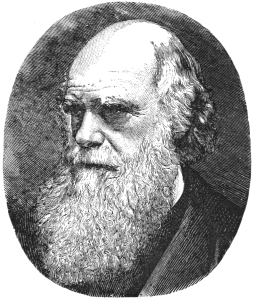
There has befallen literature of late years a grievous, even an irreparable blow. It has lost the salon. There are no longer grandes dames de par le monde, who attract to their drawing-rooms the leaders and the lesser lights of literature; there are no longer, so far as I know, any places at all, even any clubs, which are recognised centres of literature; there are no longer any houses where one will be sure to find great talkers, and to hear them talking all night long. There are no longer any great talkers—that is to say, many men202 there are who talk well, but there are no Sydney Smiths or Macaulays, and in houses where the Sydney Smith of the day would go for his talk, he would not be encouraged to talk much after midnight. In the same way, there are clubs, like the Athenæum and the Savile, where men of letters are among the members, but they do not constitute the members, and they do not give altogether its tone to the club.
Fifty years ago there were two houses which, each in its own way, were recognised centres of literature. Every man of letters went to Gore House, which was open to all; and every man of letters who could get there went to Holland House.
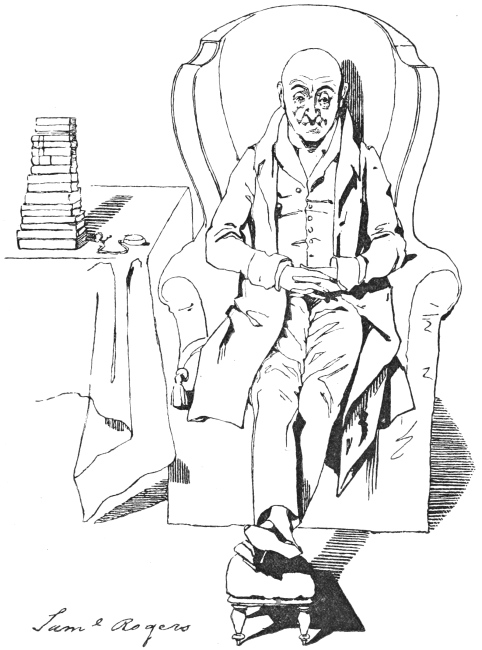
Saml Rogers
-SAMUEL ROGERS-
The former establishment was presided over by the Countess of Blessington, at this time a widow, still young and still attractive, though beginning to be burdened with the care of an establishment too expensive for her means. She was the author of a good many novels, now almost forgotten—it is odd how well one knows the name of Lady Blessington, and how little is generally known about her history, literary or personal—and she edited every year one of the ‘Keepsakes’ or ‘Forget-me-Nots.’ From certain indications, the bearing of which her biographer, Mr. Madden, did not seem to understand, I gather that her novels did not prove to the publishers the literary success which they expected, and I also infer—from the fact that she was always changing them—that a dinner at Gore House and the society of all the wits after dinner were203 not always attractions strong enough to loosen their purse-strings. This lady, whose maiden name was Power, was of an Irish family, her father being engaged, when he was not shooting rebels, in unsuccessful trade. Her life was adventurous and also scandalous. She was married at sixteen to a Captain Farmer, from whom she speedily separated, and came over to London, where she lived for some years—her biographer does not explain how she got money—a grass widow. When Lord Blessington lost his wife, and Mrs. Farmer lost her husband—the gallant Captain got drunk, and fell out of a window—they were married, and went abroad travelling in great state, as an English milor of those days knew how to travel, with a train of half-a-dozen carriages, his own cook and valet, the Countess’s women, a whole batterie de cuisine, a quantity of furniture, couriers, and footmen, and his own great carriage. With them went the Count d’Orsay, then about two-and-twenty,204 and young Charles Mathews, then about twenty, a protégé of Lord Blessington, who was a friend and patron of the drama.
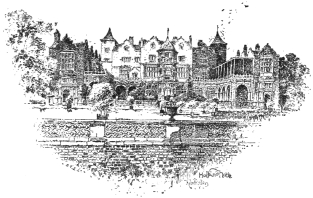
After Lord Blessington died it was arranged that Count d’Orsay should marry his daughter. But the Count separated from his wife a week or two after the wedding, and returned to the widow, whom he never afterwards left, always taking a lodging near her house, and forming part of her household. The Countess d’Orsay, one need not explain, did not visit her stepmother at Gore House.
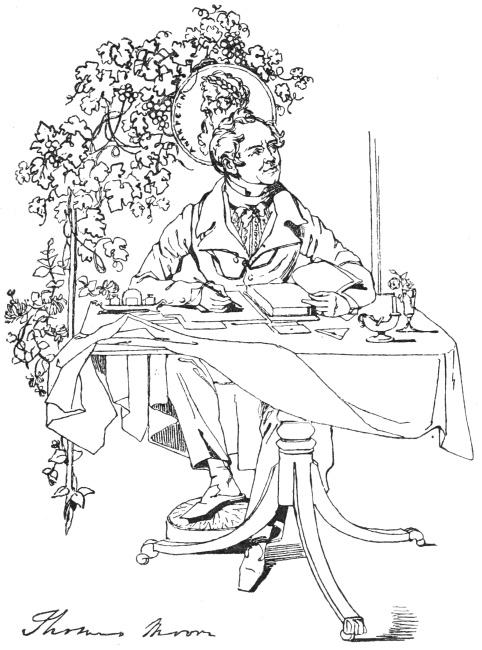
Thomas Moore
-SAMUEL ROGERS-
Here, however, you would meet Tom Moore, the two Bulwers, Campbell, Talfourd, James and Horace Smith, Landseer, Theodore Hook, Disraeli the elder and the younger, Rogers, Washington Irving, N. P. Willis, Marryat, Macready, Charles Dickens, Albert Smith, Forster, Walter Savage Landor, and, in short, nearly every one who had made a reputation, or was likely to make it. Hither came also Prince Louis Napoleon, in whose fortunate star Count d’Orsay always firmly believed. The conversation was lively, and the evenings were prolonged. As for ladies, there were few ladies who went to Gore House. Doubtless they had their reasons. The outer circle, so to speak, consisted of such men as Lord Abinger, Lord Durham, Lord Strangford, Lord Porchester, Lord Nugent, writers and poetasters who contributed their illustrious names and their beautiful productions to Lady Blessington’s ‘Keepsakes.’ Thackeray was one of the ‘intimates’ at Gore205 House, and when the crash came in 1849, and the place was sold up by the creditors, it is on record that the author of ‘Vanity Fair’ was the only person who showed emotion. ‘Mr. Thackeray also came,’ wrote the Countess’s valet to his mistress, who had taken refuge in Paris, ‘and he went away with tears in his eyes; he is perhaps the only person I have seen really affected at your departure.’ In 1837 he was twenty-six years of age, but he had still to wait for twelve years before he was to take his real place in literature, and even then and until the day of his death there were many who could not understand his greatness.
As regards Lady Blessington, her morals may have been deplorable, but there must have been something singularly attractive about her manners and conversation. It is not by a stupid or an unattractive woman that such success as hers was attained. Her novels, so far as I have been able to read them, show no remarkable ability, and her portrait shows amiability rather than cleverness; yet she must have been both clever and amiable to get so many clever men around her and to fix them, to make them come again, come often, and regard her drawing-room and her society as altogether charming, and to write such verses upon her as the following:—
206
Once owned this hallowed spot,
Whose zealous eloquence improved
The fettered Negro’s lot,
Yet here still slavery attacks
Whom Blessington invites;
The chains from which he freed the blacks
She rivets on the whites.
The following lines are in another strain, more artificial, with a false ring, and curiously unlike any style of the present day. They are by N. P. Willis, who, in his ‘Pencillings,’ describes an evening at Gore House:—
As ever made a lip of Heaven
Falter amid its music—prayer:
The first-lit star of summer even
Springs scarce so softly on the eye,
Nor grows with watching half so bright,
Nor ’mid its sisters of the sky
So seems of Heaven the dearest light.
Men murmur where that shape is seen;
My youth’s angelic dream was of that face and mien.
Gore House was a place for men; there was more than a touch of Bohemia in its atmosphere. The fair châtelaine distinctly did not belong to any noble house, though she was fond of talking of her ancestors; the constant presence of Count d’Orsay, and the absence of Lady Harriet, his wife; the coldness of ladies as regards the place; the whispers and the open talk; these things did not, perhaps, make the house less delightful, but they placed it outside society.
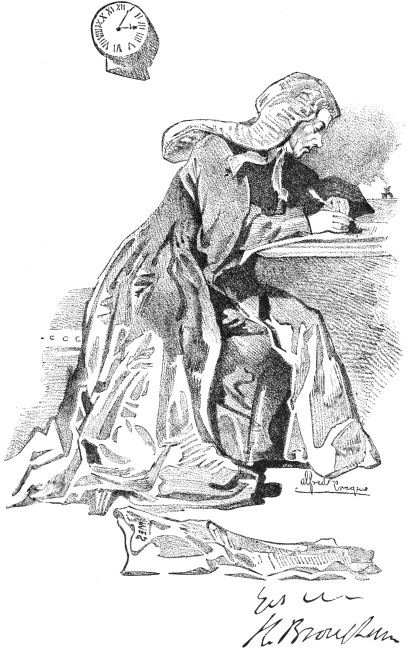
H. Brougham
-LORD BROUGHAM AND VAUX-
Holland House, on the other hand, occupied a different position. The circle was wide and the hospitable doors were open to all who could procure an introduction; but it was presided over by a lady the207 opposite to Lady Blessington in every respect. She ruled as well as reigned; those who went to Holland House were made to feel her power. The Princess Marie Liechtenstein, in her book on Holland House, has given a long list of those who were to be found there between the years 1796 and 1840. Among them were Sydney Smith, Macaulay, Byron, ‘Monk’ Lewis, Lord Jeffrey, Lords Eldon, Thurlow, Brougham, and Lyndhurst, Sir Humphry Davy, Count Rumford, Lords Aberdeen, Moira, and Macartney, Grattan, Curran, Sir Samuel Romilly, Washington Irving, Tom Moore, Calonne, Lally Tollendal, Talleyrand, the Duke of Clarence, the Duc d’Orléans, Metternich, Canova, the two Erskines, Madame de Staël, Lord John Russell, and Lord Houghton. There was no such agreeable house in Europe as Holland House. ‘There was no professional claqueur; no mutual puffing; no exchanged support. There, a man was not unanimously applauded because he was known to be clever, nor was a woman accepted as clever because she was known to receive clever people.’
The conditions of life and society are so much changed that there can never again be another Holland House. For the first thing which strikes one who considers the history of this place, as well as Gore House, is that, though the poets, wits, dramatists, and novelists go to these houses, their wives do not. In these days a man who respects himself will not go to a house where his wife is not asked. Then, again, London is so much208 greater in extent, and people are so much scattered, that it would be difficult now to get together a circle consisting of literary people who lived near enough to frequent the house. And another thing: people no longer keep such late hours. They do not sit up talking all night. That is, perhaps, because there are no wits to talk with; but I do not know: I think that towards midnight the malice of Count d’Orsay in drawing out the absurd points in the guests, the rollicking fun of Tom Moore, or his sentimental songs, the repartee of James Smith, and the polished talk of Lytton Bulwer, all collar, cuff, diamond pin, and wavy hair, would have begun to pall upon me, and when nobody was taking any notice of so obscure an individual, I should have stolen down the stairs, and so out into the open air beneath the stars. For the wits were very witty, but they must have been very fatiguing. ‘Quite enough of that, Macaulay’ Lady Holland would say, tapping her fan upon the table. ‘Now tell us about something else.’
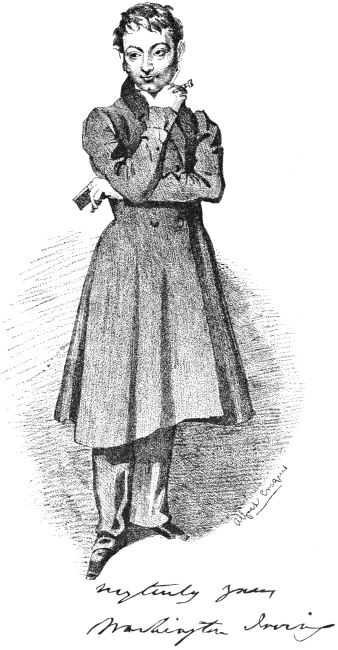
Very truly yours
Washington Irving
-WASHINGTON IRVING-
209
CHAPTER XIV.
JOURNALS AND JOURNALISTS.
There was no illustrated paper in 1837: there was no Punch. On the other hand, there were as many London papers as there are to-day, and nearly as many magazines and reviews. The Times, which is reported to have then had a circulation not exceeding 10,000 a day, was already the leading paper. It defended Queen Caroline, and advocated the Reform Bill, and was reported to be ready to incur any expense for early news. Thus, in 1834, on the occasion of a great dinner given to Lord Durham, the Times spent 200l. in having an early report, and that up from the North by special messenger. This is not much in comparison with the enterprise of telegraph and special correspondents, but it was a great step in advance of other journals. The other morning papers were the Morning Herald, the Morning Chronicle, the Morning Post, of which Coleridge was once on the staff, the Morning Advertiser, which already represented the interest of which it is still the organ, and the old Public Ledger, for which Goldsmith had once written.
210 The evening papers were the Globe, which had absorbed six other evening papers; the Courier; the Standard, once edited by Dr. Maginn; and the True Sun.
The weeklies were the Examiner, edited by the two Hunts and Albany Fonblanque; the Spectator, whose price seems to have varied from ninepence to a shilling; the Atlas; Observer; Bell’s Life; Bell’s Weekly Messenger; John Bull, which Theodore Hook edited; the New Weekly Messenger; the Sunday Times; the Age; the Satirist; the Mark Lane Express; the County Chronicle; the Weekly Dispatch, sometimes sold for 8½d., sometimes for 6d.; the Patriot; the Christian Advocate; the Watchman; the Court Journal; the Naval and Military Gazette; and the United Service Gazette.
Among the reporters who sat in the Gallery, it is remarkable that two-thirds did not write shorthand; they made notes, and trusted to their memories; Charles Dickens sat with them in the year 1836.
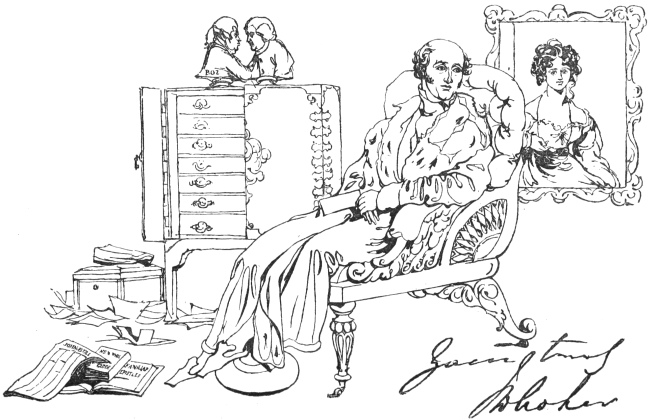
Yours truly
J Croker
-JOHN WILSON CROKER-
The two great Quarterlies still continue to exist, but their power has almost gone; nobody cares any more what is said by either, yet they are as well written as ever, and their papers are as interesting, if they are not so forcible. The Edinburgh Review is said to have had a circulation of 20,000 copies; the Quarterly is said never to have reached anything like that number. Among those who wrote for the latter fifty years ago, or thereabout, were Southey, Basil Hall, John Wilson Croker, Sir Francis Head, Dean Milman, Justice Coleridge, Henry Taylor, and Abraham Hayward. The Westminster,211 which also included the London, was supported by such contributors as the two Mills, father and son. Southwood Smith, and Roebuck. There was also the Foreign Quarterly, for which Scott, Southey, and Carlyle wrote.
The monthlies comprised the Gentleman’s (still living), the Monthly Review, the Monthly Magazine; the Eclectic; the New Monthly; Fraser; the Metropolitan; the Monthly Repository; the Lady’s; the Court; the Asiatic Journal; the East India Review; and the United Service Journal.
The weekly magazines were the Literary Gazette; the Parthenon—absorbed in the Literary in 1842; the Athenæum, which Mr. Dilke bought of Buckingham, reducing the price from 8d. to 4d.; the Mirror; Chambers’s Journal; the Penny Magazine; and the Saturday Magazine, a religious journal with a circulation of 200,000.
All these papers, journals, quarterlies, monthlies, and weeklies found occupation for a great number of journalists. Among those who wrote for the magazines were many whom we know, and some whom we have forgotten. Mr. Cornish, editor of the Monthly Magazine, seems forgotten. But he wrote ‘Songs of the Loire,’ the ‘Gentleman’s Book,’ ‘My Daughter’s Book,’ the ‘Book for the Million,’ and a ‘Volume of the Affections.’ Mr. Peter Gaskill, another forgotten worthy, wrote, besides his contributions to the monthly press, three laudable works, called ‘Old Maids,’ ‘Old Bachelors,’212 and ‘Plebeians and Patricians.’ John Galt, James and Horace Smith, Allan Cunningham, Sir Egerton Brydges, Sheridan Knowles, Robert Hall, John Foster, James Montgomery, S. C. Hall, Grattan—author of ‘Highways and Byways’—Marryat, John Mill, Peacock, Miss Martineau, Ebenezer Elliott, and Warren—author of ‘A Diary of a Late Physician’—all very respectable writers, sustained this mass of magazine literature.
It will be seen, then, that London was as well supplied with papers and reviews as it is at present—considering the difference in population, it was much better supplied. Outside London, however, the demand for a daily paper was hardly known. There were in the whole of Great Britain only fourteen daily papers; and in Ireland two. There are now 171 daily papers in Great Britain and fifteen in Ireland. In country places, the weekly newspaper, published on Saturday night and distributed on Sunday morning, provided all the news that was required, the local intelligence being by far the most important.
As to the changes which have come over the papers, the leading article, whose influence and weight seems to have culminated at the time of the Crimean War, was then of little more value than it is at present. The news—there were as yet, happily, no telegrams—was still by despatches and advice; and the latest news of markets was that brought by the last ship. We will not waste time in pointing out that Edinburgh was practically as far off as Gibraltar, or as anything else213 you please. But consider, if you can, your morning paper without its telegrams; could one exist without knowing exactly all that is going on all over the world at the very moment? We used to exist, as a matter of fact, very well indeed without that knowledge; when we had it not we were less curious, if less well informed: there was always a pleasing element of uncertainty as to what might arrive: everything had to be taken on trust; and in trade the most glorious fortunes could be made and lost by the beautiful uncertainties of the market. Now we watch the tape, day by day, and hour by hour: we anticipate our views: we can only speculate on small differences: the biggest events are felt, long beforehand, to be coming. It is not an unmixed gain for the affairs of the whole world to be carried on under the fierce light of electricity, so that everybody may behold whatever happens day after day, as if one were seated on Olympus among the Immortal Gods.
214
CHAPTER XV.
THE SPORTSMAN.
There were many various forms of sport open to the Englishman fifty years ago which are now wholly, or partly, closed. For instance, there was the P. R., then flourishing in great vigour—they are at this moment trying to revive it. A prize-fight was accompanied by every kind of blackguardism and villainy; not the least was the fact that the fights, towards the end of the record, were almost always conducted on the cross, so that honest betting men never knew where to lay their money. At the same time, the decay of boxing during the last twenty-five years has been certainly followed by a great decay of the national pluck and pugnacity, and therefore, naturally, by a decay of national enterprise. We may fairly congratulate ourselves, therefore, that the noble art of self-defence is reviving, and promises to become as great and favourite a sport as before. Let all our boys be taught to fight. Fifty years ago there was not a day in a public school when there was not a fight between two of the boys; there was not a day when there was not a street fight; did not215 the mail-coach drivers who accompanied Mr. Samuel Weller on a memorable occasion leave behind them one of their number to fight a street porter in Fleet Street? There was never a day when some young fellow did not take off his coat and handle his fives for a quarter of an hour with a drayman, a driver, a working man. It was a disgrace not to be able to fight. Let all our boys be taught again and encouraged to fight. Only the other day I read that there are no fights at Eton any more because the boys ‘funk each other.’ Eton boys funk each other! But we need not believe it. Let there be no nonsense listened to about brutality. The world belongs to the men who can fight.
There were, besides the street fights, which kept things lively and gave animation to the dullest parts of the town, many other things which we see no longer. The bear who danced: the bull who was baited: the pigeons which were shot in Battersea Fields: the badger which was drawn: the dogs which were fought: the rats which were killed: the cocks which were fought: the cats which were thrown into the ponds: the ducks which were hunted—these amusements exist no longer; fifty years ago they afforded sport for many.
Hunting, coursing, horse-racing, shooting, went on bravely. As regards game preserves, the laws were more rigidly enforced, and there was a much more bitter feeling towards them on the part of farmers then than now. On the other hand, there were no such wholesale battues; sport involved uncertainty; gentlemen did not216 sell their game; rabbits, instead of being sent off to the nearest poulterer, were given to the labourers as they should be.
The sporting instincts of the Londoner gave the comic person an endless theme for fun. He was always hiring a horse and coming to grief; he was perpetually tumbling off, losing his stirrups, letting his whip fall, having his hat blown off and carried away, and generally disgracing himself in the eyes of those with whom he wished to appear to the best advantage. There was the Epping Hunt on Easter Monday, where the sporting Londoners turned out in thousands; there were the ponies on hire at any open place all round London—at Clapham Common, Blackheath, Hampstead, Epping. To ride was the young Londoner’s greatest ambition: even to this day there is not one young man in ten who will own without a blush that he cannot ride. To ride in the Park was impossible for him, because he had to be at his desk at ten; a man who rides in the Park is independent of the City; but there were occasions on which everyone would long to be able to sit in the saddle.
Rowing, athletics, and, above all, the cycle, have done much to counterbalance the attractions of the saddle.
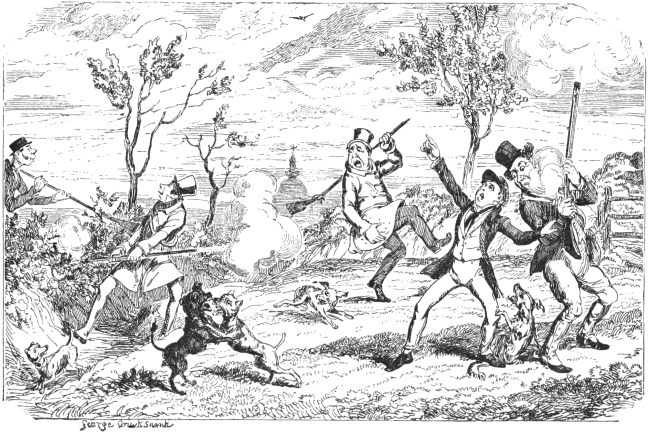
It seems certain, unless the comic papers all lie, that fifty years ago every young man also wanted to go shooting. Remember how Mr. Winkle—an arrant Cockney, though represented as coming from Bristol—not only pretended to love the sport, but always went217 about attired as one ready to take the field. The Londoner went out into the fields, which then lay within his reach all round the City, popping at everything. Let us illustrate the subject with the following description of a First of September taken from the ‘Comic Almanack’ of 1837. Perhaps Thackeray wrote it:—
‘Up at six.—Told Mrs. D. I’d got wery pressing business at Woolwich, and off to Old Fish Street, where a werry sporting breakfast, consisting of jugged hare, partridge pie, tally-ho sauce, gunpowder tea, and-cætera, vos laid out in Figgins’s warehouse; as he didn’t choose Mrs. F. and his young hinfant family to know he vos a-goin to hexpose himself vith fire-harms.—After a good blowout, sallied forth vith our dogs and guns, namely Mrs. Wiggins’s French poodle, Miss Selina Higgins’s real Blenheim spaniel, young Hicks’s ditto, Mrs. Figgins’s pet bull-dog, and my little thoroughbred tarrier; all vich had been smuggled to Figgins’s warehouse the night before, to perwent domestic disagreeables.—Got into a Paddington bus at the Bank.—Row, with Tiger, who hobjected to take the dogs, unless paid hextra.—Hicks said we’d a rights to take ’em, and quoted the hact.—Tiger said the hact only allowed parcels carried on the lap.—Accordingly tied up the dogs in our pocket-handkerchiefs, and carried them and the guns on our knees.—Got down at Paddington; and, after glasses round, valked on till ve got into the fields, to a place vich Higgins had baited vith corn and penny rolls every day for a month past. Found a covey of birds feeding. Dogs wery eager, and barked beautiful. Birds got up and turned out to be pigeons. Debate as to vether pigeons vos game or not. Hicks said they vos made game on by the new hact. Fired accordingly, and half killed two or three, vich half fell to the ground; but suddenly got up again and flew off. Reloaded, and pigeons came round again. Let fly a second time, and tumbled two or three more over, but didn’t bag any. Tired at last, and turned in to the Dog and Partridge, to get a snack. Landlord laughed, and asked how ve vos hoff for tumblers. Didn’t understand him, but got some waluable hinformation about loading our guns; vich he strongly recommended mixing the powder and shot well up together before putting into the barrel; and showed Figgins how to218 charge his percussion; vich being Figgins’s first attempt under the new system, he had made the mistake of putting a charge of copper caps into the barrel instead of sticking von of ’em atop of the touch-hole.—Left the Dog and Partridge, and took a north-easterly direction, so as to have the adwantage of the vind on our backs. Dogs getting wery riotous, and refusing to answer to Figgins’s vhistle, vich had unfortunately got a pea in it.—Getting over an edge into a field, Hicks’s gun haccidently hexploded, and shot Wiggins behind; and my gun going off hunexpectedly at the same moment, singed avay von of my viskers and blinded von of my heyes.—Carried Wiggins back to the inn: dressed his wound, and rubbed my heye with cherry brandy and my visker with bear’s grease.—Sent poor W. home by a short stage, and resumed our sport.—Heard some pheasants crowing by the side of a plantation. Resolved to stop their cockadoodledooing, so set off at a jog-trot. Passing thro’ a field of bone manure, the dogs unfortunately set to work upon the bones, and we couldn’t get ’em to go a step further at no price. Got vithin gun-shot of two of the birds, vich Higgins said they vos two game cocks: but Hicks, who had often been to Vestminster Pit, said no sitch thing; as game cocks had got short square tails, and smooth necks, and long military spurs; and these had got long curly tails, and necks all over hair, and scarce any spurs at all. Shot at ’em as pheasants, and believe we killed ’em both; but, hearing some orrid screams come out of the plantation immediately hafter, ve all took to our ’eels and ran avay vithout stopping to pick either of ’em up.—After running about two miles, Hicks called out to stop, as he had hobserved a covey of wild ducks feeding on a pond by the road side. Got behind a haystack and shot at the ducks, vich svam avay hunder the trees. Figgins wolunteered to scramble down the bank, and hook out the dead uns vith the but-hend of his gun. Unfortunately bank failed, and poor F. tumbled up to his neck in the pit. Made a rope of our pocket-handkerchiefs, got it round his neck, and dragged him to the Dog and Doublet, vere ve had him put to bed, and dried. Werry sleepy with the hair and hexercise, so after dinner took a nap a-piece.—Woke by the landlord coming in to know if ve vos the gentlemen as had shot the hunfortunate nursemaid and child in Mr. Smithville’s plantation. Swore ve knew nothing about it, and vile the landlord was gone to deliver our message, got out of the back vindow, and ran avay across the fields. At the end of a mile, came suddenly upon a219 strange sort of bird, vich Hicks declared to be the cock-of-the-woods. Sneaked behind him and killed him. Turned out to be a peacock. Took to our heels again, as ve saw the lord of the manor and two of his servants vith bludgeons coming down the gravel valk towards us. Found it getting late, so agreed to shoot our vay home. Didn’t know vere ve vos, but kept going on.—At last got to a sort of plantation, vere ve saw a great many birds perching about. Gave ’em a broadside, and brought down several. Loaded again, and killed another brace. Thought ve should make a good day’s vork of it at last, and vas preparing to charge again, ven two of the new police came and took us up in the name of the Zolorogical Society, in whose gardens it seems ve had been shooting. Handed off to the Public Hoffice, and werry heavily fined, and werry sewerely reprimanded by the sitting magistrate.—Coming away, met by the landlord of the Dog and Doublet, who charged us with running off without paying our shot; and Mr. Smithville, who accused us of manslaughtering his nurse-maid and child; and, their wounds not having been declared immortal, ve vos sent to spend the night in prison—and thus ended my last First of September.’
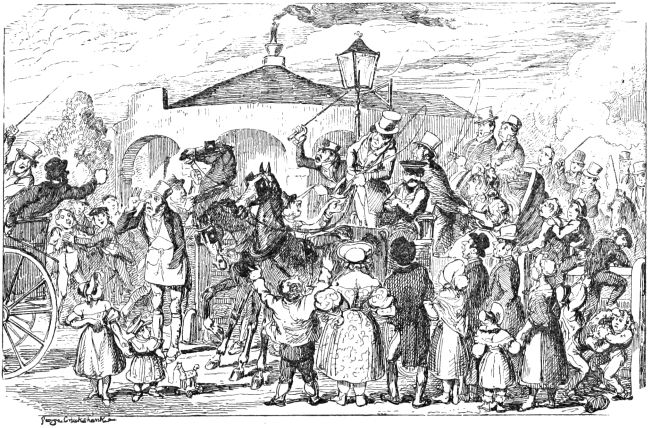
Those who wish to know what a Derby Day was fifty years ago may read the following contemporary narrative:—
Here’s a right and true list of all the running horses! Dorling’s correct card for the Derby day!——Hollo, old un! hand us up one here, will you: and let it be a good un: there, now what’s to pay?
Only sixpence. Sixpence! I never gave more than a penny at Hookem Snivey in all my days.——May be not, your honour: but Hookem Snivey aint Hepsom: and sixpence is what every gemman, as is a gemman, pays.
I can buy ’em for less than that on the course, and I’ll wait till I get there. Beg your honour’s pardon——They sells ’em a shillin’ on the course. Give you threepence. They cost me fippence ha’p’ny farden.
Well, here then, take your list back again. Come, come; your honour shall have it at your own price:——I wouldn’t sell it nob’dy else for no sitch money: but I likes the sound of your wice.
Here, then, give me the change, will you?—Oh, certainly: but your honour’s honcommon ard:——Let’s see: you want two-and-threepence:220 wait a moment, there’s another gentleman calling out for a card.
Hollo, coachman, stop, stop! Coachman, do you hear? stop your horses this moment, and let me get down:—The fellow’s run away behind an omnibus without giving me change out of my half-crown.
That’s alvays the vay they does on these here hoccasions: they calls it catching a flat:—Sorry I can’t stop. Where’s the new police? Pretty police truly, to suffer such work as that!
Well, if ever I come to Epsom again! but let’s look at the list: it’s cost me precious dear!—Ascot, Mundig, Pelops! why, good heavens, coachman! they’ve sold me a list for last year!
‘Oh, ma! look there! what a beautiful carriage! scarlet and gold liveries, and horses with long tails.—And stodge-full of gentlemen with mustaches, and cigars and macintoshes, and green veils:
Whose is it, ma? Don’t know, my dear; but no doubt belongs to some duke, or marquis, or other great nob.—Beg your pardon, ma’am: but that carriage as you’re looking at is a party of the swell mob.
And, oh my! ma: look at that other, full of beautiful ladies, dressed like queens and princesses.—Silks and satins and velvets, and gauze sleeves and ermine tippets: I never saw such elegant dresses:
And how merry they look, laughing and smiling! they seem determined to enjoy the sport:—Who are they, ma? Don’t know, dear; but no doubt they’re Court ladies. Yes, ma’am, Cranbourne Court.
How do, Smith? nice sort of tit you’ve got there. Very nice indeed: very nice sort of mare.—Beautiful legs she’s got, and nicely-turned ancles, and ’pon my word, a most elegant head of hair.
How old is she? and how high does she stand? I should like to buy her if she’s for sale.—Oh, she’s quite young: not above five-and-twenty or thirty; and her height exactly a yard and a half and a nail:
Price eighty guineas. She’d be just the thing for you; capital hunter as ever appeared at a fixture.—Only part with her on account of her colour; not that I mind: only Mrs. S. don’t like an Oxford mixture.
Hehlo! you faylow! you person smoking the pipe, I wish you’d221 take your quadruped out of the way.—Quadruped, eh? you be blowed! it’s no quadruped, but as good a donkey as ever was fed upon hay.
Oh, my! ma: there’s the course. What lots of people, and horses, and booths, and grand stands!—And what oceans of gipsies and jugglers, and barrel organs, and military bands!
And was ever such sights of Savoyards and French women singing and E-O-tables;—And horses rode up and down by little boys, or tied together in bundles, and put up in calimanco stables;
And look at that one, they call him Boney-parte. Did you ever in all your lifetime see a leaner?—And ‘Royal Dinner Saloons’ (for royalty the knives might have been a little brighter, and the linen a little cleaner);
And women with last-dying speeches in one hand, and in the other all the best new comic songs;—And, dear me! how funnily that gentleman sits his horse; for all the world just like a pair of tongs.
And—clear the course! clear the course! Oh, dear! now the great Derby race is going to be run.—Twelve to one! Ten to one! Six to one! Nine to two! Sixteen to three! Done, done, done, done!
Here they come! here they come! blue, green, buff, yellow, black, brown, white, harlequin, and red!—Sir, I wish you’d stand off our carriage steps: it’s quite impossible to see through your head.
There, now they’re gone: how many times round? Times round, eh? why, bless your innocent face!—It’s all over. All over! you don’t say so! I wish I’d never come: such a take in! call that a Derby race!
After being stifled with dust almost, and spoiling all our best bonnets and shawls and cloaks!—Call that a Derby race, indeed! I’m sure it’s no Derby, but nothing but a right-down, regular Oaks.
But come, let’s have a bit of lunch; I’m as hungry as if I hadn’t had a bit all day.—Smith, what are you staring at? why don’t you make haste, and hand us the hamper this way?
We shall never have anything to eat all day if you don’t stir yourself, and not go on at that horrid slow rate.—Oh, Lord! the bottom’s out, and every bit of meat and drink, and worse than all, the knives and forks and plate,—
Stole and gone clean away! Good heavenlies! and I told you222 to keep your eye on the basket, you stupid lout!—Well, so I did, on the top of it, but who’d have thought of their taking the bottom out?
Well, never mind: they’ll be prettily disappointed: for you know, betwixt you and me and the wall,—Our ivory knives and forks were nothing but bone; and our plate nothing but German silver, after all.
What race is to be run next? No more, ma’am: the others were all run afore you come.—Well, then, have the horses put to, Smith: I’ll never come a Derbying again; and let us be off home.
Oh, lawk! what a stodge of carriages! I’m sure we shall never get off the course alive!—Oh, dear! do knock that young drunken gentleman off the box: I’m sure he’s not in a fit state to drive.
There, I told you how it would be. Oh, law! you’ve broke my arm, and compound-fractured my leg!—Oh! for ’eaven’s sake, lift them two ’orrid osses off my darter! Sir, take your hands out of my pocket-hole, I beg!
I say, the next time you crawl out of a coach window, I wish you wouldn’t put your foot on a lady’s chest.—Vell, if ever I seed such a purl as that (and I’ve seed many a good un in my time), I’ll be blest.
Oh, dear! going home’s worse than coming! It’s ten to one if ever we get back to Tooley Street alive.—Such jostling, and pushing, and prancing of horses! and always the tipsiest gentleman of every party will drive.
I wish I was one of those ladies at the windows; or even one of the servant maids giggling behind the garden walls.—And oh! there’s Kennington turnpike! what shouting and hooting, and blowing those horrid cat-calls!
Ticket, sir? got a ticket? No, I’ve lost it. A shilling, then. A shilling! I’ve paid you once to-day.—Oh, yes, I suppose so: the old tale; but it won’t do. That’s what all you sporting gentlemen say.
Hinsolent feller! I’ll have you up before your betters. Come, sir, you mustn’t stop up the way. Well, I’ll pay you again; but, oh Lord! somebody’s stole my purse! good gracious, what shall I do!—I suppose I must leave my watch, and call for it to-morrow. Oh, ruination! blow’d if that isn’t gone too!
Get on there, will you?—Well, stop a moment. Will anybody223 lend me a shilling? No? Well, here then, take my hat:—But if I don’t show you up in Bell’s Life in London, next Sunday morning, my name’s not Timothy Flat.
Well, this is my last journey to Epsom, my last appearance on any course as a backer or hedger:—For I see plain enough a betting-book aint a day-book, and a Derby’s a very different thing from a Ledger.
224
CHAPTER XVI.
IN FACTORY AND MINE.
I do not know any story, not even that of the slave-trade, which can compare, for brutality and callousness of heart, with the story of the women and children employed in the factories and the mines of this realm. There is nothing in the whole history of mankind which shows more clearly the enormities which become possible when men, spurred by desire for gain, are left uncontrolled by laws or the weight of public opinion, and placed in the position of absolute mastery over their fellow-men. The record of the slavery time is black in the West Indies and the United States, God knows; but the record of the English mine and factory is blacker still. It is so black that it seems incredible to us. We ask ourselves in amazement if, fifty years ago, these things could be. Alas! my friends, there are cruelties as great still going on around us in every great city, and wherever women are forced to work for bread. For the women and the children are inarticulate, and in the dark places, where no light of publicity penetrates, the hand of the master is armed with a scourge225 of scorpions. Let us therefore humble ourselves, and read the story of the children in the mines with shame as well as with indignation. The cry of the needlewomen is louder in our ears than the cry of the children in the mines ever was to our fathers; yet we regard it not.
LETTING CHILDREN DOWN A COAL MINE
(From a Plate in the Westminster Review)
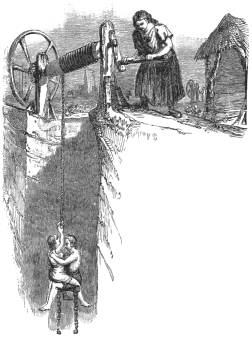
LETTING CHILDREN DOWN A COAL MINE
(From a Plate in the Westminster Review)
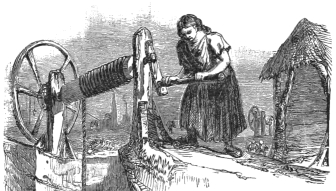
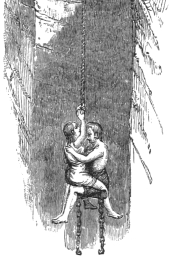
Fellow-sinners and partakers in the crimes of slavery, torture, and robbery of light, life, youth, and joy, hear the tale of the Factory and the Mine.
Early in the century—in the year 1801—the overcrowding of the factories and mills, the neglect of the simplest sanitary precautions, the long hours, the poor food, and insufficient rest, caused the outbreak of a dreadful epidemic fever, which alarmed even the mill-owners, because if they lost their hands they lost their machinery. The hands are the producers, and the aim of the masters was to regard the producers as so many machines. Now if your machine is laid low with fever it is as good as an engine out of repair.
For the first time in history, not only was the public226 conscience awakened, but the House of Commons was called upon to act in the interests of health, public morals, humanity, and justice. Strange, that the world had been Christian for so long, yet no law had been passed to protect women and children. In the Year of Grace 1802 a beginning was made.
By the Act then passed the daily hours of labour for children were to be not more than twelve—yet think of making young children work for twelve hours a day!—exclusive of an hour and a half for meals and rest, so that the working day really covered thirteen hours and a half, say from six in the morning until half-past seven in the evening. This seems a good day’s work to exact of children, but it was a little heaven compared with the state of things which preceded the Act. Next, no children were to be employed under the age of nine. Certain factories, proved to be unwholesome for children, were closed to them altogether. Twenty years later Sir John Cam Hobhouse—may his soul find peace!—invented the Saturday half-holiday for factories. There was found, however, a loophole for cruelty and overwork; the limitation of hours was evaded by making the hands work in relays, by which means a child might be kept at work half the night. It was, therefore, in 1833 enacted that there should be no work done at all between 8.30 P.M. and 5.30 A.M.: that children under thirteen should not work more than forty-eight hours a week, and those under eighteen should not work more than sixty-eight hours a week.
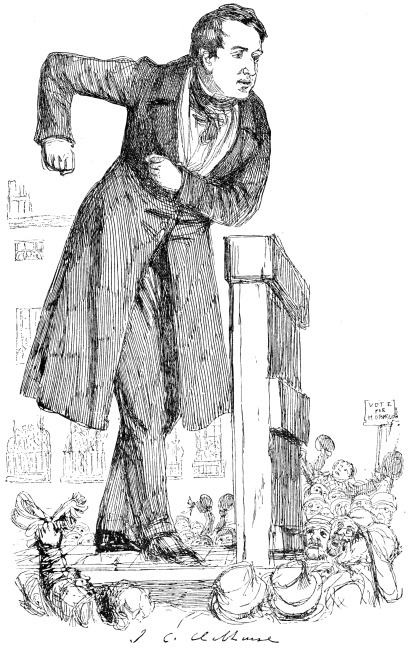
J. C. Hobhouse
-SIR JOHN C. HOBHOUSE-
227 Observe that nothing—not the light of publicity, not public opinion, not common humanity, not pity towards the tender children—nothing but Law had any power to stop this daily massacre of the innocents. Yet, no doubt, the manufacturers were subscribing for all kinds of good objects, and reviling the Yankees continually for the institution of Slavery.
What happened next? Greed of gain, seeing the factory closed, looked round, and saw wide open—not the gates of Hell—but the mouth of the Pit, and they flung the children down into the darkness, and made them work among the narrow passages and galleries of the coal mines.
They took the child—boy or girl—at six years of age; they carried the little thing away from the light of heaven, and lowered it deep down into the black and gloomy pit; they placed it behind a door, and ordered it to pull this open to let the corves, or trucks, come and go, and to keep it shut when they were not passing. The child was set at the door in the dark—at first they gave it a candle, which would burn for an hour or two and then go out. Think of taking a child of six—your child, Madam!—and putting it all alone down the dark mine! They kept the little creature there for twelve interminable hours. If the child cried, or went to sleep, or neglected to pull the door open, they beat that child. The work began at four in the morning, and it was not brought out of the pit until four, or perhaps later, in the evening, so that in the winter the children never saw228 daylight at all. The evidence given before the Royal Commission showed that the children, when they were brought up to the pit’s mouth, were heavy and stupefied, and cared for little when they had taken their supper but to go to bed. And yet the men who owned these collieries had children of their own! And they would have gone on to this very day starving the children of light and loading them with work, stunting their growth, and suffering them to grow up in ignorance all their days, but for Lord Shaftesbury. This is what is written of the children and their work by one who visited the mines:—
To ascertain the nature of the employment of these children, I went down a pit.... Descending a shaft, 600 feet deep, I went some distance along a subterranean road which, I was told, was three miles in length. To the right and left of one of these roads or ways are low galleries, called workings, in which the hewers are employed, in a state of almost perfect nudity, on account of the great heat, digging out the coal. To these galleries there are traps, or doors, which are kept shut, to guard against the ingress or egress of inflammable air, and to prevent counter-currents disturbing the ventilation. The use of a child, six years of age, is to open and shut one of these doors when the loaded corves, or coal trucks, pass and repass. For this object the child is trained to sit by itself in a dark gallery for the number of hours I have described. The older boys drive horses and load the corves, but the little children are always trap-keepers. When first taken down they have a candle given them, but, gradually getting accustomed to the gloom of the place, they have to do without, and sit therefore literally in the dark the whole time of their imprisonment.
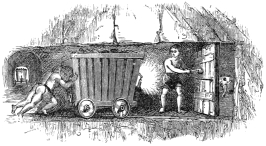
CHILDREN WORKING IN A COAL MINE
(From a Plate in the Westminster Review)
When a child grew strong enough, he or she—boy or girl—was promoted to the post of drawer, or thrutcher. The drawer, boy or girl alike, clad in a229 short pair of trousers and nothing else, had a belt tied round the waist and a chain attached by one end to the belt and the other to the corve, or truck, which he dragged along the galleries to the place where it was loaded for the mouth, the chain passing between his legs; on account of the low height of the galleries he had generally to go on all-fours. Those who were the thrutchers pushed the truck along with their heads and hands. They wore a thick cap, but the work made them bald on the top of the head. When the boys grew up they became hewers, but the women, if they stayed in the pit, remained drawers or thrutchers, continuing to the end of the day to push or drag the truck dressed in nothing but the pair of short trousers. This was a beautiful kind of life for Christian women and children to be leading. So many children were wanted, that in one colliery employing 400 hands there were 100 under twenty and 56 under thirteen. In another, where there was an inundation, there were 44230 children, of whom 26 were drowned; of these 11 were girls and 15 boys; 9 were under ten years of age. Again, in the year 1838, there were 38 children under thirteen killed by colliery accidents and 62 young people under eighteen.
When men talk about the interference of the State and the regulation of hours, let us always remember this history of the children in the Pit. Yet there were men in plenty who denounced the action of the Government: some of them were leaders in the philanthropic world; some of them were religious men; some of them humane men; but they could not bear to think that any limit should be imposed upon the power of the employer. In point of fact, when one considers the use which the employer has always made of his power, how every consideration has been always set aside which might interfere with the acquisition of wealth, it seems as if the chief business of the Legislature should be the protection of the employed.
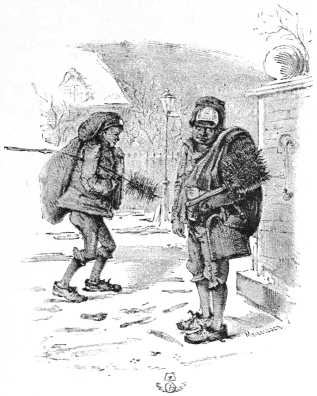
LONDON STREET CHARACTERS, 1837
(From a Drawing by John Leech)
Again, take the story of the chimney-sweep. Fifty years ago the master went his morning rounds accompanied by his climbing boys. It is difficult now to understand how much time and trouble it took to convince people that the climbing boy was made to endure an extraordinary amount of suffering quite needlessly, because a brush would do the work quite as well. Consider: the poor little wretch’s hands, elbows, and knees were constantly being torn by the bricks; sometimes he stuck going up, sometimes231 coming down; sometimes the chimney-pot at the top fell off, the child with it, so that he was killed. He was beaten and kicked unmercifully; his master would sometimes light a fire underneath so as to force him to come down quickly. The boy’s life was intolerable to him. He was badly fed, badly clothed, and never washed, though his occupation demanded incessant cleanliness—the neglect of which was certain to bring on a most dreadful disease. And all this because his232 master would not use a broom. It was not until 1841 that the children were protected by Acts of Parliament.
The men have shown themselves able to protect themselves. The improvement in their position is due wholly to their own combination. That it will still more improve no one can for a moment doubt. If we were asked to forecast the future, one thing would be safe to prophesy—namely, that it will become, day by day, increasingly difficult to get rich. Meanwhile, let us remember that we have with us still the women and the children, who cannot combine. We have protected the latter; how—oh! my brothers—how shall we protect the former?
233
CHAPTER XVII.
WITH THE MEN OF SCIENCE.
On the science of fifty years ago, much might be written but for a single reason—namely, that I know very little indeed about the condition of science in that remote period, and very little about science of to-day. There were no telegraph wires, but there were semaphores talking to each other all day long; there was no practical application of electricity at all; there was no telephone—I wish there were none now; there were no anæsthetics; there were no—but why go on? Schools had no Science Masters; universities no Science Tripos; Professors of Science were a feeble folk. I can do no better for this chapter than to reproduce a report of a Scientific Meeting first published in Tilt’s Annual, to which Hood, Thackeray, and other eminent professors of science contributed, for the year 1836:—
Extracts from the Proceedings of the Association of British Illuminati, at their Annual Meeting, held in Dublin, August, 1835.
Dr. Hoaxum read an interesting paper on the conversion of moonbeams into substance, and rendering shadows permanent, both of which he had recently exemplified in the establishment of some public companies, whose prospectuses he laid upon the table.
234 Mr. Babble produced his calculating machine, and its wonderful powers were tested in many ways by the audience. It supplied to Captain Sir John North an accurate computation of the distance between a quarto volume and a cheesemonger’s shop; and solved a curious question as to the decimal proportions of cunning and credulity, which, worked by the rule of allegation, would produce a product of 10,000l.
Professor Yon Hammer described his newly discovered process for breaking stones by an algebraic fraction.
Mr. Crowsfoot read a paper on the natural history of the Rook. He defended their caws with great effect, and proved that there is not a grain of truth in the charges against them, which only arise from Grub Street malice.
The Rev. Mr. Groper exhibited the skin of a toad, which he discovered alive in a mass of sandstone. The animal was found engaged on its autobiography, and died of fright on having its house so suddenly broken into, being probably of a nervous habit from passing so much time alone. Some extracts from its memoir were read, and found exceedingly interesting. Its thoughts on the ‘silent system’ of prison discipline, though written in the dark, strictly agreed with those of our most enlightened political economists.
Dr. Deady read a scientific paper on the manufacture of Hydro-gin, which greatly interested those of the association who were members of Temperance Societies.
Mr. Croak laid on the table an essay from the Cabinet Makers’ Society, on the construction of frog-stools.
Professor Parley exhibited his speaking machine, which distinctly articulated the words ‘Repale! Repale!’ to the great delight of many of the audience. The learned Professor stated that he was engaged on another, for the use of his Majesty’s Ministers, which would already say, ‘My Lords and Gentlemen;’ and he doubted not, by the next meeting of Parliament, would be able to pronounce the whole of the opening speech.
Mr. Multiply produced, and explained the principle of, his exaggerating machine. He displayed its amazing powers on the mathematical point, which, with little trouble, was made to appear as large as a coach-wheel. He demonstrated its utility in all the relations of society, as applied to the failings of the absent—the growth of a tale of scandal—the exploits of travellers, &c. &c.
The Author of the ‘Pleasures of Hope’ presented, through a235 member, a very amusing Essay on the gratification arising from the throttling of crying children; but as the ladies would not leave the room, it could not be read.
Captain North exhibited some shavings of the real Pole, and a small bottle which, he asserted, contained scintillations of the Aurora Borealis, from which, he stated, he had succeeded in extracting pure gold. He announced that his nephew was preparing for a course of similar experiments, of which he expected to know the result in October. The gallant Captain then favoured the company with a dissertation on phrenology, of which, he said, he had been a believer for thirty years. He stated that he had made many valuable verifications of that science on the skulls of the Esquimaux; and that, in his recent tour in quest of subscribers to his book, his great success had been mainly attributable to his phrenological skill; for that, whenever he had an opportunity of feeling for soft places in the heads of the public, he knew in a moment whether he should get a customer or not. He said that whether in the examination of ships’ heads or sheep’s heads—in the choice of horses or housemaids, he had found the science of pre-eminent utility. He related the following remarkable phrenological cases:—A man and woman were executed in Scotland for murder on presumptive evidence; but another criminal confessed to the deed, and a reprieve arrived the day after the execution. The whole country was horrified; but Captain North having examined their heads, he considered, from the extraordinary size of their destructive organs, that the sentence was prospectively just, for they must have become murderers, had they escaped hanging then. Their infant child, of six months old, was brought to him, and, perceiving on its head the same fatal tendencies, he determined to avert the evil; for which purpose, by means of a pair of moulds, he so compressed the skull in its vicious propensities, and enlarged it in its virtuous ones, that the child grew up a model of perfection. The second instance was of a married couple, whose lives were a continued scene of discord till they parted. On examining their heads scientifically, he discovered the elementary causes of their unhappiness. Their skulls were unfortunately too thick to be treated as in the foregoing case; but, causing both their heads to be shaved, he by dint of planing down in some places, and laying on padding in others, contrived to produce all the requisite phrenological developments, and they were then living, a perfect pattern of conjugal felicity, ‘a thing which could236 not have happened without phrenology.’ (This dissertation was received with loud applauses from the entire assembly, whose phrenological organs becoming greatly excited, and developed in an amazing degree by the enthusiasm of the subject, they all fell to examining each other’s bumps with such eagerness that the meeting dissolved in confusion.)
237
CHAPTER XVIII.
LAW AND JUSTICE.
Five thousand three hundred and forty-four enactments have been added to the Statute Book since the Queen came to the throne, and the figures throw a flood of light upon the ‘progress’ of the Victorian era. In order to realise where we were in 1837 we have only to obliterate this enormous mass of legislation. In the realm of law there seems then to be little left. All our procedure—equitable, legal, and criminal—much of the substance of equity, law, and justice, as we understand the words, is gone. ‘Law’ had a different meaning fifty years ago; ‘equity’ hardly had any meaning at all; ‘justice’ had an ugly sound.
The ‘local habitation’ of the Courts, it is true, was then much the same as it remained for the next forty-five years. The network of gloomy little rooms, connected with narrow winding passages, which Sir John Soane built in 1820–1825, on the west side of Westminster Hall, on the site of the old Exchequer Chamber, with an exterior in imitation of Palladio’s basilica at Vicenza, but outrageously out of keeping with the238 glorious vestibule of William Rufus, was then the home of law. The Court of Chancery met in a gloomy little apartment near the southern end of the hall. Here the Lord Chancellor sat in term time—there were then four terms of three weeks each—with the mace and crimson silk bag, embroidered with gold, in which was deposited the silver pair of dies of the Great Seal, and a large nosegay of flowers before him. It was, in those days, only in the vacations that the Chancellor sat at Lincoln’s Inn. The Master of the Rolls and the Vice-Chancellor of England also sat at Westminster during the sittings, while in the intervals the former presided over the Rolls Court in Rolls Yard and the latter over the Court which had been built for him on the west side of Lincoln’s Inn Hall. The three Common Law Courts, moreover, during term time, sat twelve days at Westminster and twelve days at the Guildhall, while the Assizes were chiefly held during the vacations.
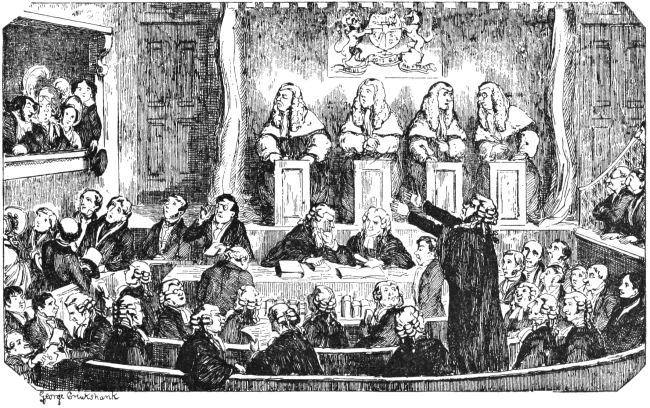
The High Court of Admiralty held its sittings at Doctors’ Commons, in both the Instance Court and the Prize Court, practically throughout the legal year, and so did the Ecclesiastical Courts. The Bankruptcy Court was in Basinghall Street; the Insolvent Debtors’ Court in Lincoln’s Inn Fields, with an entrance from Portugal Street. There were then no County Courts. The ancient Hundred and County Courts, with their primitive procedure, had long been disused. Certain ‘Courts of Conscience’ or ‘Courts of Request’ had, it is true, been established for particular localities at239 the express request of the inhabitants, and these were still being constituted in some of the large towns. Then in London there were local Courts with a peculiar jurisdiction, such as the City Courts, which would fill a chapter by themselves, and of which it is enough to name the Lord Mayor’s Court, the Sheriff’s Courts of Poultry Compter and Giltspur Street Compter, both afterwards merged into the City of London Court. In Great Scotland Yard there was the Palace Court, with the Knight Marshal for judge, which anciently had240 exclusive jurisdiction in matters connected with the Royal Household, but now was a minor court of record for actions for debt within Westminster and twelve miles round. The Court had its own prison in High Street, Southwark—the Marshalsea of ‘Little Dorrit,’ not the old historic Marshalsea, which was demolished at the beginning of the century—that stood farther north, occupying the site of No. 119 High Street—but a new Marshalsea, built in 1811 on the site of the old White Lyon, once a hostelry, but since the end of the sixteenth century itself a prison. The Palace Court came to a sudden end in 1849, owing to ‘Jacob Omnium’ being sued in it. Thackeray tells the story in ‘Jacob Homnium’s Hoss:’—
A Counsel for to fix.
And choose a barrister out of the four,
And an attorney of the six.
And there he sor these men of lor,
And watched them at their tricks.
For Jacob to go through;
The debt was two seventeen
(Which he no mor owed than you),
And then there was the plaintives costs,
Eleven pound six and two.
Which the lawyers they did fix
At the wery moderit figgar
Of ten pound one and six.
Now Evins bless the Pallis Court,
And all its bold ver-dicks!
241 The sittings of the Central Criminal Court, which was founded in 1834, were held, as they are still held, in the Sessions House in the Old Bailey. Rebuilt in 1809 on the site of the old Sessions House which was destroyed in the No-Popery riots of 1780, and of the old Surgeons’ Hall—where the bodies of the malefactors executed in Newgate were dissected—the building, although sufficiently commodious for holding the sessions of London and Middlesex, for which it was originally intended, as the centre of the criminal jurisdiction of the kingdom, was never anything but a makeshift. Since, however, its dingy Courts have remained the same down to our own times, we can the better realise the surroundings of the criminal trials of those days. It was here that Greenacre was tried in 1837. Bow Street was then in the zenith of its fame, and was practically the centre of the police arrangements of London.
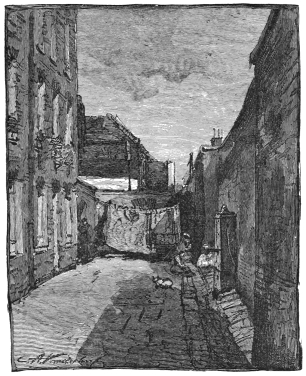
Those were the palmy days of the Court of Chancery. Reform was, as it had been for centuries, in the air, and there, notwithstanding the efforts of Lord Lyndhurst, it seemed likely to remain. Practically nothing had been done to carry into effect the recommendations of the Commission of 1826. At the time of her Majesty’s accession there were nearly a thousand causes waiting to be heard by the Lord Chancellor, the Master of the Rolls, and the Vice-Chancellor of England. It was verily a ‘dead sea of stagnant litigation.’ ‘The load of business now before the Court,’ remarked Sir242 Lancelot Shadwell, ‘is so great that three angels could not get through it.’ Think what this meant! Many of these suits had endured for a quarter of a century, some for half a century; ‘the lawyers,’ to use the current, if incorrect, phrase of the time, ‘tossing the balls to each other.’ One septuagenarian suitor, goaded to madness by the ‘law’s delay,’ had, a few years before, thrust his way into the presence of Lord Eldon, and begged for a decision in a cause waiting for judgment which had been before the Court ever since the Lord Chancellor, then nearly eighty, was a schoolboy. Everyone remembers ‘Miss Flite,’ who expected a judgment—‘on the Day of Judgment,’ and Gridley ‘the man from Shropshire:’ both are true types of the Chancery suitors of fifty, thirty, twenty years ago. It would be wearisome indeed to detail the stages through which a Chancery suit dragged its slow length along. The ‘eternal’ bills, with which it began—and ended—cross bills, answers, interrogatories, replies, rejoinders, injunctions, decrees, references to masters, masters’ reports, exceptions to masters’ reports, were veritably ‘a mountain of costly nonsense.’ And when we remember that the intervals between the various stages were often measured by years—that every death made a bill of review, or, worse still, a supplemental suit, necessary—we can realise the magnitude of the evil. The mere comparison of the ‘bills’ in Chancery with the ‘bills of mortality’ shows that with proper management a suit need never have come to an243 end. There is a story for which the late Mr. Chitty is responsible, that an attorney on the marriage of his son handed him over a Chancery suit with some common law actions. A couple of years afterwards the son asked his father for some more business. ‘Why, I gave you that capital Chancery suit,’ replied his father; ‘what more can you want?’ ‘Yes, sir,’ said the son; ‘but I have wound up the Chancery suit and given my client great satisfaction, and he is in possession of the estate.’ ‘What, you improvident fool!’ rejoined the father indignantly. ‘That suit was in my family for twenty-five years, and would have continued so for so much longer if I had kept it. I shall not encourage such a fellow.’
As in Butler’s time it might still be said:—
And plaintiff Dog, should make an end on’t,
Do stave and tail with writ of error,
Reverse of judgment, and demurrer,
To let them breathe awhile, and then
Cry Whoop! and set them on again.
In fact, like ‘Jarndyce and Jarndyce,’ hundreds of suits struggled on until they expired of inanition, the costs having swallowed up the estate. Such were the inevitable delays fifty years ago, that no one could enter into a Chancery suit with the least prospect of being alive at its termination. It was no small part of the duty of the respectable members of the legal profession to keep their clients out of Chancery. It244 was, perhaps, inevitable that this grievance should have been made the shuttlecock of party, that personalities should have obscured it, that, instead of the system, the men who were almost as much its victims as the suitors should have been blamed. Many successive Lord Chancellors in this way came in for much undeserved obloquy. The plain truth was, they were overworked. Besides their political functions, they had to preside in the Lords over appeals from themselves, the Master of the Rolls, and the Vice-Chancellor; they had some heavy work in bankruptcy and lunacy. The number of days that could be devoted to sitting as a Chancery judge of first instance was, therefore, necessarily small. That this was the keynote of the difficulty was shown by the marked improvement which followed upon the appointment of two additional Vice-Chancellors in 1841. In that year, too, another scandal was done away with by the abolition of the Six Clerks’ office—a characteristic part of the unwieldy machine. The depositaries of the practice of the Court, the Six Clerks and their underlings, the ‘Clerks in Court,’ were responsible for much of the delay which arose. The ‘Six Clerks’ were paid by fees, and their places were worth nearly two thousand a year, for which they did practically nothing, all their duties being discharged by deputy. No one, it was said, ever saw one of the ‘Six Clerks.’ Even in their office they were not known. The Masters in Chancery were, too, in those days almost as important functionaries as the judges themselves.245 Judges’ Chambers were not then in existence, and much of the work which now comes before the judges was disposed of by a master, as well as such business as the investigation of titles, the taking of accounts, and the purely administrative functions of the Court. All these duties they discharged with closed doors and free from any supervision worth talking about. They, too, were paid by fees, their receipts amounting to an immense sum, and it was to them that the expense of proceedings was largely due. The agitation for their abolition, although not crowned with success until fifteen years later, was in full blast fifty years ago.
At law, matters were little better. ‘Justice was strangled in the nets of form.’ The Courts of King’s Bench, Common Pleas, and Exchequer were not only at conflict with Equity, but in a lesser degree with each other. The old fictions by which they ousted each other’s jurisdiction lasted down to 1831, when, by statute, a uniformity of process was established. It seems nowadays to savour of the Middle Ages, that in order to bring an action in the King’s Bench it should have been necessary for the writ to describe the cause of action to be ‘trespass,’ and then to mention the real cause of action in an ac etiam clause. The reason for this absurd formality was that, ‘trespass’ still being an offence of a criminal nature, the defendant was constructively in the custody of the Marshal of the Marshalsea, and therefore within the jurisdiction of the King’s Bench. In the246 same way a civil matter was brought before the Court of Exchequer by the pretence that the plaintiff was a debtor to the King, and was less able to pay by reason of the defendant’s conduct. The statement, although in ninety-nine cases out of a hundred a mere fiction, was not allowed to be contradicted. But the fact that the jurisdiction of the Court of Common Pleas was thus entrenched upon was less serious than it might have been, since in that court the serjeants still had exclusive audience; and, distinguished as were the members of the Order of the Coif, it is easy to understand that the public preferred to have their pick of the Bar.
But a much more serious matter was the block in the Courts. This perennial grievance seems to have then been chiefly due to the shortness of the terms during which alone legal questions could be decided. Nisi prius trials only could be disposed of in the vacations. Points of law or practice, however, cropped up in those days in even the simplest matter, and, since these often had to stand over from term to term, the luckless litigants were fortunate indeed if they had not to wait for years before the question in dispute was finally disposed of. The Common Law Procedure, moreover, literally bristled with technicalities. It was a system of solemn juggling. The real and imaginary causes of action were so mixed up together, the ‘pleadings’ required such a mass of senseless falsehood, that it is perfectly impossible that the parties to the action could have the least apprehension of what they were247 doing. Then no two different causes of action could be joined, but each had to be prosecuted separately through all its stages. None of the parties interested were competent to give evidence. It was not until 1851 that the plaintiff and the defendant, often the only persons who could give any account of the matter, could go into the witness-box. Mistakes in such a state of things were, of course, of common occurrence, and in those days mistakes were fatal. Proceedings by way of appeal were equally hazardous and often impracticable. The Exchequer Chamber could only take cognisance of ‘error’ raised by a ‘bill of exceptions;’ and even at this time the less that is said about that triumph of special pleading the better. The House of Lords could only sit as a Court of Error upon points which had run the gauntlet of the Exchequer Chamber. But perhaps the crowning grievance of all—a grievance felt equally keenly by suitors at law and in equity—arose from the limited powers of the Courts. If there were a remedy at law for any given wrong, for instance, the Court of Chancery could give no relief. In the same way, if it turned out, as it often did, that a plaintiff should have sued in equity instead of proceeding at law, he was promptly nonsuited. Law could not grant an injunction; equity could not construe an Act of Parliament.
There were then, as we have said, no County Courts. The Courts of Requests, of which there were not a hundred altogether, only had jurisdiction for the recovery of debts under 40s. We have already given an illustration248 of the methods of Palace Court, which may serve as a type of these minor courts of record. Indeed, with the exception of the City of London, which was before the times in this respect, there was throughout the kingdom a denial of justice. Those who could not afford to pay the Westminster price had to go without. For in those days all matters intended to be heard at the Assizes were in form prepared for trial at Westminster. The ‘record’ was delivered to the officers of the King’s Bench, Common Pleas, or Exchequer, and the cause was set down for trial at Westminster, nisi prius in the meantime the judges happened to go on circuit into the county in which the cause of action arose,—in which event one of them would take down the record, try the action with a jury of the county, pronounce judgment according to the verdict, and bring back verdict and judgment, to be enrolled in due course at Westminster. In equity, things were even worse. There was, except in the counties palatine of Durham and Lancaster, no local equitable jurisdiction. And it was commonly said, and said with obvious truth, that no sum of less than 500l. was worth suing for or defending in the Court of Chancery.
Divorce was then the ‘luxury of the wealthy.’ An action for the recovery of damages against the co-respondent, and a suit in the Ecclesiastical Courts for a separation ‘from bed and board,’ themselves both tedious and costly, after having been successfully prosecuted, had to be followed by a Divorce Bill, which249 had to pass through all its stages in both Lords and Commons, before a divorce a vinculo matrimonii could be obtained. There is a hoary anecdote which usefully illustrates how this pressed upon the poor. ‘Prisoner at the bar,’ said a judge to a man who had just been convicted of bigamy, his wife having run away with another man, ‘the institutions of your country have provided you with a remedy. You should have sued the adulterer at the Assizes, and recovered a verdict against him, and then taken proceedings by your proctor in the Ecclesiastical Courts. After their successful termination you might have applied to Parliament for a Divorce Act, and your counsel would have been heard at the Bar of the House.’ ‘But, my lord,’ said the disconsolate bigamist, ‘I cannot afford to bring actions or obtain Acts of Parliament; I am only a very poor man.’ ‘Prisoner,’ rejoined the judge, with a twinkle in his eye, ‘it is the glory of the law of England that it knows no distinction between rich and poor.’ Yet it was not until twenty years after the Queen came to the throne that the Court for Divorce and Matrimonial Causes was created.
Probate, too, and all matters and suits relating to testacy and intestacy, were disposed of in the Ecclesiastical Courts,—tribunals were attached to the archbishops, bishops, and archdeacons. The Court of Arches, the supreme Ecclesiastical Court for the Province of Canterbury, the Prerogative Court, where all contentious testamentary causes were tried, as well as250 the Admiralty Courts, were held at Doctors’ Commons. It was a curious mixture of spiritual and legal functions. The judges and officers of the Court were often clergy without any knowledge of the law. They were paid by fees, and, according to the common practice of those days, often discharged their duties by deputy. The advocates who practised before them were, too, anything but ‘learned in the law.’ They wore in Court, if of Oxford, scarlet robes and hoods lined with taffety, and if of Cambridge, white miniver and round black velvet caps. The proctors wore black robes and hoods lined with fur. The procedure was similar to that in vogue in the Common Law Courts, but the nomenclature was entirely different. The substitute for punishment was ‘penance,’ and the consequence of non-submission ‘excommunication,’ which, in addition to spiritual pains, incapacitated the delinquent from bringing any action, and at the end of forty days rendered him liable to imprisonment by the Court of Chancery. The practical result was that both penance and excommunication were indirect methods of extracting money payments. But the whole system was full of abuses, and when, twenty years later, these courts were shorn of all their important functions, it was with the universal concurrence of the public. Until then there were many who shared the opinion of De Foe’s intelligent foreigner, that ‘England was a fine country, but a man called Doctors’ Commons was the devil, for there was no getting out of his clutches, let one’s cause be251 never so good, without paying a great deal of money.’
In bankruptcy, a severity which was simply ferocious prevailed. Traders owing more than 300l., and a little later all traders, could obtain a discharge upon full disclosure and surrender of all their property; but even then the proceedings were protracted to an almost interminable length. The machinery was both cumbrous and costly. Down to 1831 the bankruptcy law in London was administered by Commissioners appointed separately for each case by the Lord Chancellor. In that year a Court of Review was established, with a chief judge and two minor judges; and this to some extent controlled and supervised the proceedings of the Commissioners, now a permanent body. In the country, however, the old procedure prevailed; but the amount of business done was ridiculously small, creditors preferring, as they always probably will do, to write off the bad debts rather than to attempt to recover them by the aid of the bankruptcy law. The system, moreover, bristled with pains and penalties. If a bankrupt, as alleged, did not surrender to his commission within forty-two days of notice; nor make discovery of his estate and effects; nor deliver up his books and papers, he was to be deemed a felon and liable to be transported for life. An adjudication—the first stage in the proceedings—was granted upon the mere affidavit of a creditor, a fiat was issued, the Commissioners held a meeting, and, without hearing the debtor at all, declared252 him a bankrupt. It was thus quite possible for a trader to find himself in the Gazette, and ultimately in prison, although perfectly solvent. He had his remedies, it is true. He could bring an action of trespass or false imprisonment against the Commissioners. He could make things uncomfortable for the assignee, by impeaching the validity of the adjudication. But in any case a delay extending perhaps over many years was inevitable before the matter was decided.
‘Insolvent debtors,’ as those not in trade were distinguished, were in yet worse case. Imprisonment on ‘mesne process’ or, in plain English, on the mere affidavit of a creditor, was the leading principle of this branch of the bankruptcy law; and in prison the debtor remained until he found security or paid. The anomaly which exempted real estate from the payment of debts had been removed in 1825; and, since then, a debtor, actually in prison, could obtain a release from confinement by a surrender of all his real and personal property, although he remained liable for all the unpaid portion of his debts whenever the Court should be satisfied of his ability to pay them. Everything, moreover, depended upon the creditor. He still had an absolute option, after verdict and judgment, of taking the body of the debtor in satisfaction, and the early records of the Court for the Relief of Insolvent Debtors show how weak and impotent were the remedies provided by the Legislature. It was not until twenty years later that the full benefits of bankruptcy were extended to persons who253 had become indebted without fraud or culpable negligence. Enough has already been said of the state of the debtors’ prisons. It is sufficient to add here that in the second year of the Queen nearly four thousand persons were arrested for debt in London alone, and of these nearly four hundred remained permanently in prison.
It was, however, in the administration of the criminal law that the harsh temper of the times reached its zenith. Both as regards procedure and penalties, justice then dealt hardly indeed with persons accused of crimes. In cases of felony, for instance, the prisoner could not, down to 1836, be defended by counsel, and had, therefore, to speak for himself. Now think what this meant! The whole proceedings, from arrest to judgment, were—for the matter of that they still are—highly artificial and technical. The prisoner, often poor and uneducated, was generally unaccustomed to sustained thought. The indictment, which was only read over to him, was often almost interminable in length, with a separate count for each offence, and all the counts mixed and varied in every way that a subtle ingenuity could suggest. Defences depended as largely for their success upon the prisoner taking advantage of some technical flaw (which, in many cases, had to be done before pleading to the indictment), as upon his establishing his innocence upon the facts. But what chance had an illiterate prisoner of detecting even a fundamental error when he was not allowed a copy of the document? In fact, in the words of Mr. Justice Stephen, the most eminent living authority upon254 the history of our criminal law,’ it is scarcely a parody to say that from the earliest times down to our own days the law relating to indictments was much the same as if some small proportion of the prisoners convicted had been allowed to toss-up for their liberty.’
There might, further, be the grossest errors of law, as laid down by the judge to the jury, or of fact upon the evidence, without the prisoner having any remedy. Neither the evidence nor the judge’s directions appeared upon the face of the ‘record,’ and it was only for some irregularity upon the record that a writ of error would lie. A curious practice, however, gradually sprang up, whereby substantial miscarriage of justice was often averted. If a legal point of any difficulty arose in any criminal case heard at the Assizes, or elsewhere, the judge respited the prisoner, or postponed judgment, and reported the matter to the judges. The point reserved was then argued before the judges by counsel, not in court, but at Serjeants’ Inn, of which all the judges were members. If it was decided that the prisoner had been improperly convicted, he received a free pardon. It was this tribunal which was in 1848 erected into the Court for Crown Cases Reserved.
The outcry against capital punishment for minor felonies was still in full blast. The history of this legislation is extremely curious. The value of human life was slowly raised. It had, thanks to the noble efforts of Sir Samuel Romilly, ceased to be a capital offence to steal from a shop to the amount of 5s.;255 but public opinion was still more enlightened than the laws. A humane judge compelled to pass sentence of death upon a woman convicted of stealing from a dwelling-house to the value of 40s., shocked when the wretched victim fainted away, cried out, ‘Good woman, good woman, I don’t mean to hang you. I don’t mean to hang you. Will nobody tell her I don’t mean to hang her?’ Jurors perjured themselves rather than subject anybody to this awful penalty. In 1833 Lord Suffield, in the House of Lords, declared, ‘I hold in my hand a list of 555 perjured verdicts delivered at the Old Bailey in fifteen years, for the single offence of stealing from dwelling-houses; the value stolen being in these cases sworn above the value of 40s. but the verdicts returned being to the value of 39s. only.’ Human life was, then, appraised at 5l. But juries were equal to the occasion. Disregarding the actual amount stolen, they substituted for the old verdict ‘Guilty of stealing to the value of 39s.’—‘Guilty of stealing to the value of 4l. 19s.’ Here is an illustration. A man was convicted at the Old Bailey of robbing his employers to the amount of 1,000l. The evidence was overwhelming. Property worth 200l. was found in his own room; 300l. more was traced to the man to whom he had sold it. The jury found him guilty of stealing to the amount of 4l. 19s. He was again indicted for stealing 25l., and again convicted of stealing less than 5l. In the remaining indictments the prosecutors allowed him to plead guilty to the same extent. In the same way,256 for years prior to 1832, when the death penalty for forgery was abolished—except in the cases of wills and powers of attorney relating to the public funds—juries refused to convict. ‘Prisoner at the bar,’ said Chief Baron Richards to a man acquitted at Carnarvon Assizes for forging Bank of England notes, ‘although you have been acquitted by a jury of your countrymen of the crime of forgery, I am as convinced of your guilt as that two and two make four.’ And the jury privately admitted that they were of the same opinion. In short, the severity of the penal code was a positive danger to the community. Professed thieves made a rich harvest by getting themselves indicted capitally, because they then felt sure of escape. The sentence, moreover, could not be carried out. It became usual in all cases except murder to merely order it to be recorded, which had the effect of a reprieve. Here are some figures. In the three years ended December 31, 1833, there were 896 commitments in London and Middlesex on capital offences and only twelve executions. In 1834, 1835, and 1836 there were 823 commitments and no executions. With the first year of the Queen a more merciful régime was begun. Six offences—forgery in all cases; rioting; rescuing murderers; inciting to mutiny; smuggling with arms; and kidnapping slaves—were declared not capital. But it was not until 1861 that all these blots were finally erased from the Statute Book.
Among other mediæval barbarities, the dissection257 of a murderer’s body was not abolished until 1861, but it was made optional in 1832. Hanging in chains was done away with in 1834. The pillory, a punishment limited to perjury since 1816, was altogether abolished in 1837. The stocks had been generally superseded by the treadmill ten years earlier. Common assaults and many misdemeanours were, on the other hand, much more leniently dealt with in those days than they are in our own. As late as 1847 a case occurred in which a ruffian pounded his wife with his fists so that she remained insensible for three days. Yet, since he used no weapon, he could only be convicted of a common assault and imprisoned without hard labour.
But it was not perhaps an unmixed evil that the powers of the magistrates were then very limited. The ‘Great Unpaid,’ as they were then universally known, were a bye-word. Their proceedings, both at Petty and Quarter Sessions, were disgraced by ignorance, rashness, and class prejudice. Summary jurisdiction was then, fortunately, only in its infancy.
258
CHAPTER XIX.
CONCLUSION.
The consideration of the country as it was would not be complete without some comparison with the country as it is. But I will make this comparison as brief as possible.
In the Church, the old Calvinism is well-nigh dead: even the Low Church of the present day would have seemed, fifty years ago, a kind of veiled Popery. And the Church has grown greater and stronger. She will be greater and stronger still when she enlarges her borders to admit the great bodies of Nonconformists. The old grievances exist no longer: there are no pluralists: there is no non-resident Vicar: the small benefices are improved: Church architecture has revived: the Church services are rendered with loving and jealous care: the old reproaches are no longer hurled at the clergy: fat and lazy shepherds they certainly are not: careless and perfunctory they cannot now be called: even if they are less scholarly, which must be sorrowfully admitted, they are more earnest.
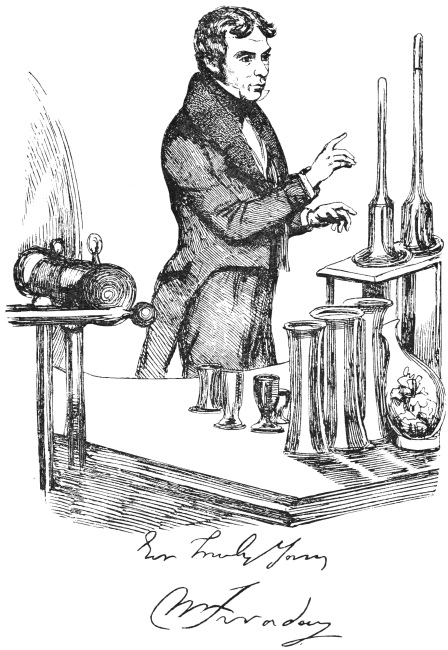
M Faraday
-MICHAEL FARADAY-
259 The revival of the Church services has produced its effect also upon Dissent. Its ministers are more learned and more cultured: their congregations are no longer confined to the humbler trading-class: their leaders belong to society: their writers are among the best littérateurs of the day.
That the science of warfare, by sea and land, has also changed, is a doubtful advantage. Yet wars are short, which is, in itself, an immeasurable gain. The thin red line will be seen no more: nor the splendid great man-o’-war, with a hundred guns and a crew of a thousand men.
The Universities, which, fifty years ago, belonged wholly to the Church, are now thrown open. The Fellowships and Scholarships of the Colleges were then mostly appropriated: they are now free, and the range of studies has been immensely widened.
As for the advance in physical and medical science I am not qualified to speak. But everybody knows that it has been enormous: while, in surgery, the discovery of anæsthetics has removed from life one of its most appalling horrors.
In literature, though new generations of writers have appeared and passed away, we have still with us the two great poets who, fifty years ago, had already begun their work. The Victorian era can boast of such names as Carlyle, Macaulay, Thackeray, Dickens, Tennyson, and Browning, in the first rank of men of letters; those of Darwin, Faraday, and Huxley in260 science. Besides these there has been an immense crowd of men and women who belong to the respectable second rank—to enumerate whom would take pages. Who can say if any of them will live beyond the century, and if any will be remembered in a hundred years?
We have all grown richer, much richer. ‘The poor,’ says Mr. George, ‘have grown poorer.’ That is most distinctly and emphatically untrue. Nothing could be more untrue. The poor—that is to say, the working classes—have grown distinctly better off. They are better housed; they are better fed; they are more cheaply fed; they are better dressed; they have a thousand luxuries to which they were formerly strangers; their children are educated; in most great towns they have free libraries; they have their own clubs; they are at liberty to combine and to hold public meetings; they have the Post Office Savings Bank; and, as for political power, they have all the power there is, because you cannot give any man more than his vote.
Formerly they demanded the Six Points of the Charter, and thought that universal happiness would follow on their acquisition. We have now got most of the Six Points, and we do not care much about the rest. Yet happiness is not by any means universal. Some there are who still think that by more tinkering of the machinery the happiness of the people will be assured. Others there are who consider that political and social wisdom, on the possession of which by our261 rulers the welfare of the people does mainly depend, is outside and independent of the machinery.
Is it nothing, again, that the people have found out their own country? Formerly their lives were spent wholly in the place where they were born; they knew no other. Now the railways carry them cheaply everywhere. In one small town of Lancashire the factory-hands alone spend 30,000l. a year in excursions. The railways, far more than the possession of a vote, had given the people a knowledge of their strength.
The civil service of the country is no longer in the patronage of the Government. There are few spoils left to the victors; there are no sinecures left; except in the Crown Colonies, there are few places to be given away. It is, however, very instructive to remark that, wherever there is a place to be given away, it is invariably, just as of old, and without the least difference of party, whether Conservatives or Liberals are in power, filled up by jobbery, favouritism, and private interest.
You have been told how they have introduced vast reforms in Law. Prisons for debt have been abolished; yet men are still imprisoned for debt. Happily I know little about the administration of Law. Some time ago, however, I was indirectly interested in an action in the High Court of Justice, the conduct and result of which gave me much food for reflection. It was an action for quite a small sum of money. Yet a year and a half elapsed between the commencement of the action and its hearing. The verdict carried costs. The costs262 amounted to three times the sum awarded to the plaintiff. That seems to be a delightful condition of things when you cannot get justice to listen to you for a year and a half, and when it may cost a defendant three times the amount disputed in order to defend what he knows—though his counsel may fail to make a jury understand the case—to be just and right. I humbly submit, as the next reform in Law, that Justice shall have no holidays, so as to expedite actions, and that the verdict shall in no case carry costs, so as to cheapen them.
As for our recreations, we no longer bawl comic songs at taverns, and there is no Vauxhall. On the other hand, the music-hall is certainly no improvement on the tavern; the ‘Colonies’ was perhaps a more respectable Vauxhall; the comic opera may be better than the old extravaganza, but I am not certain that it is; there are the Crystal Palace, the Aquarium, and the Albert Hall also in place of Vauxhall; and there are outdoor amusements unknown fifty years ago—lawn tennis, cycling, rowing, and athletics of all kinds.
There has been a great upward movement of the professional class. New professions have come into existence, and the old professions are more esteemed. It was formerly a poor and beggarly thing to belong to any other than the three learned professions; a barrister would not shake hands with a solicitor, a Nonconformist minister was not met in any society. Artists, writers, journalists, were considered Bohemians.263 The teaching of anything was held in contempt; to become a teacher was a confession of the direst poverty—there were thousands of poor girls eating out their hearts because they had to ‘go out’ as governesses. There were no High Schools for girls; there were no colleges for them.
Slavery has gone. There are now no slaves in Christendom, save in the island of Cuba. Fifty years ago an American went mad if you threw in his teeth the ‘Institution;’ either he defended it with zeal, or else he charged England with having introduced it into the country: in the Southern States it was as much as a man’s life was worth to say a word against it; travellers went South on purpose that they might see slaves put up to auction, mothers parted from their children, and all the stock horrors. Then they came home and wrote about it, and held up their hands and cried, ‘Oh, isn’t it dreadful?’ The negro slavery is gone, and now there is only left the slavery of the women who work. When will that go too? And how can it be swept away?
Public executions gone: pillory gone—the last man pilloried was in the year 1830: no more flogging in the army: the Factory Acts passed: all these are great gains. A greater is the growth of sympathy with all those who suffer, whether wrongfully or by misfortune, or through their own misdoings. This growth of sympathy is due especially to the works of certain novelists belonging to the Victorian age. It is producing264 all kinds of good works—the unselfish devotion of men and women to work among the poor: teaching of every description: philanthropy which does not stop short with the cheque: charity which is organized: measures for prevention: support of hospitals and convalescent homes: the introduction of Art and Music to the working classes.
All these changes seem to be gains. Have there been no losses?
In the nature of things there could not fail to be losses. Some of the old politeness has been lost, though there are still men with the fine manners of our grandfathers: the example of the women who speak, who write, who belong to professions, and are, generally, aggressive, threatens to change the manners of all women: they have already become more assured, more self-reliant, less deferent to men’s opinion—the old deference of men to women was, of course, merely conventional. They no longer dread the necessity of working for themselves; they plunge boldly into the arena prepared to meet with no consideration on the score of sex. If a woman writes a bad book, for instance, no critic hesitates to pronounce it bad because a woman has written it. Whatever work man does woman tries to do. They boldly deny any inferiority of intellect, though no woman has ever produced any work which puts her anywhere near the highest intellectual level. They claim a complete equality which they have hitherto failed to prove.265 Some of them even secretly whisper of natural superiority. They demand their vote. Perhaps, before long, they will be in both Houses, and then man will be speedily relegated to his proper place, which will be that of the executive servant. Oh! happy, happy time!
It is said that we have lost the old leisure of life. As for that, and the supposed drive and hurry of modern life, I do not believe in it. That is to say, the competition is fierce and the struggle hard. But these are no new things. It is a commonplace to talk of the leisure and calm of the eighteenth century—it cannot be too often repeated that in 1837 we were still in that century—I declare that in all my reading about social life in the eighteenth century I have failed to discover that leisure. From Queen Anne to Queen Victoria I have searched for it, and I cannot find it. The leisure of the eighteenth century exists, in fact, only in the brain of painter and poet. Life was hard; labour was incessant, and lasted the whole day long; the shopmen lived in the shop—they even slept in it; the mill people worked all day long and far into the night. If I look about the country, I see in town and village the poor man oppressed and driven by his employer: I see the labourer in a blind revenge setting fire to the ricks; I see the factory hand destroying the machinery; I see everywhere discontent, poverty, privilege, patronage, and profligacy; I hear the shrieks of the wretches flogged at the cart tail, the screams of the266 women flogged at Bridewell. I see the white faces of the poor creatures brought out to be hung up in rows for stealing bread; I see the fighting of the press-gang; I see the soldiers and sailors flogged into sullen obedience; I see hatred of the Church, hatred of the governing class, hatred of the rich, hatred of employers—where, with all these things, is there room for leisure? Leisure means peace, contentment, plenty, wealth, and ease. What peace, what contentment was there in those days?
The decay of the great agricultural interest is a calamity which has been coming upon us slowly, though with a continually accelerated movement. This is the reason, I suppose, why the country regards it with so strange an apathy. It is not only that the landlords are rapidly encountering ruin, that the farmers are losing all their capital, and that labourers are daily turned out of work and driven away to the great towns; the very existence of the country towns is threatened; the investments which depend on rent and estates are threatened; colleges and charities are losing their endowments; worst of all, the rustic, the backbone and support of the country, who has always supplied all our armies with all our soldiers, is fast disappearing from the land. I confess that, if something does not happen to stay the ruin of agriculture in these Islands, I think the end of their greatness will not be far off. Perhaps I think and speak as a fool; but it seems to me that a cheap loaf is dearly bought267 if, among other blessings, it deprives the countryside of its village folk, strong and healthy, and the empire of its stalwart soldiers. As for the House of Lords and the English aristocracy, they cannot survive the day when the farms cannot even support the hands that till the soil, and are left untilled and uncultivated.
There are, to make an end, two changes especially for which we can never be sufficiently thankful. The first is the decay of the old Calvinism; that gone, the chief terror of life is gone too; the chief sting of death is gone; the terrible, awful question which reasoning man could not refrain from asking is gone too.
The second change is the transference of the power to the people. All the power that there is we have given to the people, who are now waiting for a prophet to teach them how best to use it. I trust I am under no illusions; Democracy has many dangers and many evils; but these seem to me not so bad as those others which we have shaken off. One must not expect a Millennium; mistakes will doubtless be committed, and those bad ones. Besides, a change in the machinery does not change the people who run that machinery. There will be the tyranny of the Caucus to be faced and trampled down; we must endure, with all his vices and his demagogic arts, the professional politician whose existence depends on his party; we must expect—and ceaselessly fight against—bribery and wholesale corruption when a class of these professional politicians, poor,268 unscrupulous, and grasping, will be continually, by every evil art, by every lying statement, by every creeping baseness, endeavouring to climb unto power—such there are already among us; we shall have to awaken from apathy, and keep awake, those who are anxious to avoid the arena of politics, yet, by education, position, and natural abilities, are called upon to lead. Yet who, even in the face of the certain dangers, the certain mistakes, of Democracy, shall say that great, terrible, and most disastrous mistakes have not been made by an Aristocracy? There is always hope where there is freedom; let us trust in the common-sense of the nation, and remain steadfast in that trust.
301
VALUABLE AND INTERESTING WORKS
FOR
PUBLIC & PRIVATE LIBRARIES,
Published by HARPER & BROTHERS, New York.
☛ For a full List of Books suitable for Libraries published by Harper & Brothers, see Harper’s Catalogue, which may be had gratuitously on application to the publishers personally, or by letter enclosing Ten Cents in postage stamps.
☛ Harper & Brothers will send their publications by mail, postage prepaid, on receipt of the price.
MACAULAY’S ENGLAND. The History of England from the Accession of James II. By Thomas Babington Macaulay. New Edition, from New Electrotype Plates. 5 vols., in a Box, 8vo, Cloth, with Paper Labels, Uncut Edges and Gilt Tops, $10 00; Sheep, $12 50; Half Calf, $21 25. Sold only in Sets. Cheap Edition, 5 vols., 12mo, Cloth, $2 50.
MACAULAY’S MISCELLANEOUS WORKS. The Miscellaneous Works of Lord Macaulay. From New Electrotype Plates. 5 vols., in a Box, 8vo, Cloth, with Paper Labels, Uncut Edges and Gilt Tops, $10 00; Sheep, $12 50; Half Calf, $21 25. Sold only in Sets.
HUME’S ENGLAND. History of England, from the Invasion of Julius Cæsar to the Abdication of James II., 1688. By David Hume. New and Elegant Library Edition, from New Electrotype Plates. 6 vols., in a Box. 8vo, Cloth, with Paper Labels, Uncut Edges and Gilt Tops, $12 00; Sheep, $15 00; Half Calf, $25 50. Sold only in Sets. Popular Edition, 6 vols., in a Box, 12mo, Cloth, $3 00.
GIBBON’S ROME. The History of the Decline and Fall of the Roman Empire. By Edward Gibbon. With Notes by Dean Milman, M. Guizot, and Dr. William Smith. New Edition, from New Electrotype Plates. 6 vols., 8vo, Cloth, with Paper Labels, Uncut Edges and Gilt Tops, $12 00; Sheep, $15 00; Half Calf, $25 50. Sold only in Sets. Popular Edition, 6 vols., in a Box, 12mo, Cloth, $3 00; Sheep, $6 00.
GOLDSMITH’S WORKS. The Works of Oliver Goldsmith. Edited by Peter Cunningham, F.S.A. From New Electrotype Plates. 4 vols., 8vo, Cloth, Paper Labels, Uncut Edges and Gilt Tops, $8 00; Sheep, $10 00; Half Calf, $17 00.
302 MOTLEY’S LETTERS. The Correspondence of John Lothrop Motley, D.C.L., Author of “The United Netherlands,” “John of Barneveld,” “The Rise of the Dutch Republic,” etc. Edited by George William Curtis. With Portrait. Two Volumes, 8vo, Cloth.
MOTLEY’S DUTCH REPUBLIC. The Rise of the Dutch Republic. A History. By John Lothrop Motley, LL.D., D.C.L. With a Portrait of William of Orange. Cheap Edition, 3 vols., in a Box, 8vo, Cloth, with Paper Labels, Uncut Edges and Gilt Tops, $6 00; Sheep, $7 50; Half Calf, $12 75. Sold only in Sets. Original Library Edition, 3 vols., 8vo, Cloth, $10 50.
MOTLEY’S UNITED NETHERLANDS. History of the United Netherlands: From the Death of William the Silent to the Twelve Years’ Truce—1584–1609. With a full View of the English-Dutch Struggle against Spain, and of the Origin and Destruction of the Spanish Armada. By John Lothrop Motley, LL.D., D.C.L. Portraits. Cheap Edition, 4 vols., in a Box, 8vo, Cloth, with Paper Labels, Uncut Edges and Gilt Tops, $8 00; Sheep, $10 00; Half Calf, $17 00. Sold only in Sets. Original Library Edition, 4 vols., 8vo, Cloth, $14 00.
MOTLEY’S JOHN OF BARNEVELD. The Life and Death of John of Barneveld, Advocate of Holland. With a View of the Primary Causes and Movements of the “Thirty Years’ War.” By John Lothrop Motley, LL.D., D.C.L. Illustrated. Cheap Edition, 2 vols., in a Box, 8vo, Cloth, with Paper Labels, Uncut Edges and Gilt Tops, $4 00; Sheep, $5 00; Half Calf, $8 50. Sold only in Sets. Original Library Edition, 2 vols., 8vo, Cloth, $7 00.
HILDRETH’S UNITED STATES. History of the United States. First Series: From the Discovery of the Continent to the Organization of the Government under the Federal Constitution. Second Series: From the Adoption of the Federal Constitution to the End of the Sixteenth Congress. By Richard Hildreth. Popular Edition, 6 vols., in a Box, 8vo, Cloth, with Paper Labels, Uncut Edges and Gilt Tops, $12 00; Sheep, $15 00; Half Calf, $25 50. Sold only in Sets.
TREVELYAN’S LIFE OF MACAULAY. The Life and Letters of Lord Macaulay. By his Nephew, G. Otto Trevelyan, M.P. With Portrait on Steel. 2 vols., 8vo, Cloth, Uncut Edges and Gilt Tops, $5 00; Sheep, $6 00; Half Calf, $9 50. Popular Edition, 2 vols. in one, 12mo, Cloth, $1 75.
TREVELYAN’S LIFE OF FOX. The Early History of Charles James Fox. By George Otto Trevelyan. 8vo, Cloth, Uncut Edges and Gilt Tops, $2 50; Half Calf, $4 75.
303 WRITINGS AND SPEECHES OF SAMUEL J. TILDEN. Edited by John Bigelow. 2 vols., 8vo, Cloth, Gilt Tops and Uncut Edges, $6 00 per set.
GENERAL DIX’S MEMOIRS. Memoirs of John Adams Dix. Compiled by his Son, Morgan Dix. With Five Steel-plate Portraits. 2 vols, 8vo, Cloth, Gilt Tops and Uncut Edges, $5 00.
HUNT’S MEMOIR OF MRS. LIVINGSTON. A Memoir of Mrs. Edward Livingston. With Letters hitherto Unpublished. By Louise Livingston Hunt. 12mo, Cloth, $1 25.
GEORGE ELIOT’S LIFE. George Eliot’s Life, Related in her Letters and Journals. Arranged and Edited by her Husband, J. W. Cross. Portraits and Illustrations. In Three Volumes. 12mo, Cloth, $3 75. New Edition, with Fresh Matter. (Uniform with “Harper’s Library Edition” of George Eliot’s Works.)
PEARS’S FALL OF CONSTANTINOPLE. The Fall of Constantinople. Being the Story of the Fourth Crusade. By Edwin Pears, LL.B. 8vo, Cloth, $2 50.
RANKE’S UNIVERSAL HISTORY. The Oldest Historical Group of Nations and the Greeks. By Leopold von Ranke. Edited by G. W. Prothero, Fellow and Tutor of King’s College, Cambridge. Vol. I. 8vo, Cloth, $2 50.
LIFE AND TIMES OF THE REV. SYDNEY SMITH. A Sketch of the Life and Times of the Rev. Sydney Smith. Based on Family Documents and the Recollections of Personal Friends. By Stuart J. Reid. With Steel-plate Portrait and Illustrations. 8vo, Cloth, $3 00.
STORMONTH’S ENGLISH DICTIONARY. A Dictionary of the English Language, Pronouncing, Etymological, and Explanatory: embracing Scientific and other Terms, Numerous Familiar Terms, and a Copious Selection of Old English Words. By the Rev. James Stormonth. The Pronunciation Revised by the Rev. P. H. Phelp, M.A. Imperial 8vo, Cloth, $6 00; Half Roan, $7 00; Full Sheep, $7 50. (New Edition.)
PARTON’S CARICATURE. Caricature and Other Comic Art, in All Times and Many Lands. By James Parton. 203 Illustrations. 8vo, Cloth, Uncut Edges and Gilt Tops, $5 00; Half Calf, $7 25.
DU CHAILLU’S LAND OF THE MIDNIGHT SUN. Summer and Winter Journeys in Sweden, Norway, Lapland, and Northern Finland. By Paul B. Du Chaillu. Illustrated. 2 vols., 8vo, Cloth, $7 50; Half Calf, $12 00.
304 LOSSING’S CYCLOPÆDIA OF UNITED STATES HISTORY. From the Aboriginal Period to 1876. By B. J. Lossing, LL.D. Illustrated by 2 Steel Portraits and over 1000 Engravings. 2 vols., Royal 8vo, Cloth, $10 00; Sheep, $12 00; Half Morocco, $15 00. (Sold by Subscription only.)
LOSSING’S FIELD-BOOK OF THE REVOLUTION. Pictorial Field-Book of the Revolution; or, Illustrations by Pen and Pencil of the History, Biography, Scenery, Relics, and Traditions of the War for Independence. By Benson J. Lossing. 2 vols., 8vo, Cloth, $14 00; Sheep or Roan, $15 00; Half Calf, $18 00.
LOSSING’S FIELD-BOOK OF THE WAR OF 1812. Pictorial Field-Book of the War of 1812; or, Illustrations by Pen and Pencil of the History, Biography, Scenery, Relics, and Traditions of the last War for American Independence. By Benson J. Lossing. With several hundred Engravings. 1088 pages, 8vo, Cloth, $7 00; Sheep or Roan, $8 50; Half Calf, $10 00.
MÜLLER’S POLITICAL HISTORY OF RECENT TIMES (1816–1875). With Special Reference to Germany. By William Müller. Translated, with an Appendix covering the Period from 1876 to 1881, by the Rev. John P. Peters, Ph.D. 12mo, Cloth, $3 00.
STANLEY’S THROUGH THE DARK CONTINENT. Through the Dark Continent; or, The Sources of the Nile, Around the Great Lakes of Equatorial Africa, and Down the Livingstone River to the Atlantic Ocean. 149 Illustrations and 10 Maps. By H. M. Stanley. 2 vols., 8vo, Cloth, $10 00; Sheep, $12 00; Half Morocco, $15 00.
STANLEY’S CONGO. The Congo and the Founding of its Free State, a Story of Work and Exploration. With over One Hundred Full-page and smaller Illustrations, Two Large Maps, and several smaller ones. By H. M. Stanley. 2 vols., 8vo, Cloth, $10 00; Sheep, $12 00; Half Morocco, $15 00.
GREEN’S ENGLISH PEOPLE. History of the English People. By John Richard Green, M.A. With Maps. 4 vols., 8vo, Cloth, $10 00; Sheep, $12 00; Half Calf, $19 00.
GREEN’S MAKING OF ENGLAND. The Making of England. By John Richard Green. With Maps. 8vo, Cloth, $2 50; Sheep, $3 00; Half Calf, $3 75.
GREEN’S CONQUEST OF ENGLAND. The Conquest of England. By John Richard Green. With Maps. 8vo, Cloth, $2 50; Sheep, $3 00; Half Calf, $3 75.
305 ENGLISH MEN OF LETTERS. Edited by John Morley.
The following volumes are now ready. Others will follow:
Johnson. By L. Stephen.—Gibbon. By J. C. Morison.—Scott. By R. H. Hutton.—Shelley. By J. A. Symonds.—Goldsmith. By W. Black.—Hume. By Professor Huxley.—Defoe. By W. Minto.—Burns. By Principal Shairp.—Spenser. By R. W. Church.—Thackeray. By A. Trollope.—Burke. By J. Morley.—Milton. By M. Pattison.—Southey. By E. Dowden.—Chaucer. By A. W. Ward.—Bunyan. By J. A. Froude.—Cowper. By G. Smith.—Pope. By L. Stephen.—Byron. By J. Nichols.—Locke. By T. Fowler.—Wordsworth. By F. W. H. Myers.—Hawthorne. By Henry James, Jr.—Dryden. By G. Saintsbury.—Landor. By S. Colvin.—De Quincey. By D. Masson.—Lamb. By A. Ainger.—Bentley. By R. C. Jebb.—Dickens. By A. W. Ward.—Gray. By E. W. Gosse.—Swift. By L. Stephen.—Sterne. By H. D. Traill.—Macaulay. By J. C. Morison.—Fielding. By A. Dobson.—Sheridan. By Mrs. Oliphant.—Addison. By W. J. Courthope.—Bacon. By R. W. Church.—Coleridge. By H. D. Traill.—Sir Philip Sidney. By J. A. Symonds.—Keats. By Sidney Colvin. 12mo, Cloth, 75 cents per volume.
Popular Edition, 36 volumes in 12, $12 00.
REBER’S HISTORY OF ANCIENT ART. History of Ancient Art.
By Dr. Franz von Reber. Revised by the Author. Translated and Augmented by Joseph Thacher Clarke. With 310 Illustrations and a Glossary of Technical Terms. 8vo, Cloth, $3 50.
REBER’S MEDIÆVAL ART. History of Mediæval Art. By Dr. Franz von Reber. Translated and Augmented by Joseph Thacher Clarke. With 422 Illustrations, and a Glossary of Technical Terms. 8vo, Cloth, $5 00.
NEWCOMB’S ASTRONOMY. Popular Astronomy. By Simon Newcomb, LL.D. With 112 Engravings, and 5 Maps of the Stars. 8vo, Cloth, $2 50; School Edition, 12mo, Cloth, $1 30.
DAVIS’S INTERNATIONAL LAW. Outlines of International Law, with an Account of its Origin and Sources, and of its Historical Development. By Geo. B. Davis, U.S.A., Assistant Professor of Law at the United States Military Academy. Crown 8vo, Cloth, $2 00.
CESNOLA’S CYPRUS. Cyprus: its Ancient Cities, Tombs, and Temples. A Narrative of Researches and Excavations during Ten Years’ Residence in that Island. By L. P. di Cesnola. With Portrait, Maps, and 400 Illustrations. 8vo, Cloth, Extra, Uncut Edges and Gilt Tops, $7 50; Half Calf, $10 00.
TENNYSON’S COMPLETE POEMS. The Complete Poetical Works of Alfred, Lord Tennyson. With an Introductory Sketch by Anne Thackeray Ritchie. With Portraits and Illustrations. 8vo, Extra Cloth, Bevelled, Gilt Edges, $2 50.
LEA’S HISTORY OF THE INQUISITION. History of the Inquisition of the Middle Ages. By Henry Charles Lea. Three Volumes. 8vo, Cloth, Uncut Edges and Gilt Tops, $3 00 per volume.
306 GROTE’S HISTORY OF GREECE. 12 vols., 12mo, Cloth, $18 00; Sheep, $22 80; Half Calf, $39 00.
FLAMMARION’S ATMOSPHERE. Translated from the French of Camille Flammarion. With 10 Chromo-Lithographs and 86 Wood-cuts. 8vo, Cloth, $6 00; Half Calf, $8 25.
BAKER’S ISMAÏLIA: a Narrative of the Expedition to Central Africa for the Suppression of the Slave-trade, organized by Ismaïl, Khedive of Egypt. By Sir Samuel W. Baker. With Maps, Portraits, and Illustrations. 8vo, Cloth, $5 00; Half Calf, $7 25.
LIVINGSTONE’S ZAMBESI. Narrative of an Expedition to the Zambesi and its Tributaries, and of the Discovery of the Lakes Shirwa and Nyassa, 1858 to 1864. By David and Charles Livingstone. Ill’d. 8vo, Cloth, $5 00; Sheep, $5 50; Half Calf, $7 25.
LIVINGSTONE’S LAST JOURNALS. The Last Journals of David Livingstone, in Central Africa, from 1865 to his Death. Continued by a Narrative of his Last Moments, obtained from his Faithful Servants Chuma and Susi. By Horace Waller. With Portrait, Maps, and Illustrations. 8vo, Cloth, $5 00; Sheep, $6 00.
CHARNAY’S ANCIENT CITIES OF THE NEW WORLD. The Ancient Cities of the New World: Being Voyages and Explorations in Mexico and Central America, from 1857 to 1882. By Désiré Charnay. Translated by J. Gonino and Helen S. Conant. Illustrations and Map. Royal 8vo, Ornamental Cloth, Uncut Edges, Gilt Tops, $6 00.
“THE FRIENDLY EDITION” of Shakespeare’s Works. Edited by W. J. Rolfe. In 20 vols. Illustrated. 16mo, Gilt Tops and Uncut Edges, Sheets, $27 00; Cloth, $30 00; Half Calf, $60 00 per Set.
GIESELER’S ECCLESIASTICAL HISTORY. A Text-Book of Church History. By Dr. John C. L. Gieseler. Translated from the Fourth Revised German Edition. Revised and Edited by Rev. Henry B. Smith, D.D. Vols. I., II., III., and IV., 8vo, Cloth, $2 25 each; Vol. V., 8vo, Cloth, $3 00. Complete Sets, 5 vols., Sheep, $14 50; Half Calf, $23 25.
CURTIS’S LIFE OF BUCHANAN. Life of James Buchanan, Fifteenth President of the United States. By George Ticknor Curtis. With Two Steel Plate Portraits. 2 vols., 8vo, Cloth, Uncut Edges and Gilt Tops, $6 00.
COLERIDGE’S WORKS. The Complete Works of Samuel Taylor Coleridge. With an Introductory Essay upon his Philosophical and Theological Opinions. Edited by Professor W. G. T. Shedd. With Steel Portrait, and an Index. 7 vols., 12mo, Cloth, $2 00 per volume; $12 00 per set; Half Calf, $24 25.
Transcriber’s Notes
Punctuation and spelling were made consistent when a predominant preference was found in this book; otherwise they were not changed.
Simple typographical errors were corrected; occasional unbalanced quotation marks retained.
Ambiguous hyphens at the ends of lines were retained; occurrences of inconsistent hyphenation have not been changed.
Illustrations have been moved to appear between paragraphs. In versions of this eBook that support links, the List of Illustrations links to the correct images, not necessarily to the listed page numbers.
The printed captions of illustrations usually are shown here in upper-case, as they were in the original book. Some illustrations bore signatures, rather than printed captions; those are shown here in lower-case, followed by the full names, taken from the List of Illustrations.
Many captions in the original book did not exactly match the words in the List of Illustrations; those differences have been retained here.
The symbols in the lists of books at the beginning and end of this eBooks are right-pointing hands.